
Getty Images/iStockphoto


Check out this year's Best in Travel winners
Egypt welcomes you with its mighty Nile and magnificent monuments, the beguiling desert and lush delta, and with its long past and welcoming, story-loving people.
Best Time to Visit
Best places to visit, attractions, must-see attractions.

Amun Temple Enclosure
Amun-Ra was the local god of Karnak (Luxor) and during the New Kingdom, when the princes of Thebes ruled Egypt, he became the preeminent state god, with a…

St Catherine's Monastery
This ancient monastery traces its founding to about AD 330, when Byzantine empress Helena had a small chapel and a fortified refuge for local hermits…

Temple of Horus
Southern Nile Valley
This Ptolemaic temple, built between 237 and 57 BC, is one of the best-preserved ancient monuments in Egypt. Preserved by desert sand, which filled the…

Temple of Seti I
Northern Nile Valley
The first structure you’ll see at Abydos is the Great Temple of Seti I, which, after a certain amount of restoration work, is one of the most complete,…

Temple of Isis
Built to honour the goddess Isis, this was the last temple built in the classical Egyptian style. Construction began around 690 BC, and it was one of the…

White Desert National Park
Western Desert
Upon first glimpse of the 300-sq-km national park of the White Desert, you’ll feel like Alice through the looking-glass. About 20km northeast of Farafra,…

Valley of the Kings
The west bank of Luxor had been the site of royal burials since around 2100 BC, but it was the pharaohs of the New Kingdom period (1550–1069 BC) who chose…

Pyramids of Giza
The last remaining wonder of the ancient world; for nearly 4000 years, the extraordinary shape, impeccable geometry and sheer bulk of the Giza Pyramids…
Planning Tools
Expert guidance to help you plan your trip.
Best Things to Do
You might visit Egypt for the history, the adventure, the beaches or even just the pyramids - when it comes to things to do, you are spoiled for choice.
Things to Know
Plan the perfect trip to Egypt with these essential tips on etiquette, health and safety.
Transportation
Transport in Egypt is fairly efficient and reasonably priced. Here are the best ways to get around Egypt, from overnight trains to cruise boats on the Nile.
Visa Requirements
Before you set off on your Egypt adventure, check this handy guide to find out all the Egyptian visa information you need for your trip.
Money and Costs
Don't think a small budget will restrict your Egyptian adventure. With our top tips, you can explore the whole country without breaking the bank.
Traveling with Kids
Egypt can be a challenging destination to visit, but the country is a treasure trove of activities for families. Here's how to visit Egypt with kids.
Best Road Trips
Experience the best of Egypt with these spectacular road trip routes.
Plan with a local
Experience the real Egypt
Let a local expert craft your dream trip.
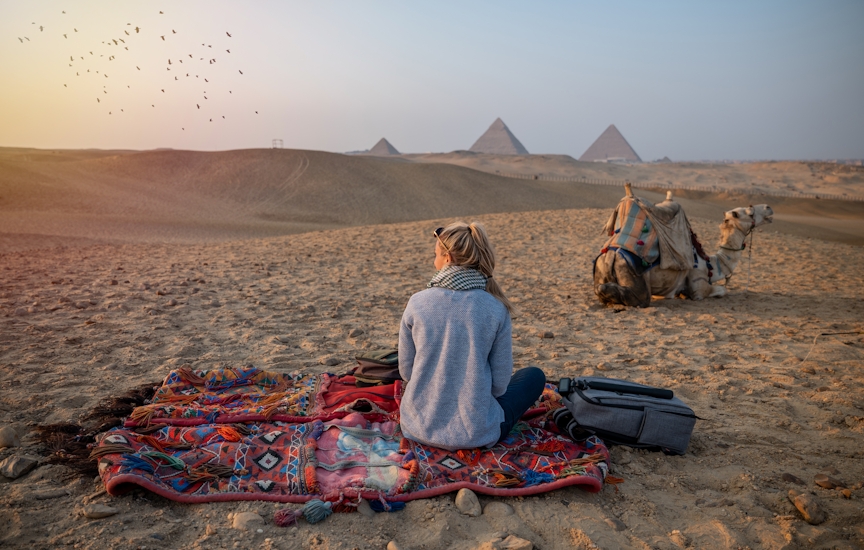
Latest stories from Egypt
Filter by interest:
- All Interests
- Adventure Travel
- Art & Culture
- Beaches, Coasts & Islands
- Food & Drink

Jun 26, 2024 • 6 min read
A pair of writers go head to head comparing these two popular African destinations.

Mar 12, 2024 • 4 min read

Jan 26, 2024 • 6 min read

Oct 3, 2023 • 6 min read

Sep 4, 2023 • 5 min read

Sep 3, 2023 • 4 min read

Aug 23, 2023 • 7 min read

Aug 18, 2023 • 9 min read

Aug 18, 2023 • 8 min read

Aug 17, 2023 • 5 min read
in partnership with getyourguide
Book popular activities in Egypt
Egypt and beyond.
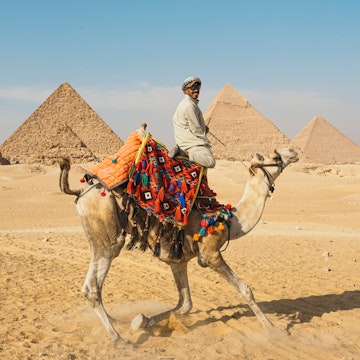
A Snob’s Guide to Egypt
You can’t fully escape the crowds descending on Egypt now. But, as always, there are strategies…
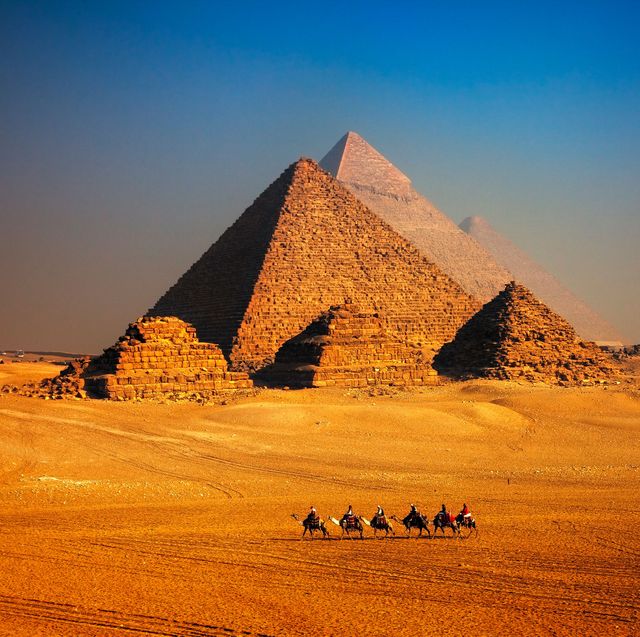
Every item on this page was chosen by a Town & Country editor. We may earn commission on some of the items you choose to buy.
Egypt gives us what no other country can: the chance to see up close, in situ, the astonishing creative impulses of the world’s most long-lived ancient civilization. If it’s your first time, you’ll want to concentrate on the historic must-sees. They are scattered the length of Egypt, mostly in the narrow band along the banks of the Nile. The classic itinerary is Cairo–Aswan–Nile cruise–Luxor, then back to Cairo. (The order of Aswan and Luxor can be switched, depending on which cruise you take.)
But Egypt has not been standing still. There are new museums. There is a fever of excavations, with new sites opening to visitors and others restored. And there are off-the-beaten-path places to explore, including the newly accessible Sahara oases (the desert makes up about 95 percent of Egypt’s territory and is another world). All that, however, requires that you extend your trip beyond the usual 10 to 12 days—or, unimaginably, skip one of the classic stops. Want a full day at the Old Kingdom necropolis of Sakkara, to see the new finds? You’ll need a third day in Cairo. Ditto if you’re a rider and want to spend an afternoon galloping on an Arabian horse around Sakkara and Giza.
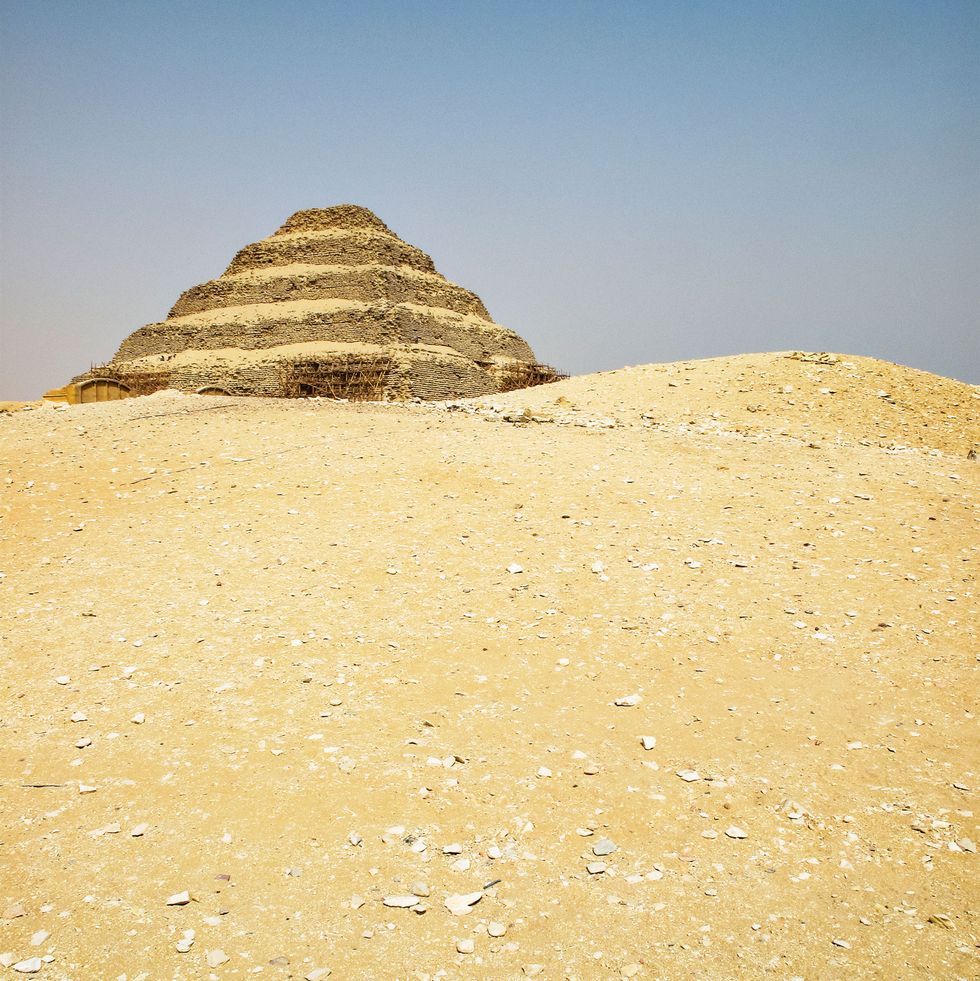
You need at least two days in Cairo, more if you can. To stay, I recommend the Four Seasons Nile Plaza , the Ritz-Carlton , and, if you don't mind a slightly more four-star place, the Marriott on Cairo's central, formerly chi-chi Zamalek Island, where I always stay; I like its convenient location, its Suez-Canal-related history, and most of all its large back garden and buzzy outdoor cafe, where tout le Caire still seems to congregate over hookahs and mighty strong G&Ts.
Devote the first day to pharaonic Egypt: the pyramids of Giza and the Sphinx in the morning, followed by the Memphis Museum and a walkabout of the vast funerary complex of Sakkara . On day two you’re in medieval Islamic Cairo: two mosques (the renowned Al-Azhar and the magnificently severe Ibn Tulun ), the Citadel (begun by Saladin to defend Cairo from the Crusaders), and an end-of-day meander (with shopping) around the Khan el-Khalili market —part tourist trap, part real thing. A third day can be some combination of the below:
Two museums: The National Museum of Egyptian Civilization , where the mummies now reside, and the Grand Egyptian Museum in Giza, a.k.a., GEM (which is not officially open but is partially accessible, for a range of high fees—and worth it).
A full day at Sakkara: See the pyramid of Unas and its exceptionally fine carvings of funerary texts; the mind-bending Serapeum , where mummies of the sacred Apis bulls were buried in giant sarcophagi; and the king’s burial chamber tunnels beneath Djoser’s newly stabilized Step Pyramid ; you can now gaze straight down at his sarcophagus. End the day at the rarely visited three main pyramids of Dahshur (the Red, Black, and Bent), seven miles south of Sakkara. This is what you want in Egypt: to see something no one else is seeing, alone with ancientness.
For $3,000 you can spend time alone in Sakkara's colorful, newly discovered tomb of Wahtye, a high-ranking priest from the 25th century BC—who possibly stole the tomb from his brother.
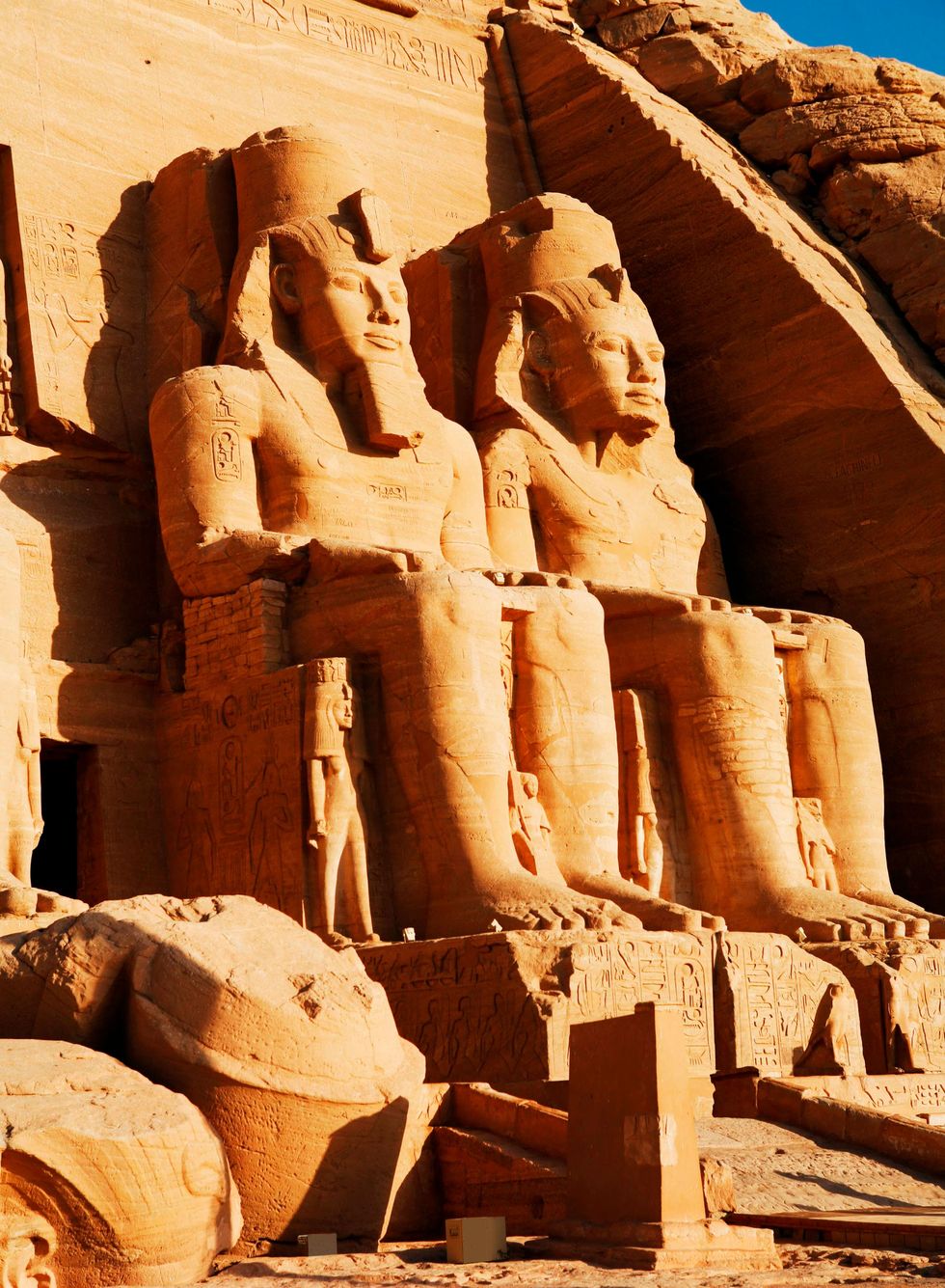
An early morning flight from Cairo to Aswan and a short connecting flight to Abu Simbel, near Egypt’s border with Sudan, puts you face to face with as great a play for immortality (and ancient geopolitical power) as the pyramids of Giza. Contemplate Ramses II’s two staggering temples , then board the short early afternoon flight back to Aswan and the luxuries of Sofitel Legend Old Cataract Hotel , with its ghosts of Winston Churchill, Agatha Christie, and many others—and the most perfect view of the Nile.
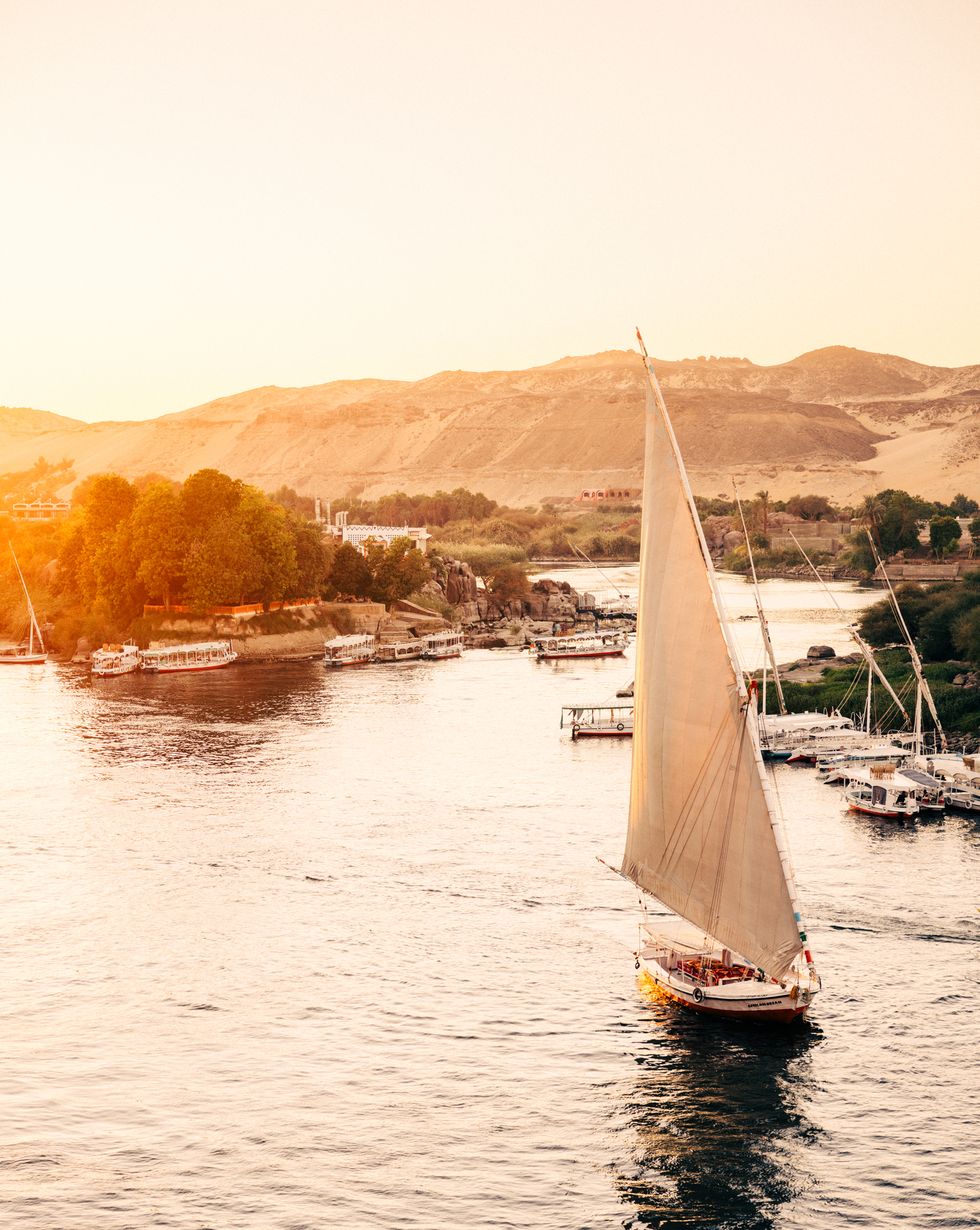
Aswan was always a frontier town, the last bastion of pharaonic religion, centered on the powerful cult of Isis worship in the temple of Philae . See the temple (it’s a tourist magnet, so go at dawn if possible), but even early travelers came here less for the antiquities than for the city’s tranquil “Nice of the Nile” beauty. Your next two days should include, between bouts of lounging, St. Simeon’s Monastery , in the desert on the opposite bank (the ancient Christian wreck has an oddly powerful aura); the elegant, eye-opening pink granite Nubian Museum (which presents the history and culture of Egypt’s ancient southern neighbor); Elephantine Island , a nexus of caravan routes from across Africa where you’ll arrive by felucca (an Aswan must); and a walk atop the Unfinished Obelisk , a fascinating ancient failure. Reputedly commissioned by the female pharaoh Hatshepsut, it would have been the world’s largest by far, but it developed fatal cracks. Its bottom end is still attached to the rock bed, workers’ marks still visible.
Foodie trove in the Aswan market: This small, manageable bazaar, which has rebounded in recent years, has the freshest, most varied spices procured directly from all over Africa. Stock up.
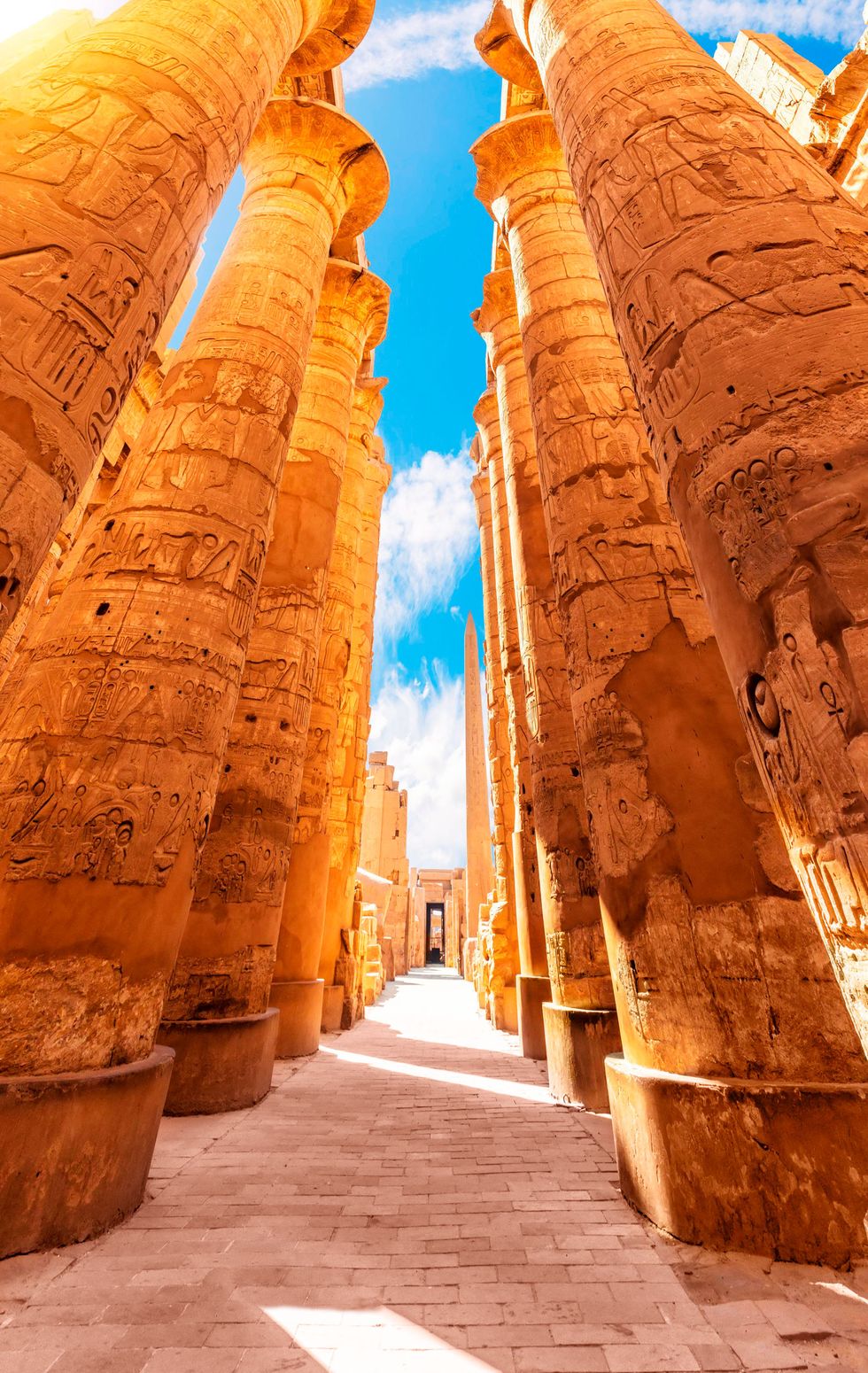
This is the mother lode of Egyptian antiquities, the country’s ceremonial capital for millennia. Stay at the grand but tatty Sofitel Winter Palace , overlooking the Nile on the east bank, or the boutiquey, just renovated Al Moudira , amid farmland on the west bank. Musts on the east bank, site of the ceremonial temples: the Karnak complex , the largest place of worship in the ancient world, and Luxor Temple . On the west bank, site of mortuary temples and tombs, get advance special entrance tickets (fewer visitors) for a handful of the best pharaonic tombs in the valleys of the kings and queens —especially those of Ramses VI, Nefertari, and Seti I. See the stunning Deir el-Bahri , mortuary temple of Hatshepsut, at dawn, as crowds truly interfere with sightlines. The Tombs of the Nobles offer a glimpse of how nonroyals lived and died. The temples of Medinet Habu and the Ramesseum are much less crowded; the shattered remains of Ramses II’s colossal statue in the latter are a reminder of how man’s best-laid plans can come to naught.
Avenue of the Sphinxes: It took 70 years to restore this ancient road, originally lined with 1,057 sphinxes and ram-headed statues, and you can now walk its entire 1.7 miles, from Karnak to Luxor Temple.
Temple of Khnum, Esna: The long-overlooked temple of the ram-headed god, 35 miles south of Luxor, where most dahabiya cruises (see below) start, got a pharaonic face-lift; its columns now burst with their original colors.
Luxor Temple is already resplendently lit at night. Now imagine a private dinner amid the forest of giant columns in its Hypostyle Hall. Jim Berkeley of DAI can arrange it for you.
Nile Cruise
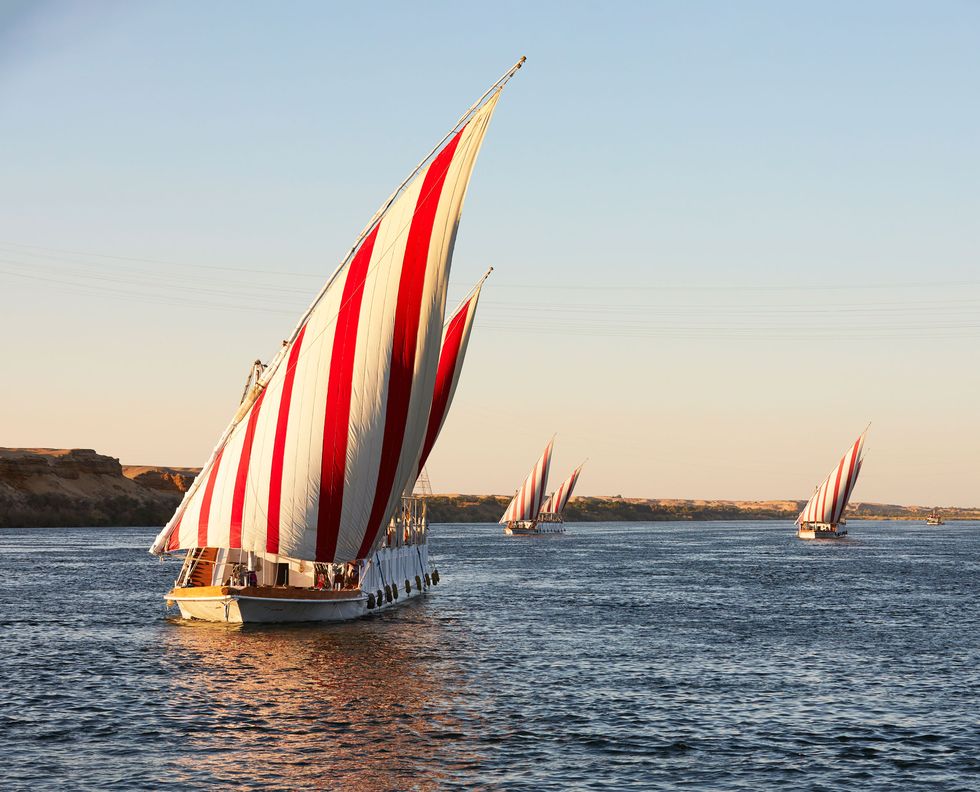
Do not, under any circumstances, be talked out of a Nile cruise in Upper Egypt. I resisted for a long time, but once I succumbed I found out what I’d been missing. You can cruise on a largish ship, with amenities like a plunge pool and spacious cabins (best choices would be Oberoi’s Zahra and Philae , or Egyptian-owned Historia ). Or, my preference: a traditional, flat-bottomed, two-masted dahabiya, with only eight to 12 cabins. Small cabins and bathrooms don’t matter, because you’re luxuriating on deck most of the time anyway, Agatha Christie–style, your hair blowing in the wind, a G&T in your hand, watching eternal Egypt pass by.
Consider one from chic Nour el Nil , which operates seven dahabiyas (the new Roman is the roomiest), or Zekrayaat , operated by Nile Dahabiya , or one from Lazuli Voyages . If you want total privacy, do a charter-only dahabiya, such as Zein Chateau , operated by A&K offshoot Sanctuary . Most commonly dahabiyas leave from Esna, south of Luxor, and sail four days upstream to Aswan. You can also board in Aswan and sail downstream, north to Esna—a shorter, 3-day voyage because of Nile currents. (How much time you spend on the boat will also determine in which order you visit Aswan and Luxor.) All ships stop at the temples of Kom Ombo and of Horus , at Edfu. But what only a dahabiya can offer is the ability to nose up to a pretty stretch of Nile shoreline and set up an impromptu picnic, after which you can walk to a nearby village where there are absolutely no other tourists.
Kazazian Cruises : It’s the striking new charter-only entrant in the Nile dahabiya competition. Their first boat can sleep 18, has a plunge pool on deck (as few others do), and has sleek all-white interiors.
Western Desert
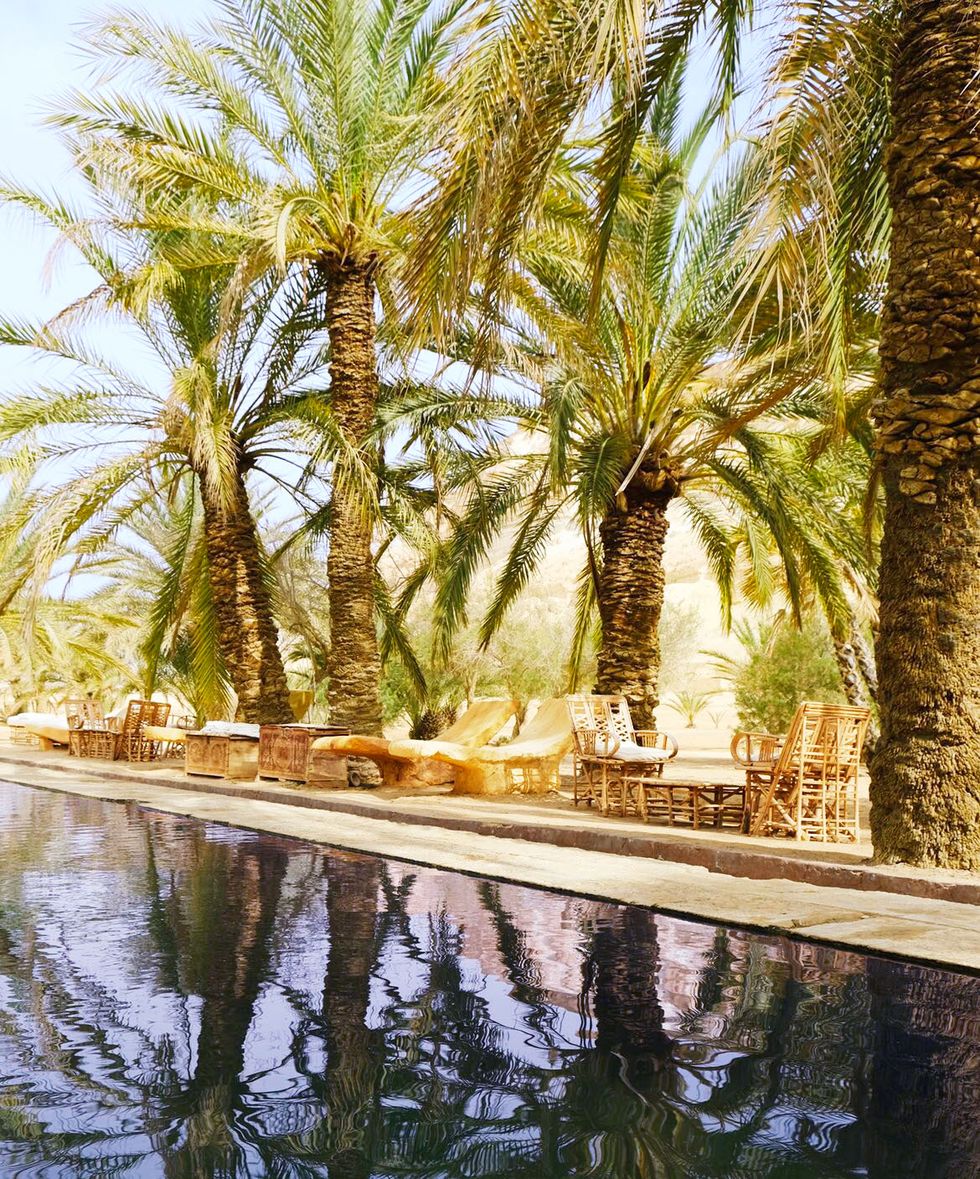
Time in the desert gives any trip to Egypt an extra dimension. A vast region from west of the Nile to the Libyan border was closed for five years, because of instability in Libya, and only reopened recently. Fayoum oasis is just 69 miles southwest of Cairo, but it feels a world away: lush vegetation, waterfalls, a blue lake, rich birdlife (it’s on the migratory route between Africa and Europe). Fifty miles farther out is the Valley of Whales : gigantic fossils of whales and sharks from 40 million to 50 million years ago, when the Sahara was beneath the sea. (You will likely be alone.) Stay at the charming 16-suite Lazib Inn Resort & Spa , owned by a former VP of Four Seasons hotels.
Siwa oasis and its 40-room Adrère Amellal ecolodge , the inspired project of Cairo environmentalist and aesthete Mounir Neamatalla, require a 90-minute flight from Cairo or an eight-hour desert drive (which, believe it or not, has its charms). It is Egypt’s remotest oasis, a tropical garden of date palms, olive trees, and donkey carts, more than 200 freshwater springs, some hot, with the Great Sand Sea all around—the mammoth dunes of every Arabian fantasy, into which you can ride or drive. Visit the ruins of the temple of Amun , where Alexander the Great consulted the oracle in 331 BC after assuming the mantle of pharaoh, and the Mountain of the Dead , the startlingly beautiful graves of Siwa’s citizens going back to Greco-Roman times. Or just breathe, bathe, swim, and consume Adrère Amellal’s splendid organic meals—served at night by the light of hundreds of candles.
There is not more glamorous takeover than Adrere Amellal. You'll need a solar charger for your phone, but you can say you've done the "Sahara roller coaster" and slept where King Charles did.

Klara Glowczewska is the Executive Travel Editor of Town & Country , covering topics related to travel specifically (places, itineraries, hotels, trends) and broadly (conservation, culture, adventure), and was previously the Editor in Chief of Conde Nast Traveler magazine.
@media(min-width: 40.625rem){.css-11dm4xz:before{margin:0.625rem 0.625rem 0;width:3.5rem;-webkit-filter:invert(17%) sepia(72%) saturate(710%) hue-rotate(181deg) brightness(97%) contrast(97%);filter:invert(17%) sepia(72%) saturate(710%) hue-rotate(181deg) brightness(97%) contrast(97%);height:1.5rem;content:'';display:inline-block;-webkit-transform:scale(-1, 1);-moz-transform:scale(-1, 1);-ms-transform:scale(-1, 1);transform:scale(-1, 1);background-repeat:no-repeat;}.loaded .css-11dm4xz:before{background-image:url(/_assets/design-tokens/latest/townandcountrymag/static/images/diamond-header-design-element.80fb60e.svg);}}@media(min-width: 64rem){.css-11dm4xz:before{margin:0 0.625rem 0.25rem;}} In the Magazine @media(min-width: 40.625rem){.css-pog6h6:before{margin:0.625rem 0.625rem 0;width:3.5rem;-webkit-filter:invert(17%) sepia(72%) saturate(710%) hue-rotate(181deg) brightness(97%) contrast(97%);filter:invert(17%) sepia(72%) saturate(710%) hue-rotate(181deg) brightness(97%) contrast(97%);height:1.5rem;content:'';display:inline-block;background-repeat:no-repeat;}.loaded .css-pog6h6:before{background-image:url(/_assets/design-tokens/latest/townandcountrymag/static/images/diamond-header-design-element.80fb60e.svg);}}@media(min-width: 64rem){.css-pog6h6:before{margin:0 0.625rem 0.25rem;}}

How Beekeeping Became the New Flex

Can Moisturizer Make You Happy?

You Don't Know Jack!

How Lisa Fine Entertains at Home

Can An Art Advisor Save Your Marriage?

The T&C Jewelry Wardrobe: The New Pearl Rules

Into the Woods: Troubled-Teen Industry, Exposed

Tiffany's New Blue Book Collection Is Flying High

How Bulgari Turned a Gas Pipe Into a Jewelry Icon

The Perfect Uptown-Meets-Downtown Dinner Party

Sarah Arison Rises at MoMA
Travel Guide Egypt
Book your individual trip , stress-free with local travel experts
Select Month
- roughguides.com
- Travel guide
- Itineraries
- Local Experts
- Travel Advice
- Accommodation
Plan your tailor-made trip with a local expert
Book securely with money-back guarantee
Travel stress-free with local assistance and 24/7 support
Absolutely loved it, the service was seamless from the first pickup from the airport to the return drop-off. The local guides were excellent, knowledgeable...
Egypt is the oldest tourist destination on earth. Ancient Greeks and Romans started the trend, coming to goggle at the cyclopean scale of the Pyramids and the Colossi of Thebes. During colonial times, Napoleon and the British looted Egypt’s treasures to fill their national museums, sparking off a trickle of Grand Tourists that eventually became a flood of travellers, taken on Nile cruises and Egyptological lectures by the enterprising Thomas Cook.
Where to go in Egypt
Travel ideas for egypt, created by local experts.

The Best of Egypt
Explore the history and culture of Egypt and its ancient rulers on this trip throughout the country. Start and end in Cairo and make your way down to Luxor, Aswan and Abu Simbel. Instead of domestic flights, you will hop on luxurious sleeper trains for your journey.

Cairo & a luxurious Dahabieh sailing cruise
Explore Egypt at a leisurely pace on board a dahabieh, a traditional sailing ship. In Cairo, visit the Egyptian Museum of Antiquities, and in Giza, the pyramids; cruise to world-renowned sites alongside lesser-known treasures, such as Luxor’s tombs, el Kab and Gebel Silsileh’s Temple of Horemheb.

A Nile Cruise in Egypt
Experience Cairo with the pyramids of Giza and the Egyptian museum before flying to Luxor to board your Nile cruise. Highlights include Karnak temple, Valley of Kings, Hatshepsut temple and an optional visit to Abu Simbel. Spend your last night in fascinating Cairo.

Five Star Egypt
A tour through the ancient wonders of Giza, Cairo, Luxor, and Aswan. Start and end your trip in beautiful Cairo, exploring the surroundings before heading down to Aswan: you will spend four nights on a luxurious Nile cruise ship, discovering ancient sites such as Abu Simbel.

An introduction to Egypt
Marvel at the pyramids in Giza, explore busy Cairo, sleep on a luxurious sleeper train and explore more temples close to Luxor. This itinerary is fast-paced, with several nights in Cairo at the beginning and end, enabling you to see many fascinating sights in Egypt.
Today, the most popular places to visit are not only the monuments of the Nile Valley and the souks, mosques and madrassas of Islamic Cairo, but also fantastic coral reefs and tropical fish, dunes, ancient fortresses, monasteries and prehistoric rock art.
The land itself is a freak of nature, its lifeblood the River Nile. From the Sudanese border to the shores of the Mediterranean, the Nile Valley and its Delta are flanked by arid wastes, the latter as empty as the former are teeming with people. This stark duality between fertility and desolation is fundamental to Egypt’s character and has shaped its development since prehistoric times, imparting continuity to diverse cultures and peoples over seven millennia. It is a sense of permanence and timelessness that is buttressed by religion , which pervades every aspect of life. Although the pagan cults of ancient Egypt are as moribund as its legacy of mummies and temples, their ancient fertility rites and processions of boats still hold their place in the celebrations of Islam and Christianity.
The result is a multi-layered culture , which seems to accord equal respect to ancient and modern. The peasants of the Nile and the Bedouin tribes of the desert live much as their ancestors did a thousand years ago. Other communities include the Nubians of the far south, and the Coptic Christians, who trace their ancestry back to pharaonic times. What unites them is a love of their homeland, extended family ties, dignity, warmth and hospitality towards strangers. Though most visitors are drawn to Egypt by its monuments, the enduring memory is likely to be of its people and their way of life.
Egypt’s capital, Cairo, is a seething megalopolis whose chief sightseeing appeal lies in its bazaars and medieval mosques, though there is scarcely less fascination in its juxtapositions of medieval and modern life, the city’s fortified gates, villas and skyscrapers interwoven by flyovers whose traffic may be halted by donkey carts. The immensity and diversity of this “Mother of Cities” is as staggering as anything you’ll encounter in Egypt. Just outside Cairo are the first of the pyramids that range across the desert to the edge of the Fayoum, among them the unsurpassable trio at Giza, the vast necropolis of Saqqara and the pyramids at Dahshur. Besides all this, there are superb museums devoted to Ancient, Coptic and Islamic Egypt, and enough entertainment to occupy weeks of your time.
However, the principal tourist lure remains, as ever, the Nile Valley, with its ancient monuments and timeless river vistas – Nile cruises on a luxury vessel or a felucca sailboat being a great way to combine the two. The town of Luxor is synonymous with the magnificent temples of Karnak and the Theban Necropolis, which includes the Valley of the Kings where Tutankhamun and other pharaohs were buried. Aswan, Egypt’s southernmost city, has the loveliest setting on the Nile and a languorous ambience. From here, you can visit the island Philae temple of Isis and the rock-hewn colossi at Abu Simbel, or embark on a cruise to other temples around Lake Nasser. Other sites not to be missed are Edfu and Kom Ombo, between Luxor and Aswan, and Abydos and Dendara, north of Luxor.
Besides monuments, Egypt abounds in natural wonders. Edged by coral reefs teeming with tropical fish, the Sinai Peninsula offers superb diving and snorkelling, and palm-fringed beaches where women can swim unmolested. Resorts along the Gulf of Aqaba are varied enough to suit everyone, whether you’re into the upmarket hotels of Sharm el-Sheikh, nearby Na’ama Bay or Taba further north, or cheap, simple living at Dahab and Nuweiba. From there it’s easy to visit St Catherine’s Monastery and Mount Sinai (where Moses received the Ten Commandments) in the mountainous interior. With more time, cash and stamina, you can also embark on jeep safaris or camel treks to remote oases and spectacular wadis.
Egypt’s Red Sea Coast has more reefs further offshore, with snorkelling and diving traditionally centred around Hurghada, while barely touched island reefs from Port Safaga down to Marsa Alam beckon serious diving enthusiasts. Inland, the mountainous Eastern Desert harbours the Coptic monasteries of St Paul and St Anthony, Roman quarries, and a host of pharaonic and prehistoric rock art, seen by few apart from the nomadic Bedouin.
While the Eastern Desert is still barely touched by tourism, the Western Desert Oases have been on the tourist trail for forty years and nowadays host safaris into the wilderness. Siwa, out towards the Libyan border, has a unique culture and history, limpid pools and bags of charm. Travellers can also follow the “Great Desert Circuit” (starting from Cairo, Luxor or Assyut) through the four “inner” oases – though Bahariya and Farafra hold the most appeal, with the lovely White Desert between them, the larger oases of Dakhla and Kharga also have their rewards once you escape their modernized “capitals”. And for those into serious desert expeditions, there’s the challenge of exploring the Great Sand Sea or the remote wadis of the Gilf Kebir, whose prehistoric rock art featured in the film The English Patient. In contrast to these deep-desert locations are the quasi-oases of the Fayoum and Wadi Natrun, featuring the fossil-strewn Valley of the Whales, diverse ancient ruins and Coptic monasteries.
On the Mediterranean, Egypt’s second city, Alexandria, boasts a string of beaches to which Cairenes flock in summer, and excellent seafood restaurants. Despite being founded by Alexander the Great and lost to the Romans by Cleopatra, the city today betrays little of its ancient glory; however, its magnificent new library, featuring statues raised from the sunken remains of Cleopatra’s Palace, and the Lighthouse of Pharos (which divers can explore) are restoring an air of majesty. Famous, too, for its decadence during colonial times, Alexandria still allows romantics to indulge in a nostalgic exploration of the city immortalized in Durrell’s Alexandria Quartet, while further along the Mediterranean coast is the World War II battlefield of El-Alamein. For divers, the waters off Alexandria offer an array of sunken cities and wartime wrecks to explore.
The Nile Delta, east of Alexandria, musters few archeological monuments given its major role in ancient Egyptian history, and is largely overlooked by tourists. However, for those interested in Egyptian culture, the Delta hosts colourful religious festivals at Tanta, Zagazig and other towns. Further east lies the Canal Zone, dominated by the Suez Canal and its three cities: Suez is grim, but a vital transport nexus between Cairo, Sinai and the Red Sea Coast; Port Said and Ismailiya are pleasant, albeit sleepy places, where you can get a feel of “real Egypt” without tripping over other tourists.
Top image © Marcelo Alex/Shutterstock
Discover more places in Egypt

- The Western Desert Oases
- The Nile Valley, Egypt
- Abu Simbel Temples, Egypt
- Saqqara, Egypt
- Mount Sinai, Egypt
- Abydos, Egypt
- Siwa Oasis, Egypt
- Dahab, Egypt
Egypt is one of the best diving destinations in the world. The Red Sea and the Gulf of Aqaba are rich in sea life and home to a wonderful array of dive sites, with plenty of options for both novices and experts alike: remarkably preserved World War II wrecks, coral reefs filled with dolphins, rainbow-coloured anemone gardens, and shallow bays visited by turtles are just a few of the sites you can explore. The Sinai and Red Sea Coast chapters have detailed information on dive sites and recommended dive companies, as well as tips on safety and environmental issues.
The Red Sea’s stable climate, shallow tides and exceptionally high salinity provide perfect conditions for unusually brilliant corals and sponges – a revelation if you have previously dived in such places as Hawaii or the Caribbean, whose reefs will forever after seem dull by comparison. Created by generations of miniscule polyps depositing their limestone exoskeletons on the remains of their ancestors, coral reefs can grow by 4–5cm a year. Beside hard corals such as brain and fire coral, which have a rigid outer skeleton, the Red Sea hosts an abundance of soft corals , including whip coral and sea fans. Because most types of coral need a moderate amount of warm sunlight to flourish, the most spectacular formations are found within 30m of the surface.
Most Red Sea reefs are of the fringing type, with a shallow lagoon just offshore, whose warm water and rubble-strewn bottom attracts starfish and sea slugs. Clams and sea urchins hide in crevices, and schools of damselfish and butterflyfish flit about. Its seaward boundary is the reef flat, whose crest is usually a barren, rough-surfaced shelf, while deeper areas are rich in flora and fauna. Beyond is a coral-encrusted slope, leading to a drop-off like the edge of a cliff. Flatter areas may be dotted with coral pillars or knolls. Lower down, the coral is sparser, and you may find sandy terraces overgrown with seagrass, sustaining sea horses and pipefish. Beyond the drop-off lies open water.
Some of the Red Sea’s most colourful and endearing species are easy to spot in the shallows , where the sunlight is brightest. Among the commonest are beak-mouthed parrotfish and exotic-looking pennantfish, whose long dorsal fins end in filaments.
Wherever stinging anemones cling to the reef, you’ll see clownfish (or anemone fish). Angelfish are usually found close to the coral, while clouds of gold and vermillion anthias gather around coral heads and fans. Slopes and fore reefs are the habitat of snappers, goatfish and wrasses (the largest of these, the Napoleon Wrasse, can dwarf a person).
In deeper waters you may see sharks, including whitetip reef sharks, grey reef sharks and (occasionally) scalloped hammerheads. Spotted reef stingrays are often seen on the sandy bottom of the sea. Turtles are among the most thrilling species to encounter underwater; the Red Sea has several species, including green turtles and hawksbill turtles. Dolphin encounters are possible too, and those lucky enough to come across a pod of bottlenose or spinner dolphins on a dive are likely to count it among the highlights of their trip.
• The Arab Republic of Egypt covers 1,001,450 square kilometres, but 96.4 percent of that is desert . Only the Nile Valley, its Delta and some oases are fertile.
• Egypt’s population of 83.7 million is over twice that of the next most populous Arab country (Algeria) and a quarter of the population of the Arab world. 71 percent of Egyptians are literate. Average life expectancy is 73 years.
• Islam is the biggest religion, and some ninety percent of Egyptians are Muslim; most of the rest are Coptic Christians , with a small number of other Christians, and a tiny but ancient Jewish community.
• All Egyptians speak Arabic , but there are other Egyptian languages too: Nubian , related to the Nilotic languages of East Africa, is spoken around Aswan and Lake Nasser; Siwi , a Berber language like those of Morocco and Algeria, is spoken in Siwa Oasis; and Coptic , which is derived from ancient Egyptian, is used in church services, but not otherwise.
• Since the monarchy was ousted in 1952, Egypt has been a republic , ruled by a succession of military strongmen up until the 2011 revolution that overthrew Hosni Mubarak. Elections in 2012 resulted in an Islamist government under President Mohammed Morsi . The Muslim Brotherhood’s Freedom and Justice Party is the largest in parliament, followed by the Salafist Al-Nour party, the liberal Wafd party and Egyptian Bloc.
• Tourism has long been Egypt’s biggest money-earner, followed by tolls on the Suez Canal, and exports of oil, petroleum products, natural gas, cotton and textiles. Over forty percent of the population lives below the poverty line, and the economy would collapse without $2 billion a year in financial and food-aid from the US.
Travel advice for Egypt
From travel safety to visa requirements, discover the best tips for traveling to Egypt
- Eating and drinking in Egypt
- Getting around Egypt: Transportation Tips
- Travel Tips Egypt for planning and on the go
- Culture and Etiquette in Egypt
- How to get to Egypt
- Shopping tips for Egypt
- Sports and Outdoor activities in Egypt
- Travelling with children in Egypt
- Best time to visit Egypt
The Rough Guides to Egypt and related travel guides
In-depth, easy-to-use travel guides filled with expert advice.
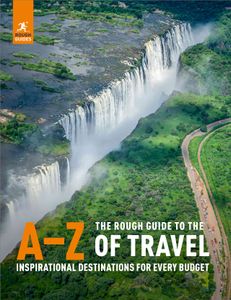
Find even more inspiration here

Planning your own trip? Prepare for your trip
Use Rough Guides' trusted partners for great rates
written by Rough Guides Editors
updated 26.05.2021
Ready to travel and discover Egypt?
Get support from our local experts for stress-free planning & worry-free travels.
- Travel advice
- Where to stay
- Search Please fill out this field.
- Newsletters
- Destinations
- Africa & Middle East
- South Africa
- United Arab Emirates

Say “Egypt” and most people think of pharaohs, mummies, and age-old pyramids. The country isn’t just temples and tombs, though. Immerse yourself in the noise and color of urban bedlam, then come up for air on a lonely desert dune or upon the palm-fringed banks of the Nile. Haggle with vendors in a maze-like souk, then sit quietly in a tranquil mosque or Coptic church and observe centuries-old rituals that still resonate in modern life. Go beyond the monumental glory of the pharaohs and you’ll discover a true Egyptian experience.
- Copy Link copied
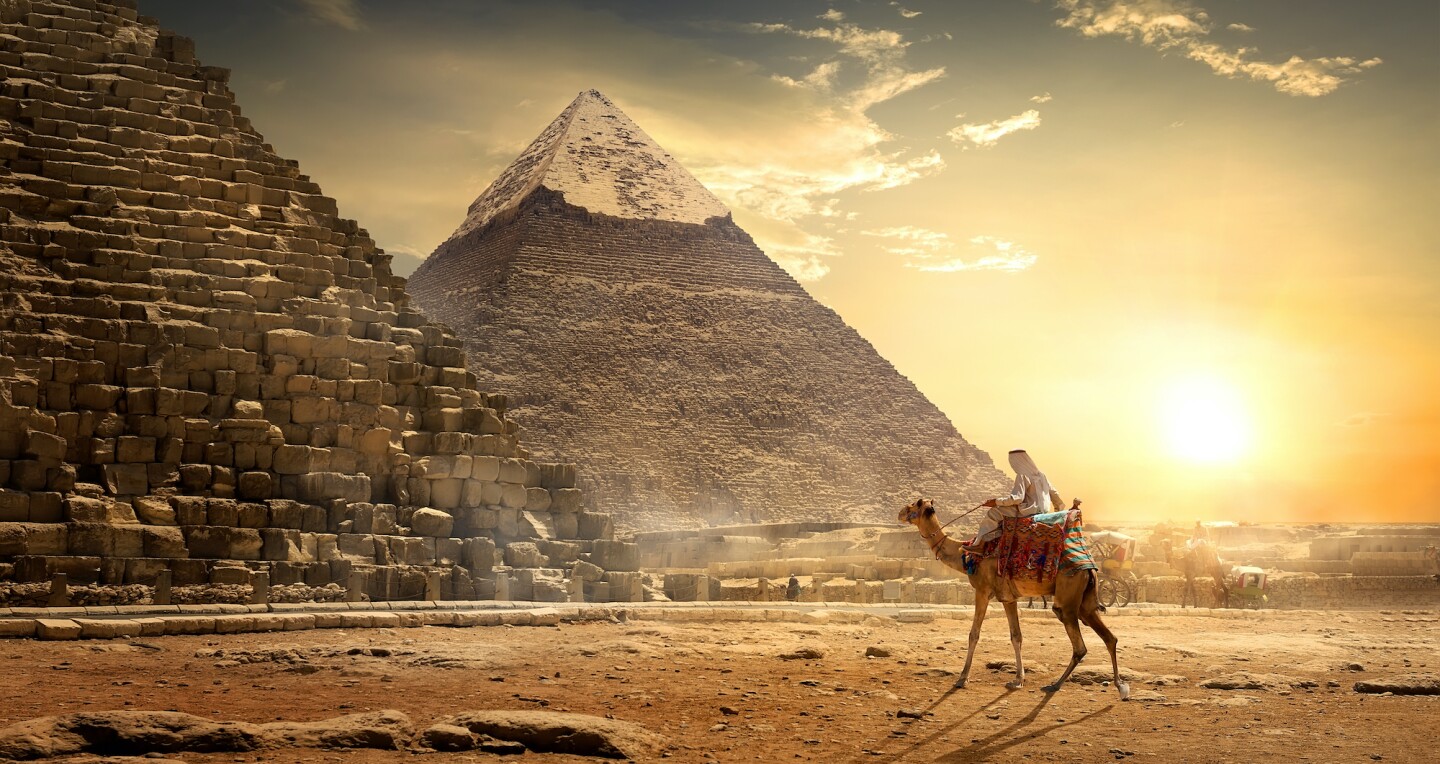
Photo by givaga/Shutterstock
Can’t miss things to do in Egypt
Egypt’s ancient rulers competed to outdo each other by scattering a cache of lofty temples across the land. The Pyramids of Giza, Luxor’s Karnak and Valley of the Kings, and Ramses II’s grandiose pat-on-the-back at Abu Simbel are the highlights of the pharaohs’ marvelous architectural achievements, but factor time during your visit to explore smaller relics such as the Kom Ombo and Philae temples as well. When temple fatigue sets in, replenish energy levels by discovering Egypt’s natural wonders. More ancient than any pyramid, this nation’s jagged mountain peaks, sinuous Nile, and empty desert expanses are superlative reminders that manmade treasures are only a part of Egypt’s bountiful beauty.
Food and drink to try in Egypt
Egyptian cuisine is infused with fresh and hearty flavors, with influences from the North Africa, the Middle East, and the Mediterranean. This is comfort food at its best: non-fussy, wholesome dishes where seasonal produce plays the starring role. Restaurant menus generally feature kebabs (grilled meat on a skewer) with simple meze-style plates of crispy salads and dips. Heavier specialties include mahshi (stuffed vegetables) and fatteh (chicken or beef with rice and bread, all immersed in a garlic sauce), and the more adventurous hamam (pigeon) and molokhia (a glutinous mallow-leaf stew).
Culture in Egypt
Egyptians are a boisterous, pragmatic people with a sharp sense of humor used to shrug off the hardships of life. Traditional culture and religion still play a prominent role in society, and close-knit family ties are at the heart of daily life. Although conservative in values, you’ll find Egyptians anything but insular. This is a nation that adores having fun and any excuse is used for a celebration. Not known for being stand-offish, and rightly proud of their history, a booming ahlan wa sahlan (“Hello and welcome!”) followed by invitations for tea and a chat are extended to all visitors. Accept those on-the-spot offers and you’ll experience warm and effervescent Egyptian hospitality at its best.
Put your haggling hat on and get ready for an adventure. The souk is the quintessential Egyptian shopping experience where you can unearth everything from tawdry plastic pyramids to antiques. The wares at these markets have no fixed prices; the final sum depends upon your haggling skills. But keep in mind: Haggling for your treasure isn’t supposed to be about beating the shopkeeper down to the lowest price possible. It should be light-hearted and fun. For the best souk action in Egypt, head to Cairo’s Khan al-Khalili, whose winding lanes are crammed with textiles, copper workers, perfume, and a bewildering array of kitsch souvenirs. If you’re searching for antiques, look for bargains in Alexandria’s Souk Attareen.
Practical Information
Egypt’s summer (Jun–Aug) is stifling and best avoided unless you enjoy searing temperatures. Spring (Mar–May) and fall (Sep–Nov) are more manageable heat-wise, but winter (Dec–Feb), with its pleasantly warm, sunny weather, is when most choose to visit. Visas are required; most nationalities can buy one upon arrival. Most international flights land at Cairo (CAI) but there are also services direct to Alexandria’s Burg al-Arab (HBE), Luxor (LXR), and Sharm al-Sheikh (SSH). The bus network is extensive. The train is useful for journeys between Cairo and Upper Egypt (Luxor, Aswan), and to Alexandria. The language is Egyptian Arabic; the currency is the Egyptian pound, pronounced “guinea.” Electricity is 220 volts with European 2-pin sockets.
Guide Editor
Jessica Lee is a travel writer who specialises in the Middle East, Turkey, and North Africa. She likes deserts and mountains, and is on a constant quest to find the perfect hummus.

14 Days best of Egypt Itinerary – The Ultimate self-travel guide
- Published on November 26, 2022
- Last updated on November 15, 2023
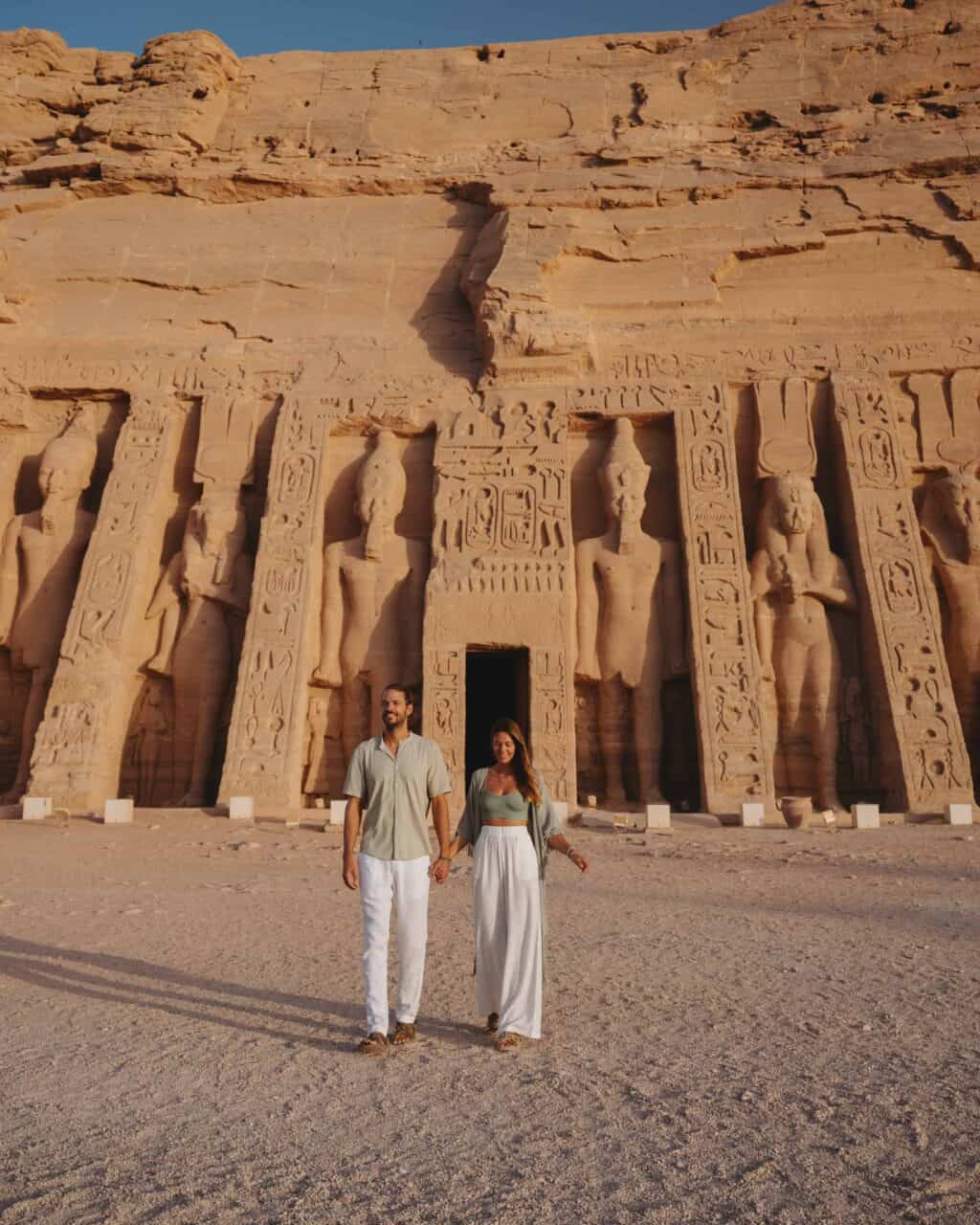
In this blog post, we share our exact 14 Days Egypt Itinerary as we know many of you are also interested in traveling around Egypt independently. Most tourists visit Egypt on a guided tour, and self-traveling is not very popular yet, but it’s doable and safe. In this ultimate self-travel Guide, you will find all the information you need to plan your trip.
Best time to visit Egypt
The best time to visit Egypt is during winter time when the temperatures are the lowest. These months, from November to March, are also the busiest time for tourism. The summer months should be avoided as the temperatures are too high, making exploring very exhausting. Egypt is a desert country, and the highest temperatures can easily reach up to 50 degrees Celsius. We traveled around Egypt in October, shortly before the high season started, and we had a good experience. Anywhere between October and April is the best time to go.
Visa for entering Egypt
To enter Egypt as a foreigner, you need a Visa. You can either get your Visa on arrival or online. We recommend getting your Visa online here to avoid dealing with paperwork when you arrive. The single entry Visa we got was 25 USD per person and was valid for 30 days.
How to travel around Egypt independently
Rental car in egypt.
Most visitors travel around Egypt with a guided tour, and those usually get around by bus or on a Nile River Cruise. But it’s possible to rent a car and travel around Egypt independently. An international driving Licence is recommended. We rented our car via Discover Cars and had our pick up and drop off at Luxor Airport.
Driving in Egypt
The streets in Egypt are usually good, paved roads, especially when driving from one city to another. Drives can be very long (3-5 hours), so you should not mind driving long distances. Even if we are used to long drives, they felt extra long in Egypt as highways lead through the desert and views barely change. Important to know is that there are many police checkpoints that you will cross while you drive around the country. Don’t worry; the people are always amiable, and they were usually positively surprised that we drove ourselves. They will ask you for your name and country, and phone number. We think it’s for safety reasons as the next checkpoint usually knew already that we were coming.
14 Days best of Egypt Itinerary
We are very happy with our trip, and that’s why we share our exact 14 Days Egypt Itinerary with you here.
Day 1 – 3 Cairo
Our first stop on our Egypt Itinerary was Cairo, the capital city. Cairo is a huge city; you could spend more time exploring here. We mainly came for the pyramids, so the time was enough for us. We did not drive ourselves in Cairo as the traffic there was crazy. We recommend using Uber to get around here.
The highlight of Cairo are the famous Pyramids. Here is our detailed guide on visiting the great Pyramids of Giza without a tour . Other top things to do in Cairo are the Khan El-Khalili souk (market) or the Egyptian Museum.
Where we stayed in Cairo
We stayed at the Nine Pyramids View Hotel , close to the Pyramids of Giza. If that’s your priority like it was for us, we highly recommend staying here as they even have an amazing rooftop to watch the sunset over the pyramids.
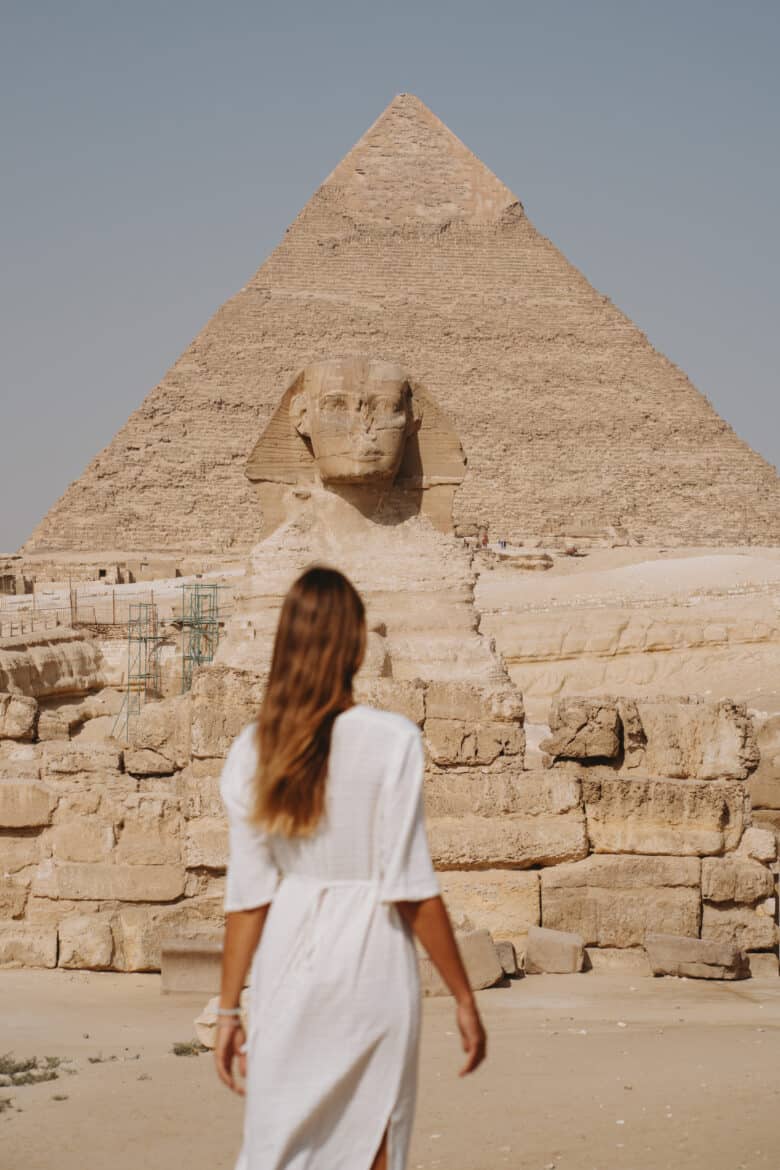
Day 3 – 6 Luxor
Luxor is a must-visit on every Egypt Itinerary. This ancient city is like an open-air museum. Luxor is divided into two parts by the Nile River. East Bank is the city’s bustling center, and West Bank is the quieter and greener part. As the drive from one side to the other takes around an hour, we decided to first stay on the East Bank and then on the West Bank to be close to the temples we wanted to explore.
Our highlights in Luxor are Karnak Temple, the Valley of the Kings, and Hatshepsut Temple. Click here for our detailed Self-travel Guide for Luxor with the 7 best things to do.
Where we stayed in Luxor
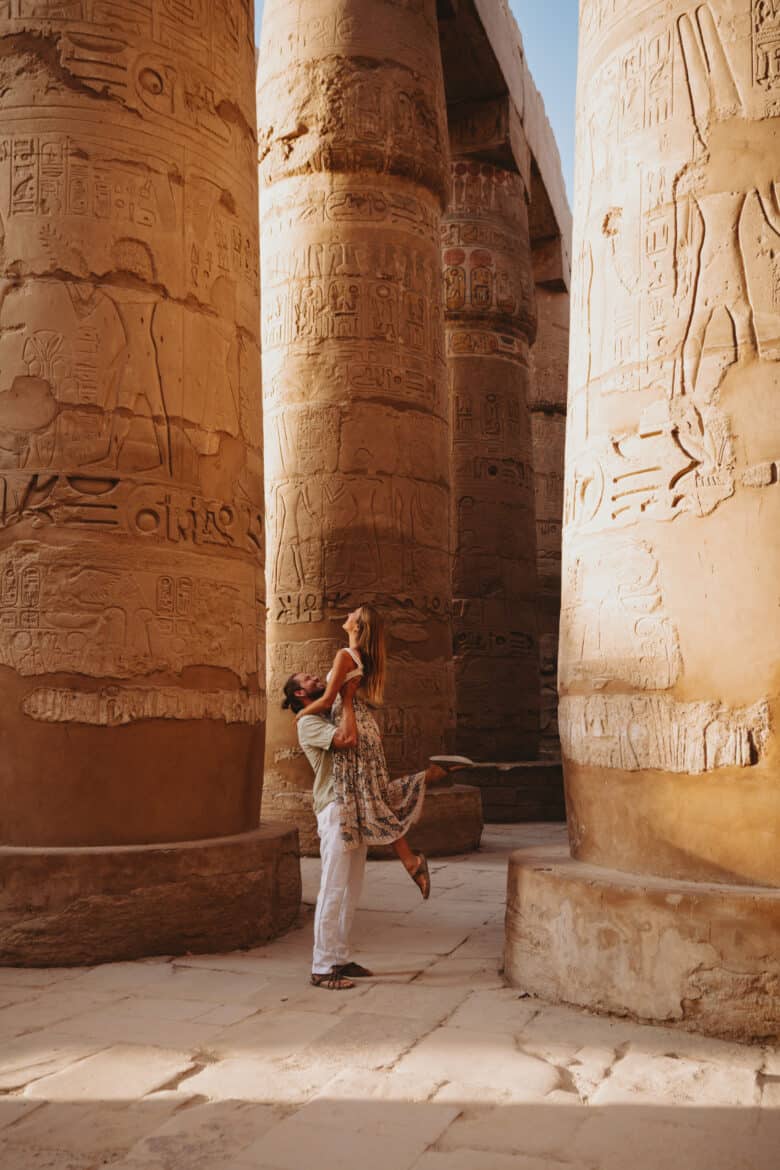
Day 6 – 8 Aswan
About 3-4 hours south of Luxor, you will find Aswan. Less touristy, and with lots of islands on the Nile River, it’s an extraordinary place to explore. Our highlight in Aswan was the beautiful Philae Temple, located on an island and can only be reached by boat. There is a cute cafe opposite the temple where you can have lunch with a fantastic view. Other places to see are the colorful Nubian Village and several other islands you can explore.
Where we stayed in Aswan
We stayed at the beautiful BenBen by Dhara Hotel in Aswan and highly recommend it. The views of Philae Temple and Nile River are stunning, the design is so unique, and the staff made our stay perfect.
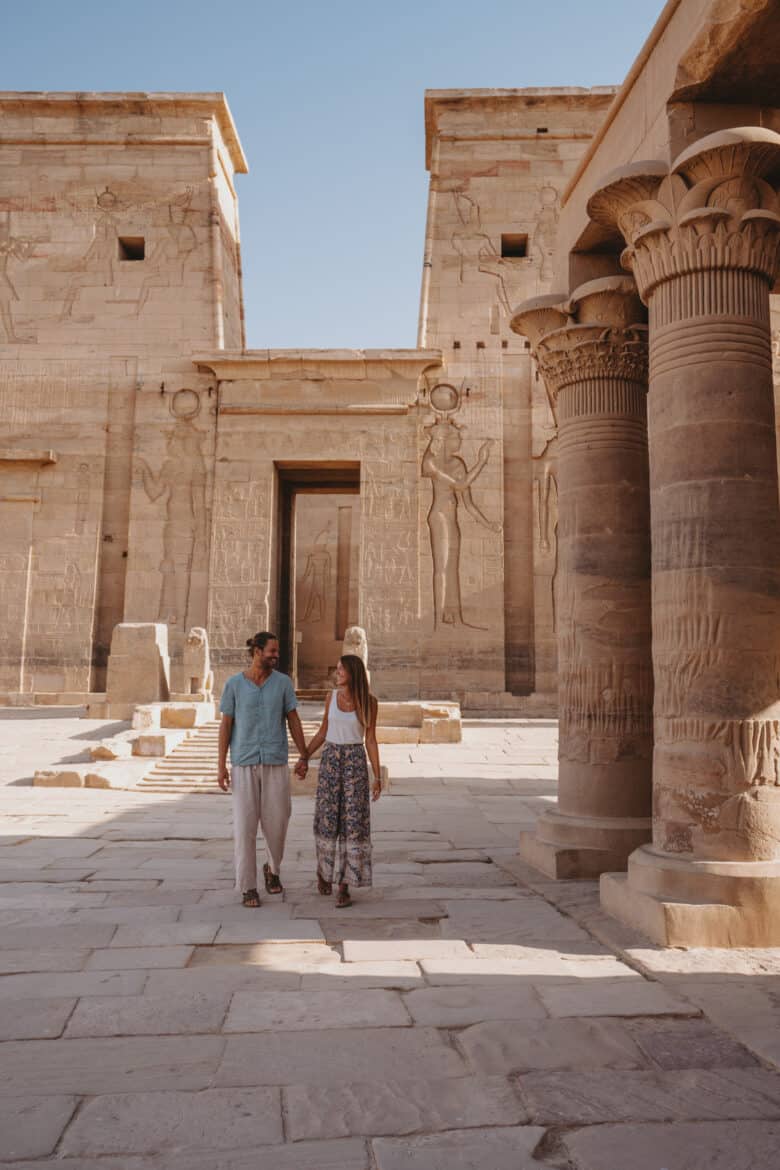
Day 8 – 9 Abu Simbel
Abu Simbel is a less popular place for tourism, and the visitors that visit Abu Simbel temple are all coming with a tour, most of them not even sleeping in Abu Simbel. That is why there are not many options for hotels to stay in. But if you are adventurous, we recommend coming to Abu Simbel as it is probably our favorite temple in Egypt and the most authentic place.
Where we stayed in Abu Simbel
The only budget-friendly option we found in Abu Simbel was Hllol Hotel . It was fine for one night, the location was great, and the staff was very friendly.
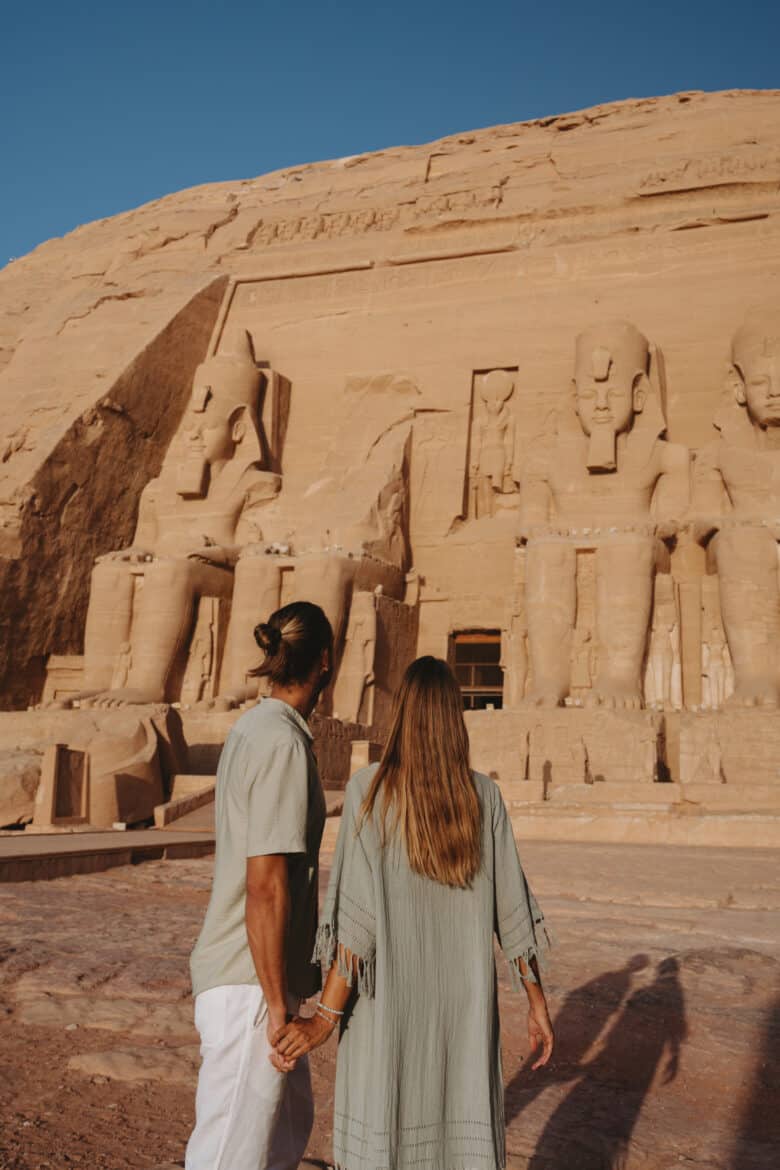
Day 10 – 14 Marsa Alam
Our highlight in this Egypt Itinerary is the underwater world of the Red Sea. Especially if you are a diver, you can’t miss Marsa Alam. But you don’t need to be a certified diver to enjoy the beauty of the Red Sea; even while snorkeling, you can enjoy all the stunning colors and fishes.
We stayed at Red Sea Diving Safari in Marsa Shagra and loved our time there. We could do unlimited self-guided dives at the house reef, dive excursions, and snorkeling with Dolphins at Dolphin house reef. The staff and the whole camp were amazing too.

General Travel Tips for self-traveling Egypt
Vegan in egypt.
Traveling to Egypt as a vegan was not hard at all. Most local restaurants have plenty of vegan options once you know the dishes. Here are our top local dishes for Vegans:
- Tamaya: Egyptian Version of Falafel made from Beans
- Hummus: Chickpea mash
- Baba Ganoush: Aubergine mash
- Foul: Like Hummus but made of Fava Beans
- Vegetable Tajine
- Mashi: Vegetables stuffed with rice
- Red Lentil Soup
- Koshary: Egyptian Street food with pasta, rice, lentils, chickpeas, and tomato sauce
Internet Access
For the internet, we recommend getting a local SIM card. It will make your life easier as hotels often have terrible wifi in Egypt. Especially when you travel independently, it’s beneficial to always have good connection. We got our SIM card from Orange and paid 13 USD for 20 GB.
The most convenient option for travelers is the eSim Card (digital SIM card) from Airalo . You can download and install a digital data pack and get connected anywhere in the world as soon as you land, so there is no need to waste time looking for a local plastic SIM card. Now that we know this option, we will never go back to buying plastic SIM cards while traveling.
We recommend getting cash at the Egyptian National Bank (ENB) as it had no fees with our card from Revolut . It is helpful to have some money in cash in many situations.
People and Culture
We often got asked if we felt safe and if people weren’t very unfriendly in Egypt. Unfortunately, they usually have a terrible reputation. That comes from typical tourist scams and intrusive sellers in tourist places. And yes, that exists, and it can be unpleasant when you visit these places alone. But we never felt unsafe or harassed. Overall we had so many lovely encounters with the Egyptians and think they are very welcoming and friendly people.
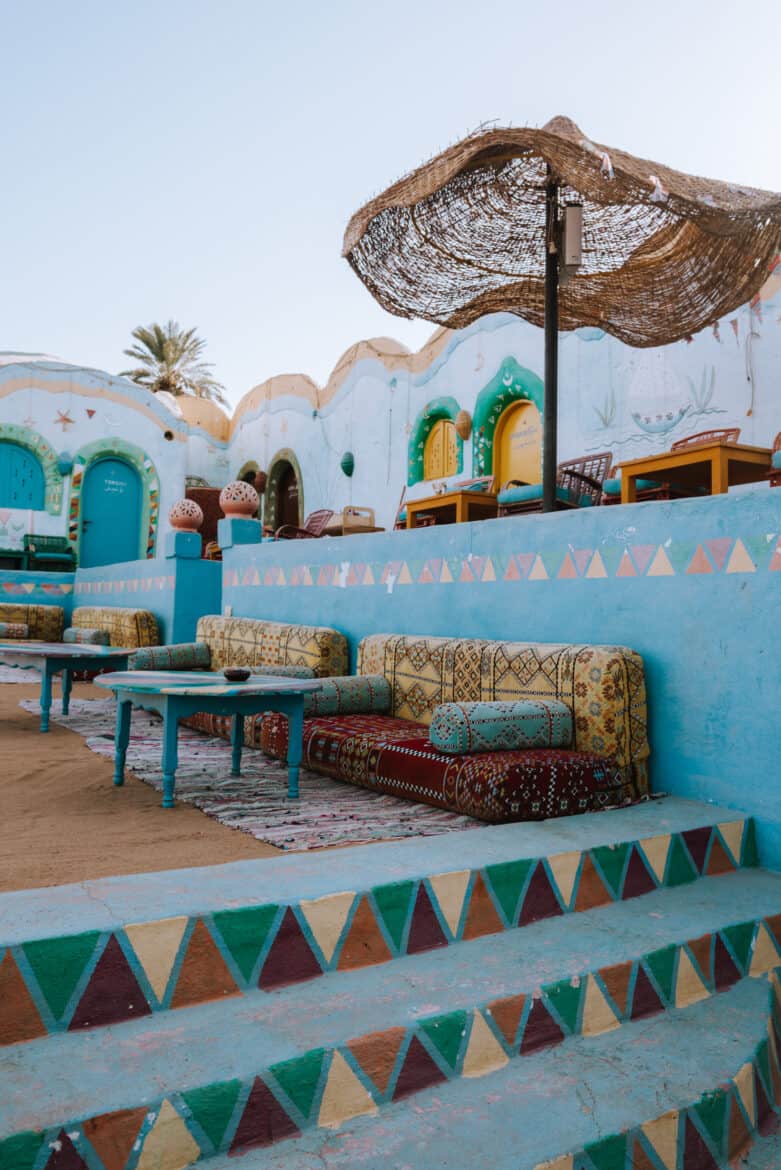
Budget for this 14 Days best of Egypt Itinerary
To help you with your travel budget, we share here the actual expenses we had for this Egypt Itinerary:
- Visa: 50 USD (for two people)
- SIM Card 20 GB: 13 USD
- Domestic Flight Cairo to Luxor: 70 USD with Egypt Air
- Rental Car for 10 Days: 550 USD for 10 days
- Accomodation: 30.00 – 100.00 USD per night (depending on the standard of accomodation)
- Food 2 meals per day: around 30-40 USD for two people
- Entrance fees for temples: from 7 to 15 USD per person (depending on the temple)
Conclusion to our independent Egypt Itinerary
Independent travel in Egypt isn’t the norm, but it’s very well-doable and safe. We had a lot of fun traveling around Egypt with our rental car, and we met many lovely people and had beautiful experiences outside the typical tourist places. But some of the temples and the pyramids are still a must-do in Egypt as they are truly unique, and their ancient history kept blowing our minds. What we love most about Egypt is the contrast between being a desert country and having the most incredible and alive underwater world we have ever seen. So no trip is complete without some days spent at the coast.
- See what others think about this post and share your opinion with us
Love your trips😍😍
Thank you 🥰 Best wishes, Lea & Stefan
Hi guys! When did you drive in Egypt? Do you know if the situation is unchanged? Did you follow a convoy when travelling down to Abu Simbel?
Can you share more details about your driving experience? Thanks! 🙂
Hi Linda. Sorry for the late response. We were in Egypt in October 2022. We don’t know if the situation has changed as we haven’t been to Egypt since then. When driving to Abu Simbel, we didn’t follow a convoy and just drove on ourselves. In general, we had a good driving experience. For sure, the locals are not used to see tourists driving in rental cars, but everyone was friendly and helpful. If it’s your first time driving in a country outside of America or Europe, then it might be overwhelming in terms of the business, and sometimes chaotic … Read more »
Ocean Safari in La Ventana Mexico – All you need to know to have the best experience
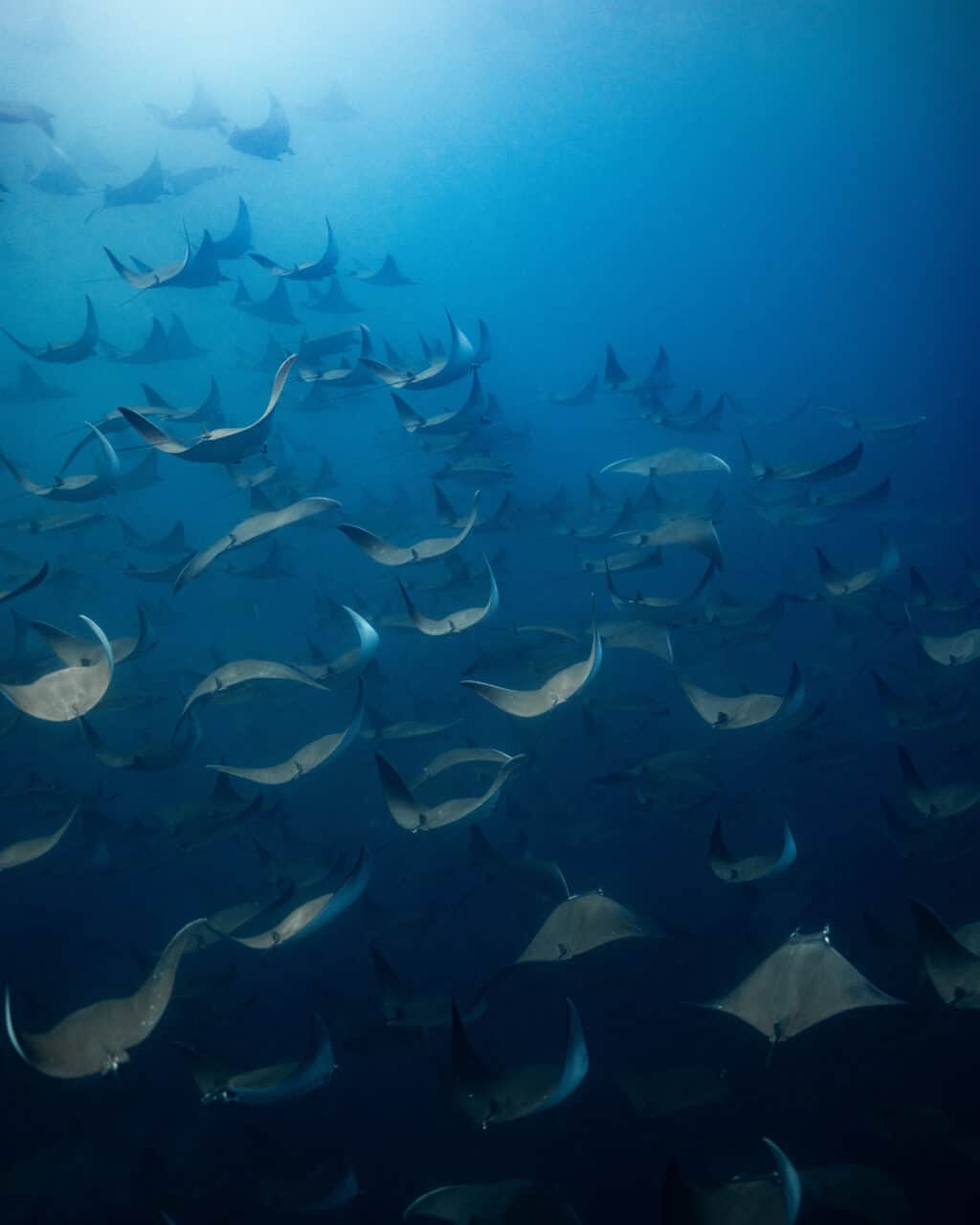
9 Best things to do in Santa Teresa – The Ultimate Guide
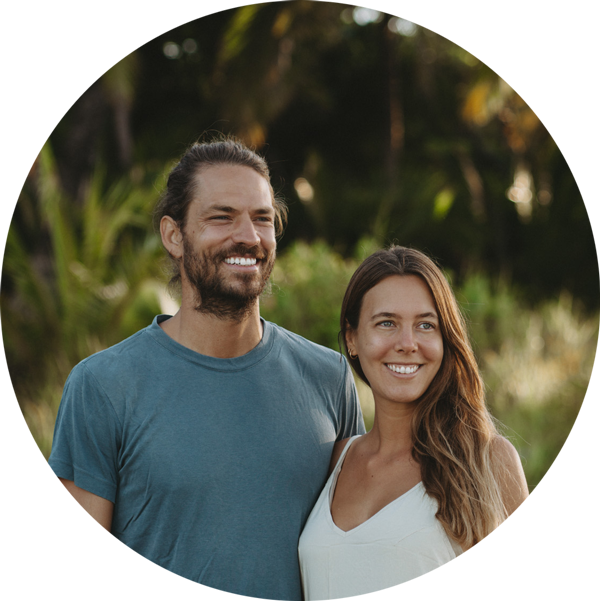
We are Lea & Stefan traveling and discovering the World together. We both care much about nature and health what accompanies us on all our adventures.
Nomad Insurance is a global travel medical insurance that covers people from all over the world while outside their home country. You can buy it even if you are already abroad.

Receive inspirations for your next travels as well as tips for a sustainable and healthy lifestyle.
We respect your privacy and will never send you spam or give your data to others.

Copyright © 2022 Sun Chasing Travelers. All rights reserved. Contact: [email protected] or chat with us chat with us
Made with Love by Lea & Stefan – Sun Chasing Travelers
Pin It on Pinterest
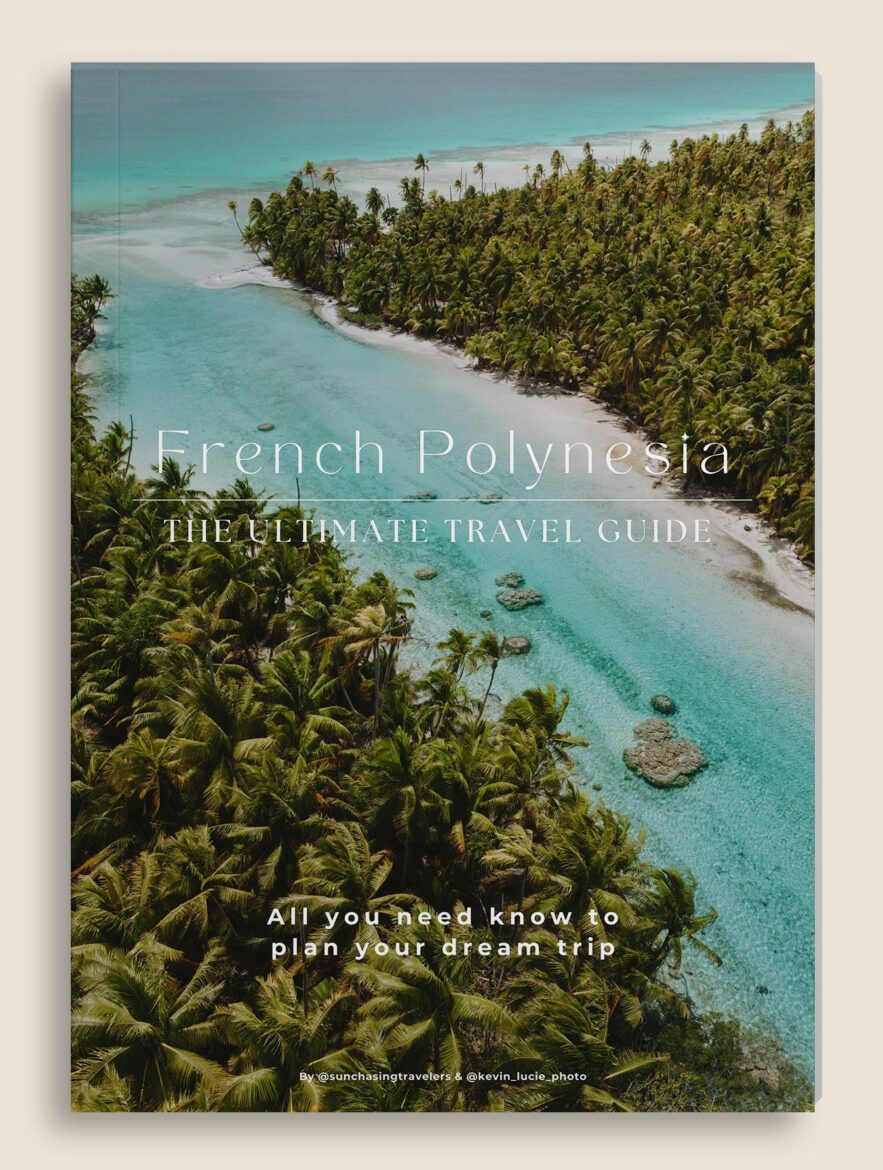
French Polynesia Travel Guide
We’re thrilled as we just released our French Polynesia Travel Guide with all our tips that help you plan your dream trip .

Egypt Travel Tips: 24 Essential Things You Should Know Before You Visit Egypt (2024)
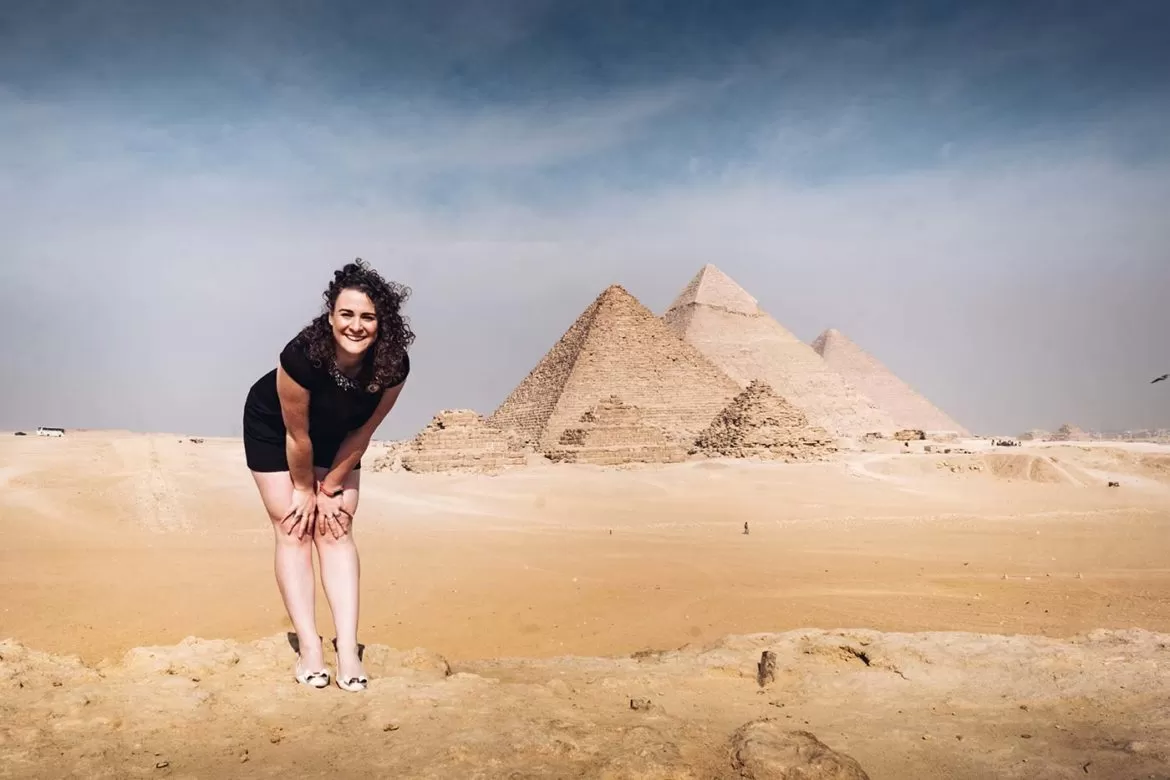
Travelling to Egypt? This Egypt travel tips guide will give you a detailed rundown of absolutely everything you should know before visiting Egypt. Including what to wear, tipping culture, scams, and loads of other useful hacks.
Egypt is awesome. Seeing its magnificent monuments and the mighty Nile will no doubt leave a lasting impression on you.
If you’re reading this, then there’s are good chance you have either booked your flights to Egypt or you’re seriously considering going. Either way, that’s great! You’ve come to the right place and are in good hands.
You won’t regret deciding to travel to Egypt. I know you will have a fabulous time.
How do I know that? Because you’re here reading this article!
You’re doing the right thing by researching and arming yourself with information. This is guide covers literally everything you need to know before visiting Egypt.
This is a very honest (and sometimes brutally honest) guide. No sugar-coating. My intention is not to be a Debbie Downer. I simply want to prepare you, so you will have a wonderful time because there won’t be any nasty surprises.
You won’t find a more comprehensive guide out there on how to prepare for and what to expect in Egypt. I’ve literally poured all my knowledge (and then some!) into this guide because just like you, I was both excited about going to Egypt but also very anxious and probably a bit paranoid too.
With that in mind, here’s everything we’ll cover. Plus a bonus tip at the end you won’t want to miss!
Looking for something in particular? Use this table of contents below to jump around using the links.
Table of Contents
Why you should go to egypt, is it safe to travel to egypt.
- Is Egypt Safe for Solo Female Travellers?
- Survival Arabic Language Guide
When Should You Go to Egypt?
What is the safest way to travel around egypt.
- Food and Upset Stomachs
- Heat and Hydration
- Vaccinations
- Haggling and Bargaining
- Nothing is free
- Cairo Airport
- Crossing the road
- Photography
- Camel Rides
- School Children
- Mosques and Religious Sites
- Fridays and Saturdays
- BONUS TIP: Fake Papyrus Scam
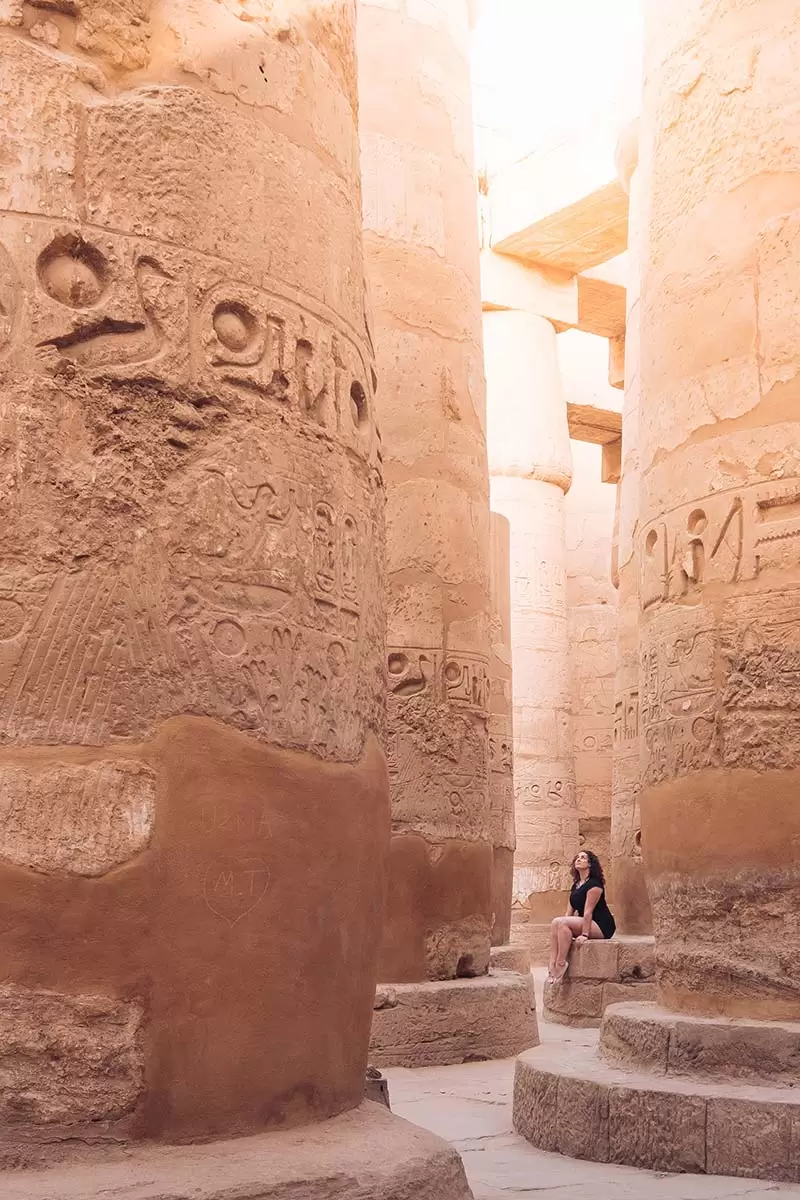
Karnak Temple
There’s so much to love about Egypt and nothing comes close to experiencing it in in person and not through a TV screen. The history, the temples, the smells, the heat, the sand, the Nile and the moment when your eyes finally gaze up at the Pyramids of Giza. All along the Nile you can trace the Ancient Egyptians through history as you visit their impressive and carefully decorated temples and tombs. Learning about the Ancient Egyptians, how they lived, their beliefs, inventions, and actually seeing their creations is something that will stay with you forever. Egypt is simply a marvel that should be experienced by everyone.
Yes! It’s much safer than the media may lead you to believe. Which is probably why you’re here reading about this Egypt travel tips guide
As an Aussie, I always check the Australian Smart Traveller site for travel warnings. This is the equivalent of the travel warning list by the U.S Department of State for American citizens.
While Egypt is currently listed with a Level 2 travel warning (go to page 4 ) (True as of August 19, 2018), it’s important to remember that governments will always err on the side of caution.
There are four levels used. Where Level 1 means ‘exercise normal precautions’ and Level 4 means ‘do not travel’.
As you can see, this particular warning doesn’t mean you shouldn’t travel. It just means that certain areas are better off being avoided and you just need to be more cautious when visiting them. That’s up to you to decide what you’re most comfortable with.
As of August 2018, the areas of Egypt which are flagged as dangerous are:
- The Sinai Peninsula (with the exception of travel to Sharm El-Sheikh by air) due to terrorism.
- The Western Desert due to terrorism.
- Egyptian border areas due to military zones.
The site goes on to suggest ways in which you can reduce any risk:
- Stay alert in locations frequented by Westerners.
- Avoid demonstrations and crowds.
- Obtain comprehensive medical insurance ( get a free quote here ) that includes medical evacuation.
- Enroll in the Smart Traveler Enrollment Program (STEP) to receive Alerts and make it easier to locate you in an emergency.
- Follow the Department of State on Facebook and Twitter.
- Review the Crime and Safety Report for Egypt.
- U.S. citizens who travel abroad should always have a contingency plan for emergency situations. Review the Traveler’s Checklist.
There are other ways you can ensure your safety and help you to feel more confident with your decision to travel to Egypt. This is covered in a later section.
Because of all the negative attention Egypt has received, tourism has fallen drastically which is great for us travellers but not so great for the locals who depend on the tourist dollar.
With fewer visitors, there are also fewer scammers and smaller crowds at famous attractions. So, there is a silver lining.
On a more personal note, I felt safe during my entire Egypt trip which started in Cairo and went all the way down the Nile to Abu Simbel near the Sudan border.
If I can offer any addition peace of mind, it’s that tourist attractions are generally the safest areas to be in in Egypt as they are heavily guarded.
In addition to this, the locals who I met in hotels, restaurants, supermarkets, souks and the Telecom store where I bought my local SIM card, were all very helpful, kind, and friendly.
Is Egypt safe for solo female travellers?
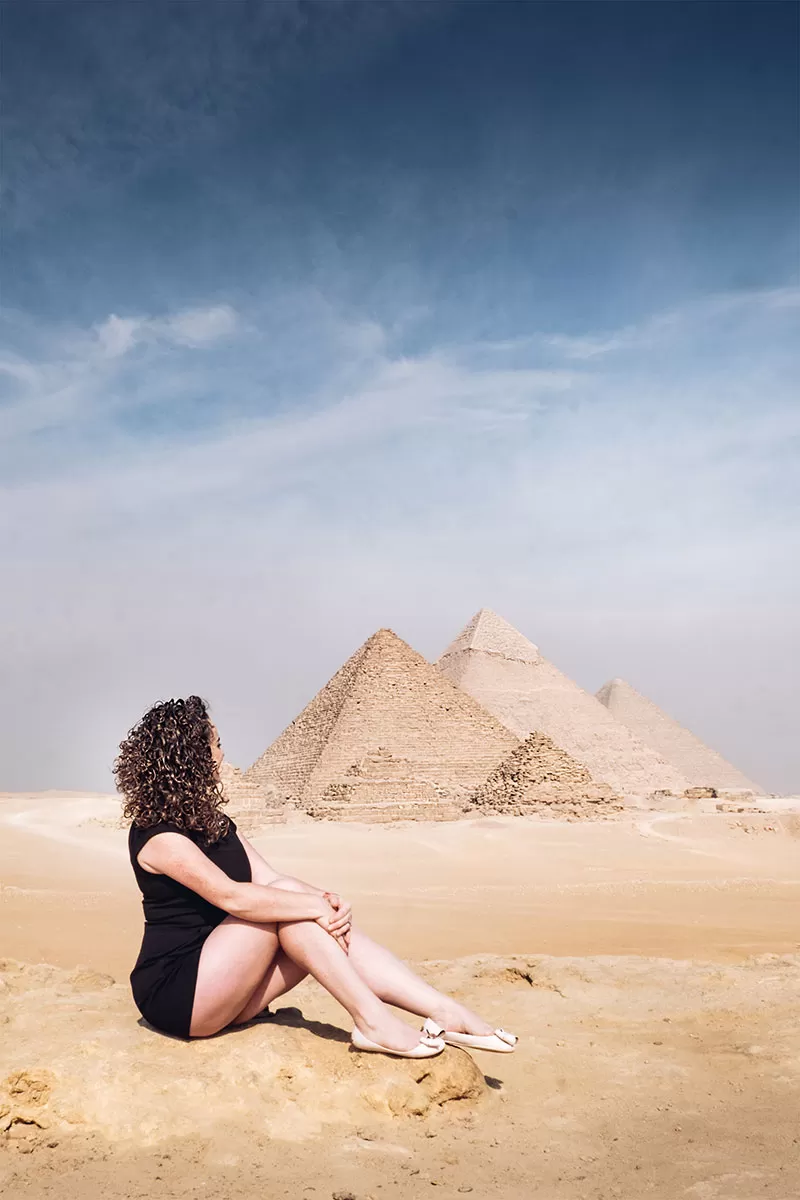
Admiring the Pyramids
Yes! While Egypt is safe, as a female, you will feel a little bit uncomfortable. This feeling will come mainly in open public places such as walking down the street and in souks.
It’s in these places that you will find men loitering, either by themselves or with a couple of other men. I can only describe this as people watching as most of the time they are sitting on plastic chairs and watching the world go by, including us.
If you’re female, you will receive a lot of looks. In my experience they were harmless. If anything, it just made me feel a bit self-conscious.
Sometimes these men will try to start talking with you or guess where you’re from (they’re very good at getting this right, by the way). Somehow they can tell an Australian from an American just by looking or listening to us speak. Very clever cookies.
It’s at this point, you should do what a local Egyptian man told to me, and that is, to ignore them. Don’t even look at them. This will be enough to discourage them. It might seem like you’re being rude, but ultimately it will protect you.
I was told that the seemingly harmless conversations that start with something like guessing where you’re from, will eventually lead into being invited into their home, shop or restaurant, where they will offer you tea (a traditional welcoming custom), then after some more small talk, they will present you with something and insist you buy it. If you decline, they will get angry.
Okay, so I just painted a terrible picture, but it’s important to be aware of these things. I experienced this first-hand and didn’t know what had happened until my local guide told me that it’s a very common ploy.
Not all men are like this by the way. Just some that give the rest a bad name.
Let’s move on, shall we?
Survival Arabic Travel Phrase Language Guide
Knowing some Arabic ahead of travelling to Egypt is such a game changer. When you can show that you speak a bit of the Arabic language and can recognise certain keywords, this will give you an extra layer of protection, especially when it comes to dealing with money.
Not only will you feel more in control, but locals will appreciate and respect your efforts to learn their language.
Here are 13 useful Egyptian Arabic words and phrases you should learn and use:
- Hello – salam / marhaban / ahlan
- Peace be with you – As-salāmu alaykum – Even though this literally means ‘peace be with you’, it is a commonly used greeting. The response would be Alaikum Salaam, meaning ‘upon you be peace’.
- Thank you – shukran
- Please – min fadlak (if you’re a male), min fadlik (if you’re a female)
- Y ou’re welcome – Afwan
- Yes – aywa, No – lā, Ok – Mashi
- How much is this? – bi-kam da. You can say, I’ll pay 100 – Enna hafda meeya. Incidentally, if you say ‘meeya meeya’ (’100, 100′) this means ‘perfect’ or ‘really good’.
- It costs too much – Da ghali awi
- I would like… – momkin
- I want – Enna iza (if you’re a female) or Enna ayez (if you’re a male). To negative the sentence, add ‘mish’. For example, ana mish iza/ayez (I don’t want)
- I don’t understand – ana mish fahem
- Go away – Em’shee
- Pyramid – Haram. Most Egyptians don’t understand the word “Pyramids”, so make sure you learn the Arabic word for them, especially if you’re taking a taxi there. Haram also means. The strict translation of the Arabic word ‘harim’ means (a prohibited place) and is from the verbal root ‘harama’ (prohibited), designated as ‘haram’ (a pyramid). ( Source )
For more Arabic phrases, get my free Arabic travel phrases guide here.
Between June and August, the temperature in Egypt is unbearable. While you may have the luxury of quiet tourist attractions and more hotel options, to be honest, in that heat you won’t want to do anything but relax in a pool somewhere.
The best time to visit Egypt is in Spring. The weather is pleasant and the major attractions such as the Pyramids of Giza, Aswan, and Luxor are still fairly quiet.
You’ll also benefit from cheaper hotel prices, especially if travelling either side of the high season which is December to February.
Avoid traveling during Ramadan.
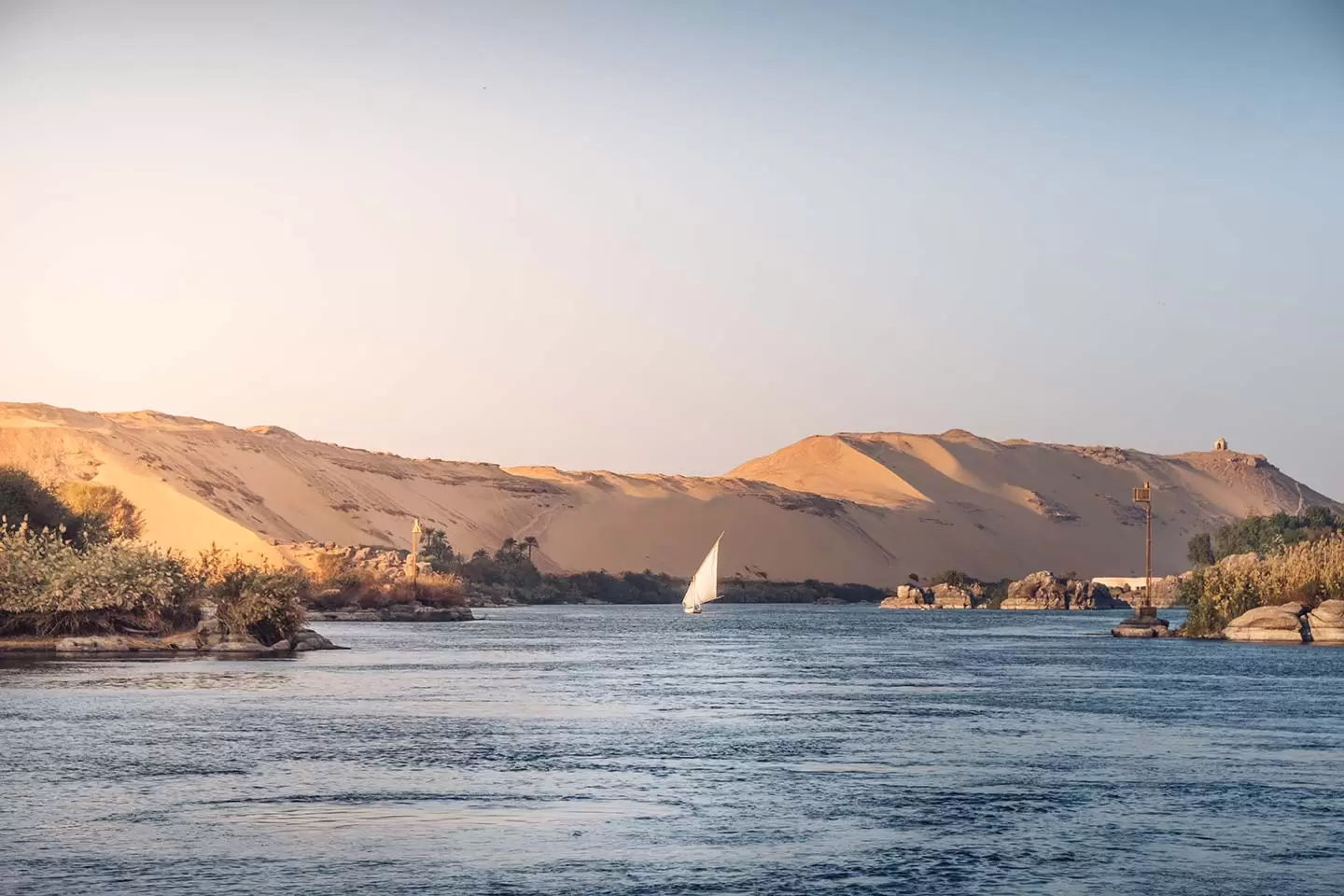
Cruising down the Nile at sunset
This is probably my top tip in this guide. It’s not Earth shattering, but it made all the difference to me and was the only way I could see myself travelling around Egypt and finally fulfil my childhood dream.
Go on an organised group tour!
To simplify and avoid overthinking everything, I knew that I had to travel with an organised group tour. That way I would have a local guide with me, I wouldn’t have to worry about transportation and other logistics and I could just concentrate on having a good time.
Choosing Topdeck to go to Egypt with was a no brainer, for two reasons. I’d already travelled with them before around Outback Australia and really rated my experience with them. The accommodation, transportation, guide and organisation was all spot on. Plus, I met some wonderful people that I’m still friends with.
The second reason (which might sound a bit silly) was that they are an Australian company, which I knew would put my dad’s mind at ease. I knew he would be super worried about me going. Even me living in London makes him worry!
By the way, remember that Egyptian guy I mentioned earlier who warned me about talking to strangers? That was our Topdeck tour manager, Ramzy. Top bloke!
Ramzy gave a bunch of useful tips, a language guide (on behalf of Topdeck), and was basically a kind of bodyboard who protected us from negative experiences and scared off a few scammers. This made all the difference. If you’re curious, I went on the Egypt Express tour . Book your Egypt tour here.
Now, let’s get into the niggity gritty of the everyday realities of travelling in Egypt.
Top 24 Egypt Travel Tips You Should Know Before You Visit Egypt
The tap water in Egypt is heavily chlorinated and tastes terrible. It’s okay for brushing your teeth with, but don’t drink it. Especially if you have a sensitive stomach. Buy bottled water. It’s easy to get and only costs 5 EGP (0.28 USD) for a 1-litre bottle.
2. Food and Upset Stomach
You’re in a foreign place with foreign food, diarrhoea will happen. To help prevent this, again, buy bottled water and check the seal isn’t broken. Avoid eating salads, raw vegetables, unpeeled fruit, and meat that isn’t thoroughly cooked. Don’t buy food from street vendors that don’t have running water. If you want an ice-cream, check that it hasn’t melted and been refrozen. If you do get an upset stomach, take diarrhoea relief tablets and drink plenty of purified water with fresh lime.
3. Heat and Hydration
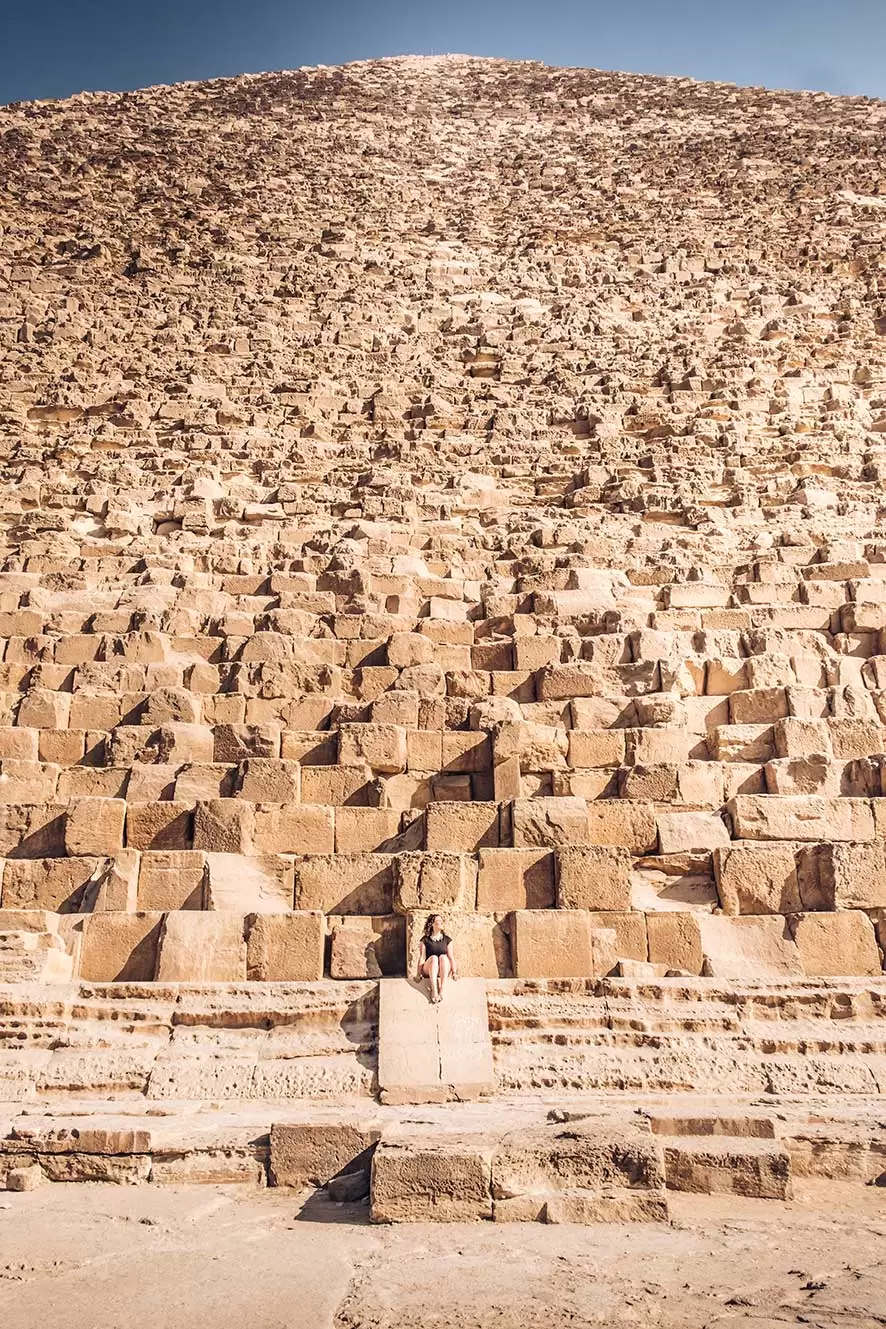
Looking up at the Great Pyramid of Giza
Egypt gets hot, obviously. You’re in the desert! Dehydration, sunburn and heat exhaustion are common, especially in Upper Egypt. As your sweat evaporates you may not realise how dehydrated you are.
If you’re travelling outside of winter, then I highly recommend wearing loose-fitting clothes made of natural fibre. Keep up your fluids up by carrying around this travel bottle and add a bit of extra salt to your food to replace salts lost in sweat. Pack electrolyte tablets to take just in case you feel unwell.
If you need further medical assistance, Egyptian pharmacists generally speak English and can be trusted to provide sound advice and help you find a doctor if needed.
4. Vaccinations
Officially, visitors to Egypt do not require any vaccinations unless you’re coming from an infected area. However, there are some vaccinations you should get or have topped up as a precaution.
Check with yourr GP what they recommend. Beyond ensuring your tetanus and polio is up to date, other common recommendations include getting vaccinations against typhoid, Hepatitis A and B, and rabies. Rabies is a problem throughout Egypt, so avoid touching stray animals such as cats, dogs, monkeys, and bats.
Money and Valuables
5. currency.
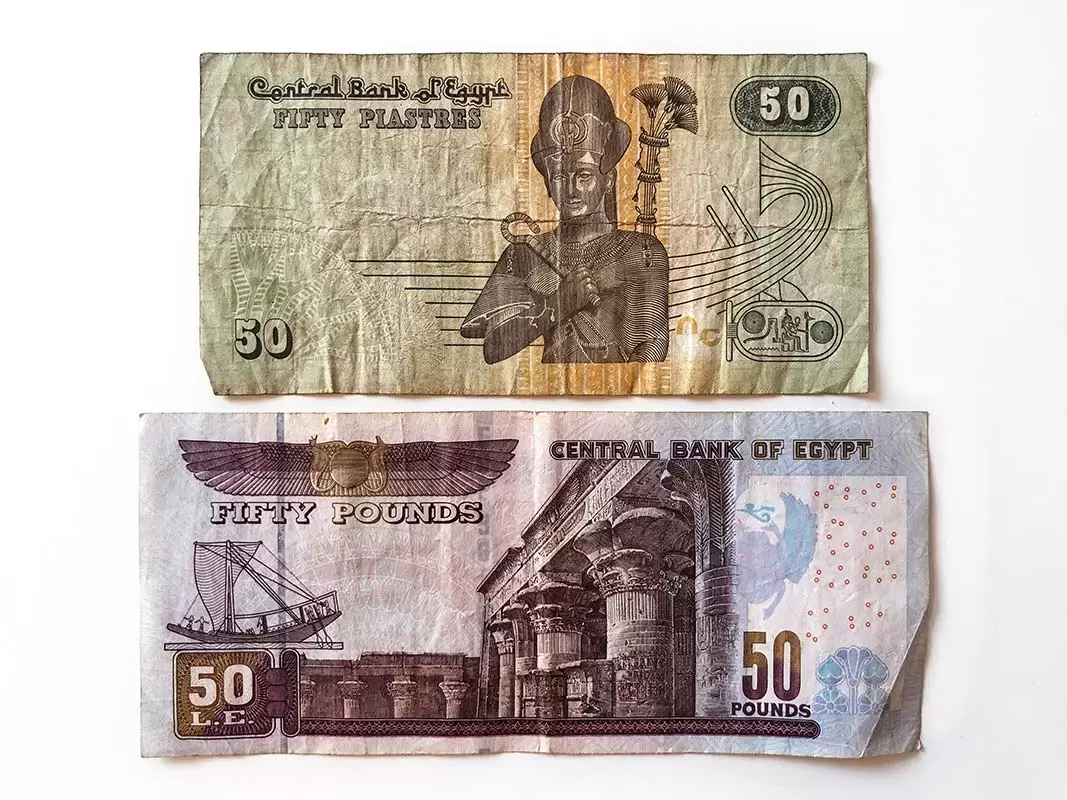
Remember the difference between 50 Piastres (top) and 50 Egyptian Pounds (bottom)
The unit of currency used in Egypt is the Egyptian pound, written £E or LE. The Egyptian pound is divided into piastres (pt). My top tip is to recognise the difference between the 50 pt against the 50 Egyptian Pound notes since they are very different in value.
Make sure that if you’re given change or are paying for something, that you’re not duped into thinking that 50 piastres (or cents) is the 50 Egyptian pounds note. This is a common scam that is used on unsuspecting tourists. When I found out about this, I made sure I kept both denominations on me so I could tell them apart. Compare the difference of the 50 pt and 50 LE in the photo above.
Another word to add your vocab is ‘baksheesh’, which means ‘tip’. You’ll hear this one a lot and it will be expected for anything and everything. Tipping locals for their services is expected and a way of life in Egypt.
Many Egyptians are paid such low salaries that receiving tips is an important part of their income. But rest assured you won’t have to fork out much.
In restaurants, it’s normal to round up the bill or give 10 per cent directly to the waiter. Smaller tips (0.25 piastres to 1 EGP) are given to the likes of lavatory attendants, porters, and anyone willing to bend the rules a bit like letting you enter a site after hours or taking a photo in a restricted area.
While the rules are often bent in Egypt, authorities are cracking down on certain things (like being able to take a photo inside King Tuts tomb) with hefty fines. Don’t risk offering money just to get your way.
7. Haggling and Bargaining
One of the best things to do in Egypt is to visit a souk market. When browsing comes to buying and you ask, bi-kam da? (How much is it?) be prepared to bargain hard or walk away. As a general rule, offer one third of the asking price and expect to pay half.
8. Nothing is free
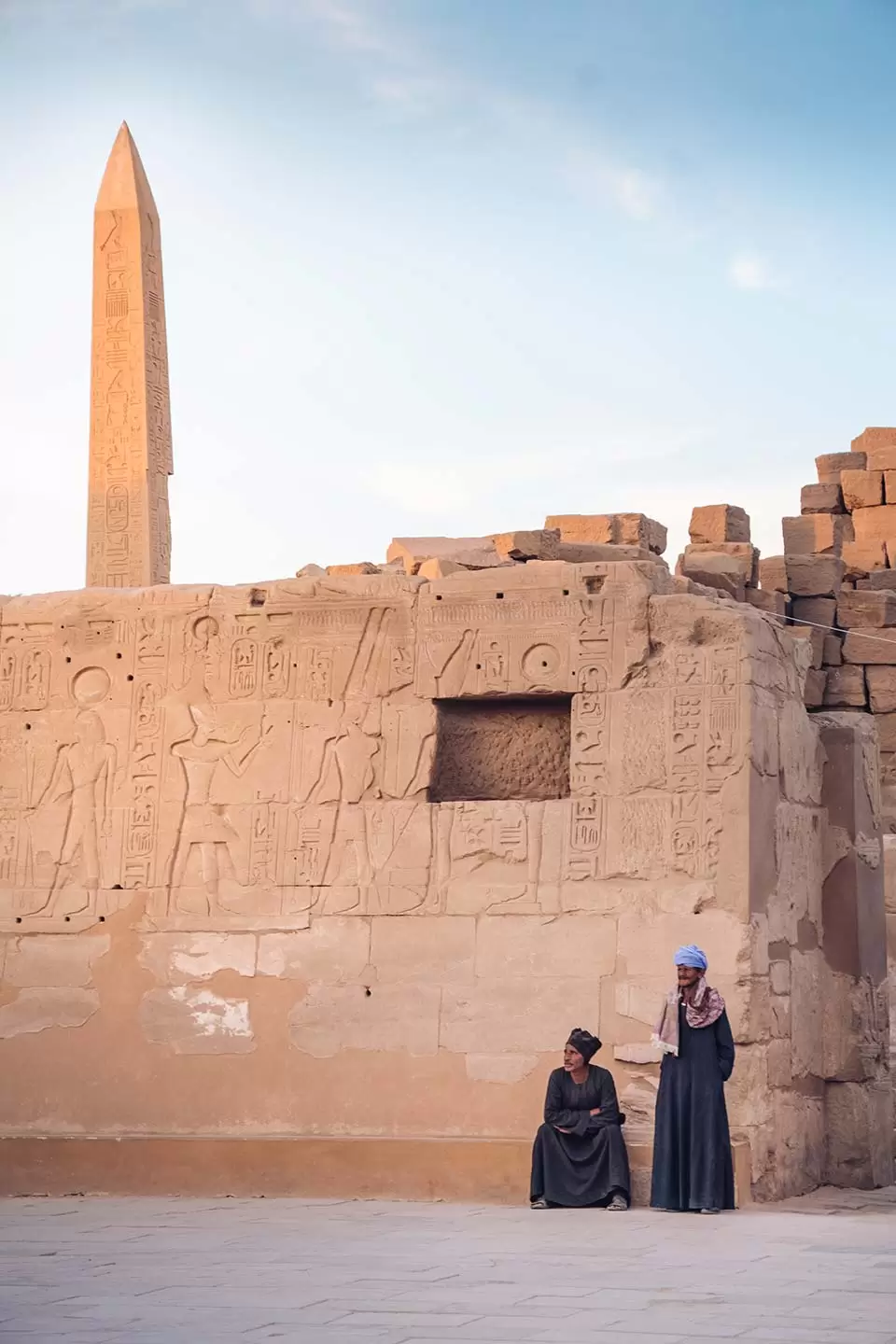
Taking a sneaky photo at Karnak Temple without being spotted
Want to take a photo of a camel at the Pyramids? If the owner catches you look, he will probably demand to be paid.
I learned this lesson the hard way. I was at least 20 metres away when I was spotted taking a photo of a camel resting. It’s up to you if you choose to offer the owner something and if you feel like you’ve done something wrong.
A similar incident happened when I was at Philae Temple. Three men were talking amongst themselves and with the temple behind them I thought it would make a great shot. With at least 50 metres between us , I took the shot. They spotted me and came over and offered to have a group photo. By this point I knew the drill and was happy to give them a little baksheesh.
9. Belongings
It goes without saying that you should always keep your valuables with you. Decide on whether or not you feel comfortable leaving your passport, laptop or iPad in the hotel room safe or if you’re better off keeping it on you. Using a PacSafe is a great option if you want to leave stuff in your room and there is no safe available.
If you go on a tour, don’t leave anything valuable on the bus, even if the driver is around. They can’t be responsible if something happens.
What to Wear
10. clothing.
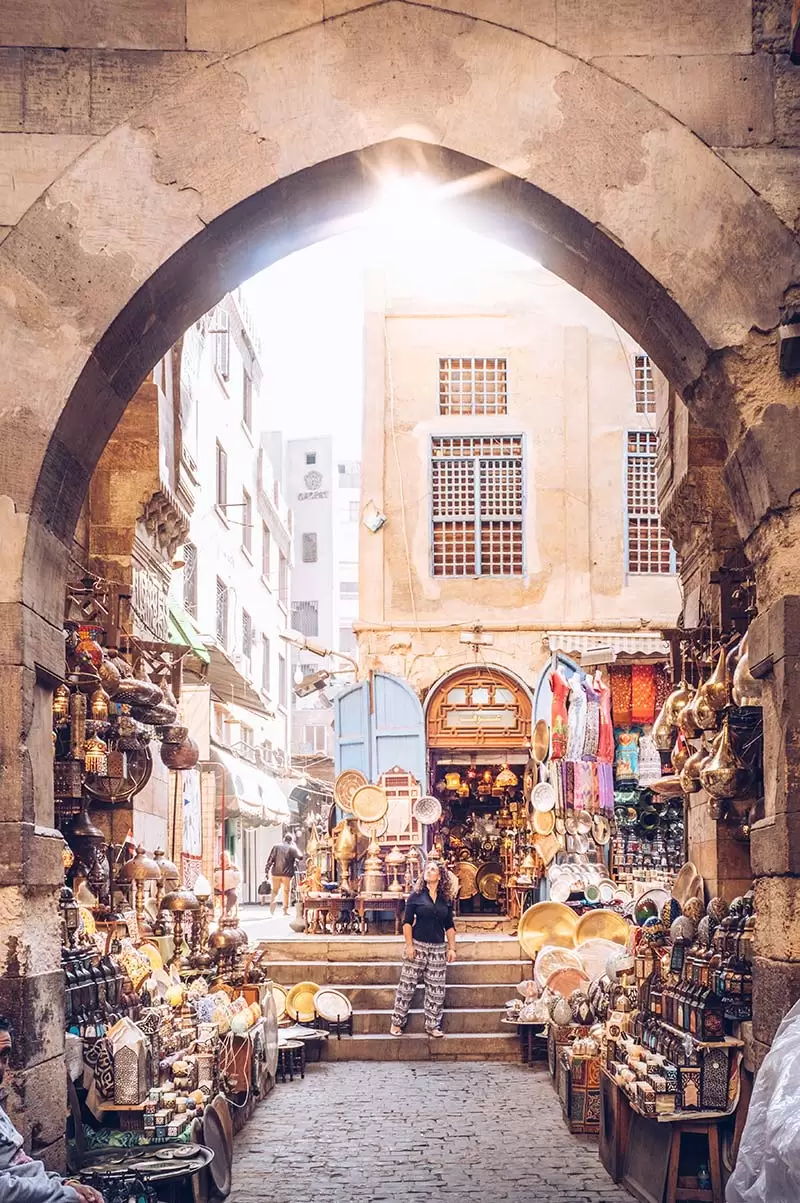
Khan el-Khalili market in Cairo
Egypt is dusty, sandy, and dirty. Your clothes will dirty easily and you’ll be washing your hair most nights. Be prepared to rinse out your clothes each night ( this will do the trick ) or pack extra items to wear.
So, what should you wear? As a general rule, wear loose-fitting clothes that are made of breathable material.
Ladies, it’s a bit more complicated for us. While Egypt is one of the more liberal Islamic countries, it has become more conservative in recent years with many women wearing a hijab or headscarf. Female tourists aren’t obligated to wear these but you may feel more at ease doing so, especially in mosques.
As a general rule, avoid showing your chest, shoulders or legs below the knees.
At this point you’re probably looking at my photos wondering why I didn’t cover up my legs, and you’re right! I did pack longer dresses, but when Ramzy told the group that it’s ok to wear shorts and normal summer attire when visiting monuments such as the Pyramids and the temples along the Nile, I felt comfortable in taking his advice.
The only exception he made was when visiting mosques, markets or souks. Which is why you’ll see me wearing long pants in the photo above in Khan el-Khalili souk in Cairo.
If you’re a female travelling alone, place ring on your wedding finger, this will show respectability.
11. Footwear
However hot and tempting it maybe to wear flip flops, with all the dirt, sand and grime present, I recommend wearing closed toe shoes.
You’re going to be doing a lot of walking in some pretty unclean areas and the last thing you want is having dirty feet all day.
Getting Around and Transportation
You need a visa! For Americans and Aussies, and a few other countries, you can either apply in advance for an Egypt e-Visa , or queue at the border for a visa on arrival.
For most travellers, the visa will cost roughly $USD25 (single entry, valid for 30 days) or $USD35 (multi-entry). Since I travelled with Topdeck, they organised my visa once I arrived. All I had to do was bring American Dollars to pay for it. Only American Dollars or Egyptian Pounds are accepted. In addition to your visa, ensure your passport is valid six months beyond your planned date of entry.
Taxis are cheap and easy to use. Simply go to a main street and wave your hand, that’s it. They even have Uber if you prefer! Just be sure he follows the GPS.
Before jumping in the taxi, agree on the price beforehand and stick to it. Not matter what reason they come up with. For getting around Cairo, you can expect to pay 50 to 80 EGP. (2.70 – 4.50 USD).
If you’re staying in Downtown Cairo, getting to the Pyramids should only take 30 minutes, but Cairo has very busy roads so it can take 60-90 minutes.
There are three kinds of taxis in Cairo: Black Taxis, Yellow Taxis and White Taxis. Black taxis are the oldest ones. Most are without a meter and without air-conditioning. White taxis are the modern equivalent of black taxi. They have a meter and air-conditioning. Yellow taxis are professionally run and can be booked over the phone but are the most expensive. I recommend getting a white taxi and bargaining hard.
14. Air travel
With raised safety concerns in Egypt, some airlines like British Airways are becoming more strict with what you can take in your carry-on luggage or even in your checked luggage.
I flew both ways with British Airways but they only had an issue when returning to the UK. They had very strict guidelines on what size lithium batteries were allowed on board.
A bunch of us were fuming when we were forced to leave behind expensive powerbanks which we weren’t reimbursed for or given alternatively means of keeping them. To give you an idea, this is the one I had to part with. *sniff*.
Air France, who were also flying that day but didn’t have this rule. Check with your airline ahead of travelling so you’re not caught out and left out of pocket.
15. Cairo Airport
Cairo Airport is unlike any airport you’ve experienced. Upon arrival, everything seems pretty standard until after you go through passport control.
Once you pick up your luggage and head to the exit, there will probably be a massive long queue that wraps around the luggage collection hall. Guarding the exit is one or two men who will look you up and down and decide if they want to check your luggage.
Since we were with a Topdeck escort who came to help us get a visa and take us to the hotel, he was on familiar terms with the airport staff and was able to get us through quickly.
Once we got through to the other side, our escort disappeared briefly to hand back a permit he was given in order to come and meet us inside. This is just another reason why travelling with an organised tour is great.
If, at the end of your trip you leave via Cairo Airport, be prepared for three separate security checks; one as soon as you enter the airport at the entrance, one at customs, then another at the gate. The first one is where they’ll flag any illegal objects like my poor powerbank .
16. Crossing the road
Crossing the road in Cairo is a skill. If you’ve ever been to Rome and stared down a driver then confidently walked out into a busy street, then you’re well-prepared for Cairo.
If locals see you struggling to cross, they will either let you join their own crossing convoy or come and assist you.
If you’re still too nervous to go it alone, you have some other options for crossing the road:
- Wait for a lull in the traffic before crossing (this may take a while).
- If possible, cross where there is only 1 or 2 lanes of traffic. Don’t stop in the middle of the road between the two lanes either. Cars will drive dangerously close to you while you wait for the other lane to have an opening.
- Ask someone to join them as they cross. If they can’t understand English, simply smile and indicate to the other side of the road.
- Find a policeman to help you, there are plenty around.
17. Driving
Whilst driving from Cairo to Luxor during the night, I noticed that many drivers didn’t have their headlights on. This is totally normal and nothing to be concerned about. Egyptians believe they see better this way.
When a car is approaching, they’ll flash their lights to let them know they’re there. Some drivers may keep their fog lights on. If you’re wondering, our Topdeck driver kept his headlights on.
Cultural Tips and Other Useful Tips
18. photography.
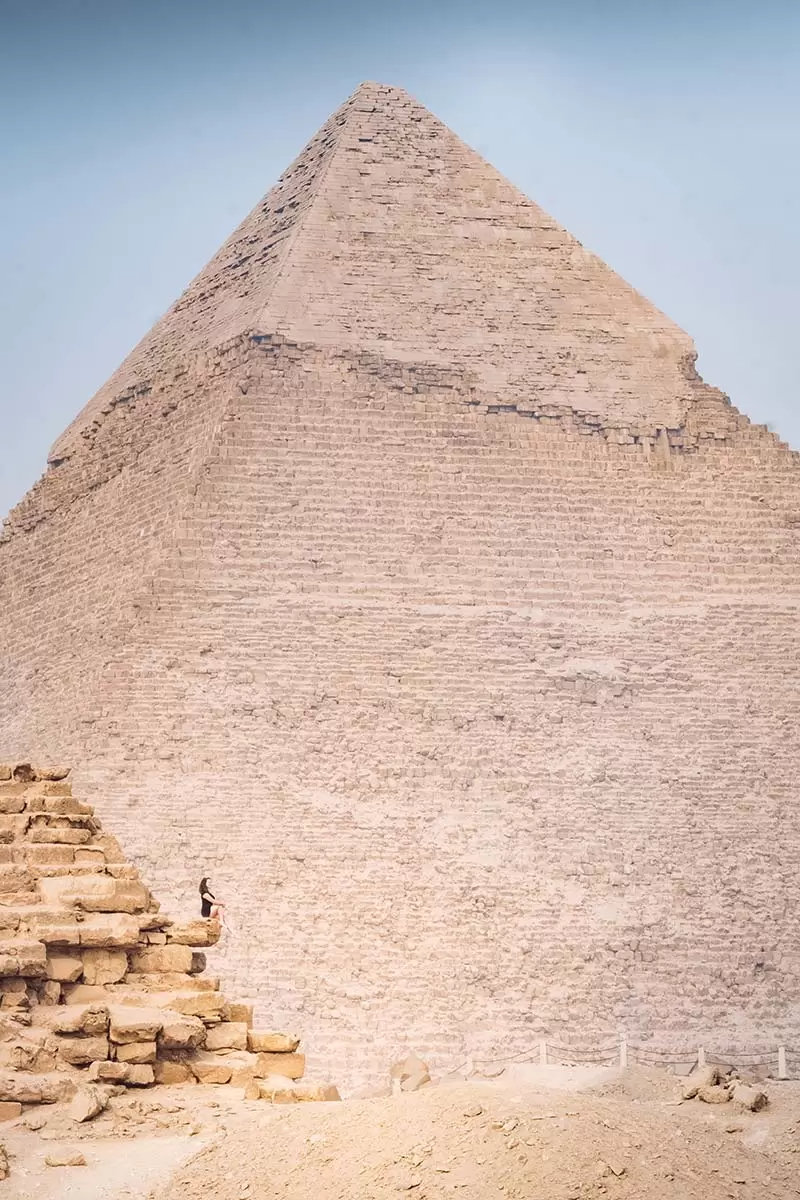
You will have to pay a small fee to take your camera inside the Pyramids Complex
Want to take your camera with you? Be prepared to pay for it!
Whether you want to take photos or film video, every monument, temple, tomb and museum you visit will charge a small fee just to take it inside. Expect to pay anything from 50 to 100 EGP (2.70 – 5.60 USD).
I was even charged extra when guards are Philae temple saw my tripod. At first they wouldn’t let me take it at all then they came around when I said I wouldn’t use it so they charged me for another camera ticket.
Once inside, flash photography is generally forbidden and should be strictly followed.
19. Camel Rides
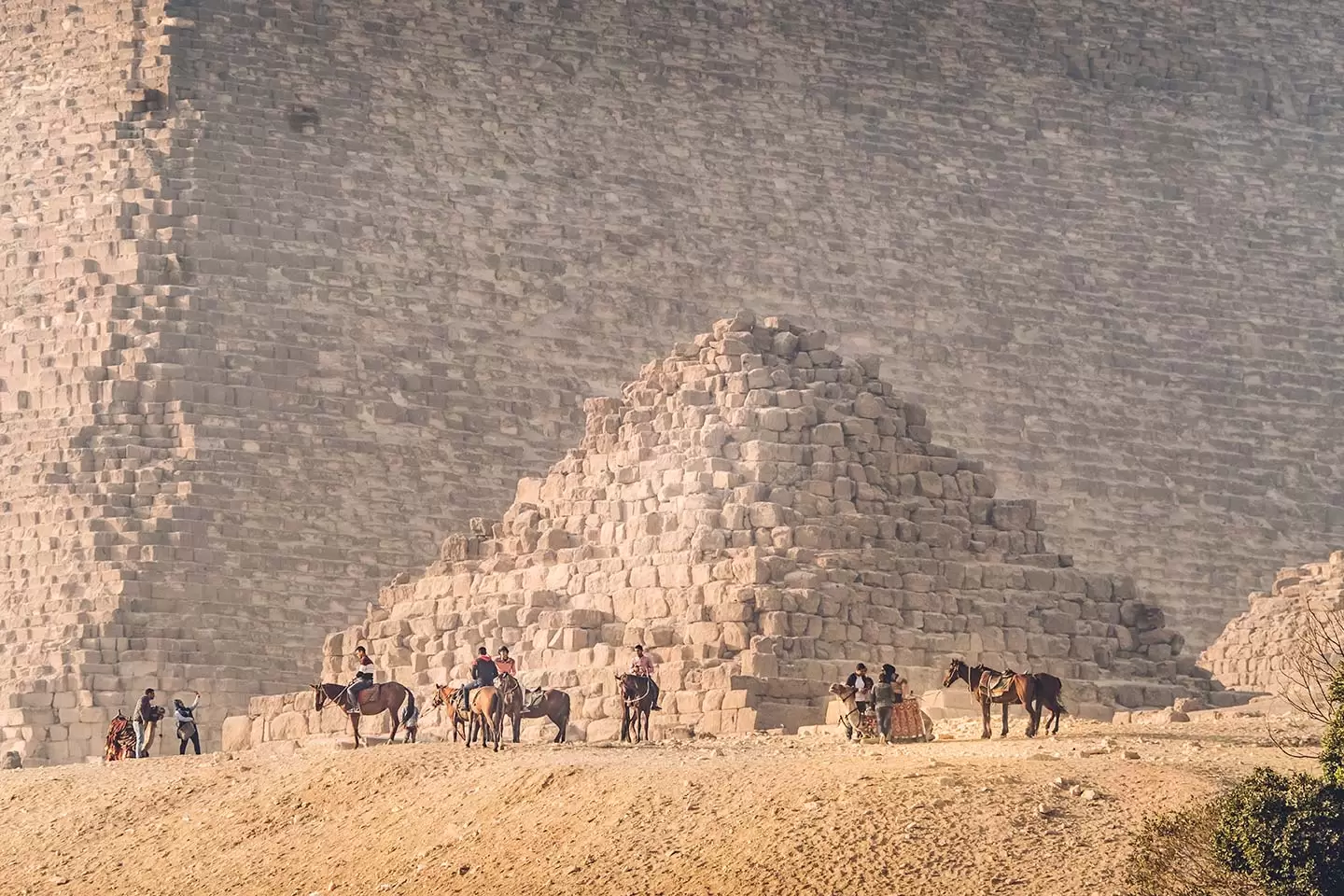
Camel and horse rides at the Pyramids of Giza
Going on a camel ride and taking a photo with the pyramids behind you is one of the most desired tourist souvenirs from a trip to Egypt.
If you know that going on a camel ride around the pyramids is something you definitely want to do, you may (and I hope), reconsider once you arrive and see how malnourished and badly treated the camels, and horses for that matter, are.
Egypt is a third-world country and many citizens are living in a state of desperation. As such, the men who run these camel rides prioritise feeding their families over feeding their camels. While they may have their priorities right, I can’t bring myself to support them. This has only become worse since tourism has declined.
If you do choose to take a camel ride, make sure you’re not hassled into paying more than the fair price. In order to crack down on scamming tourist signs have now been put up showing set prices for camel rides which are 50 Egyptian Pounds for 30 minutes.
Make sure you check out my guide on everything you need to know about visiting the Pyramids.
20. Toilets
Public toilets in Egypt are not the best, and that’s putting it lightly.
A trip to the loo will set you back 1 or 2 EGP and give you access to either a squat or western toilet. They generally don’t have toilet paper, are dirty, and the tap water may not be running. Bring your own toilet paper ( these flushable wipes are great ), hand sanitizer, and wipe down the seat if you must sit or get one of these.
There will usually be a hose next to the toilet, but the water will only be turned on if you pay a baksheesh.
Toilets in restaurants and hotels are usually staffed by an attendant who will give you toilet paper and turn on the tap for you. Giving a baksheesh of 25 – 50 piastres is standard.
21. School Children
You might feel famous when travelling around Egypt. At least that’s how the students in large school groups will make you think,
On countless occasions, at the Egyptian Museum in Cairo, the Pyramids, and Karnak Temple, young kids would run up to us asking for selfies or yell out and wave as our group walked passed. They were so excited and interested in us.
When I asked Ramzy why, he said that we are sort of celebrities to them. They watch people like us on TV who have very different lives from their own so they get excited when they see us in their country.
It’s actually very sweet. However, if you say yes to one, they’ll all come running. It’s best to politely decline from the start.
22. Mosques and Religious Sites
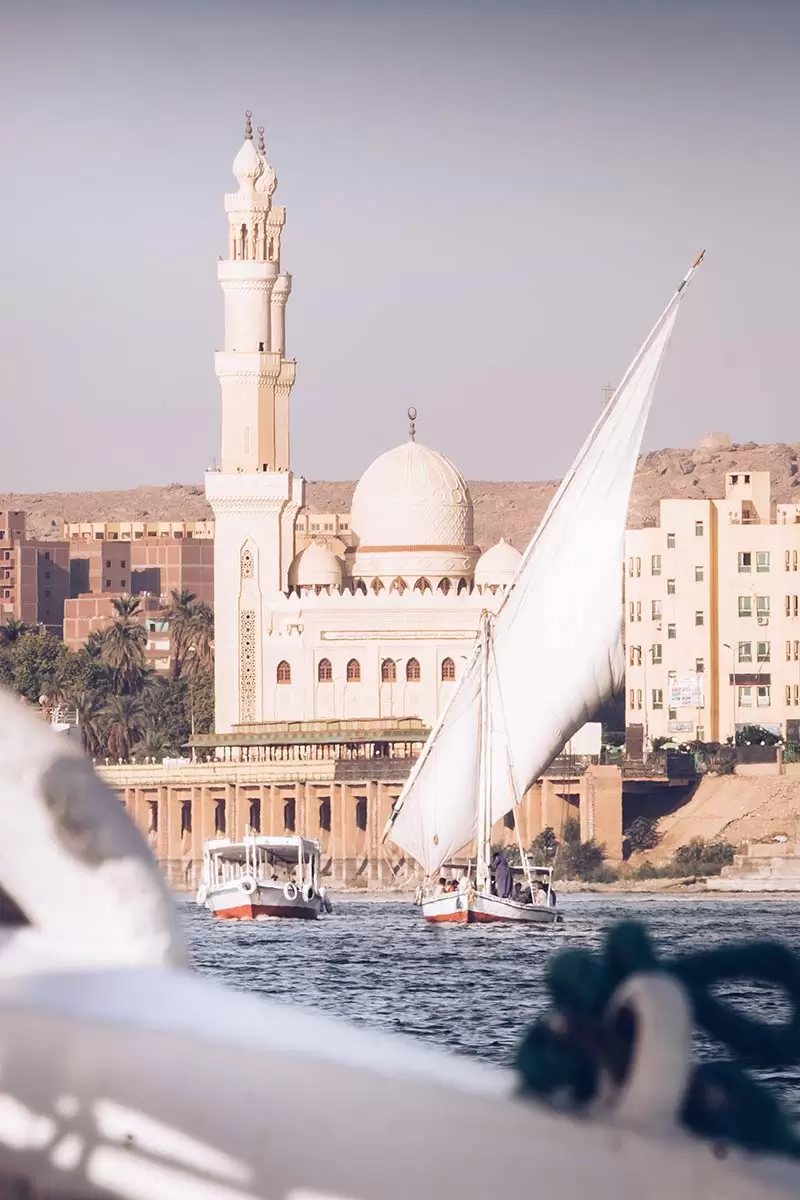
A beautiful Mosque on the Nile
Dressing modestly is a must when visiting mosques. Some places may ask women to cover their hair and will provide you with a headscarf. Before entering you will be required to remove your shoes and leave them with a shoe custodian (give him a baksheesh).
If you want to climb the minaret (tower), carry your shoes with the soles pressed together. It’s best to avoid visiting mosques during prayer times as to not intrude on worshippers.
23. Smoking
Everywhere you go, everyone will be smoking. Whether it’s a cigarette or shisha water-pipe, if you’re a non-smoker it can get really annoying.
Smokers are allowed to light up pretty much anywhere. The only exception is in fast-food restaurants thanks to an initiative by the environment ministry.
Restaurants have non-smoking tables, but these are almost pointless since they are surrounded by smoking tables. If you’re outside, try and stay upwind and always ask for a non-smoking room in your hotel.
24. Fridays and Saturdays
As in most Arab countries, their weekend falls on a Friday and Saturday. This means tourist attractions are much more busy on these days than the rest of the week.
I strongly recommend not visiting the Pyramids, Cairo Tower or the Egyptian Museum in Cairo on either of these days. The queues will be torture.
25. BONUS TIP: Fake Papyrus Scam
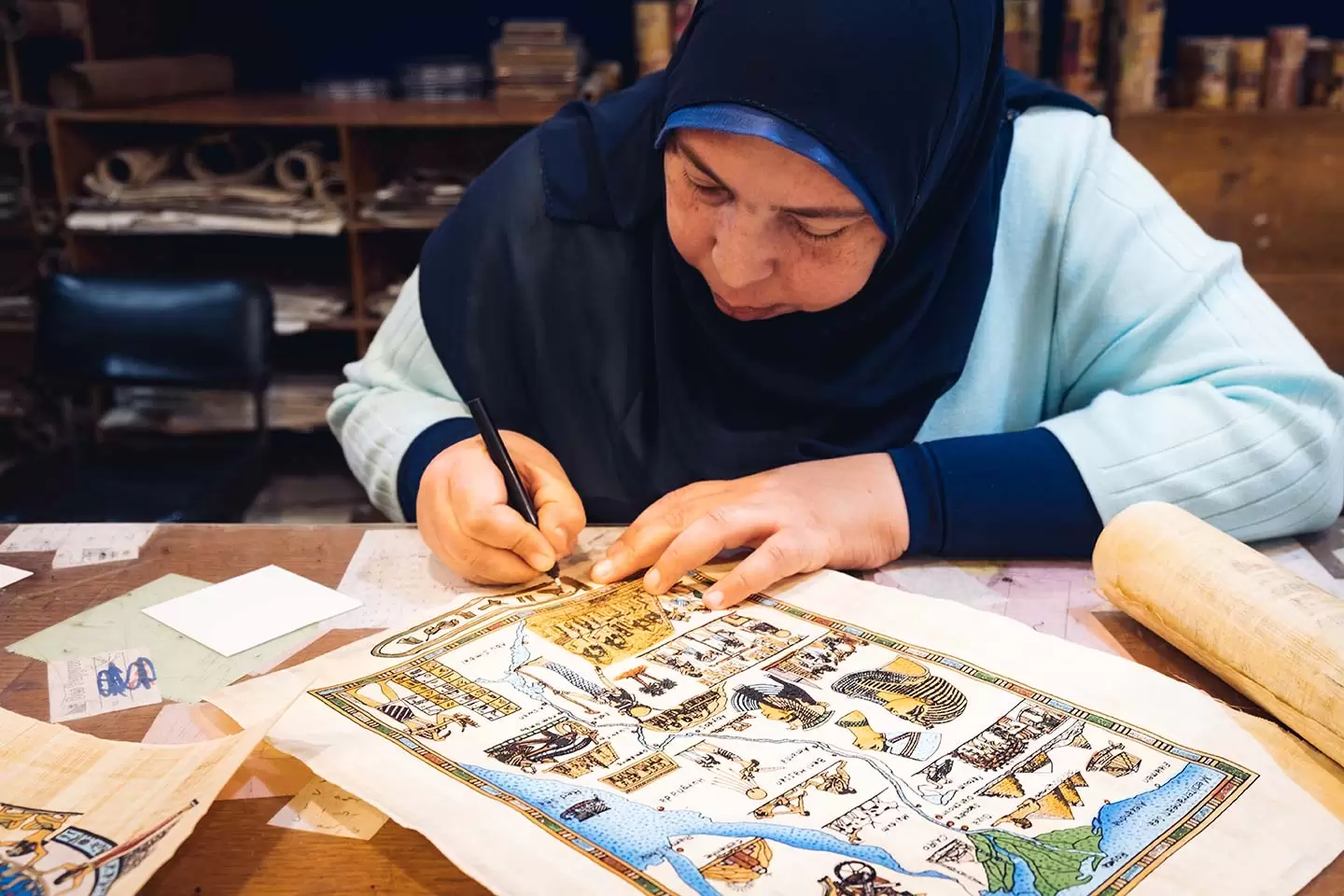
Lady writing my name in hieroglyphics on real papyrus
The Ancient Egyptians were one of the first to master the production of paper, known as papyrus. One of the nicest souvenirs you can get after a trip to Egypt is a papyrus print. But, there is a very common scam take catches out many tourists. Fake papyrus!
In many markets and other street vendors will sell fake papyrus that is actually made from banana leaf, not the papyrus plant. These will be cheaper than the real thing.
So, how do you spot a fake papyrus? Easy! First, notice how these vendors show or display their “papyrus”, it’s stiff, like cardboard and will tear when rolled which is why they’ll never roll it. Real papyrus is strong, flexible and durable and can be rolled up. Second, hold the papyrus up to the light, you should be able to see vertical and horizontal strips that make up the papyrus sheet, within these strips you should see little dark fibres or flecks. This is a good sign!
I hope this guide has helped you feel more prepared for your trip to Egypt. Remember, every country has its quirks. If things were the same as home, you wouldn’t be visiting.
I would go back to Egypt in a heartbeat. Everything I saw blew me away. It’s such an incredible country with a wonderful history. The locals are welcoming and it’s very cheap to travel to.
If you still have any questions or concerns, please reach out and leave a comment below. I’d be happy to help where I can. If not, then I wish you a wonderful trip! Support this blog and book your Egypt tour here.
Shukran for reading! ;)
Take a day trip from Cairo
- Alexandria Day Tour: See the city built by Alexander the Great
- Private Full-Day Tour of Historical Alexandria from Cairo
- Pyramids of Giza, Sakkara & Memphis: Private Tour with Lunch
- Pyramids, Museum & Bazaar Private Tour with Entrance & Lunch
- Cairo: Dinner Cruise on the Nile River with Entertainment
- Cairo: Egyptian Museum 4-Hour Private Tour with Transfer
- Cairo: 1 or 2-Hour Felucca Ride on the Nile with Transfers
- Old Cairo and Khan El Khalili Bazaar: Private Half-Day Tour
- Cairo: Best Kept Secrets Night Tour
- Plus loads more here …
Let me remind you again why Egypt is amazing and watch my Egypt vlog below.
Going to Egypt? Get my free Arabic travel phrase guide.
Like it? Pin it for later
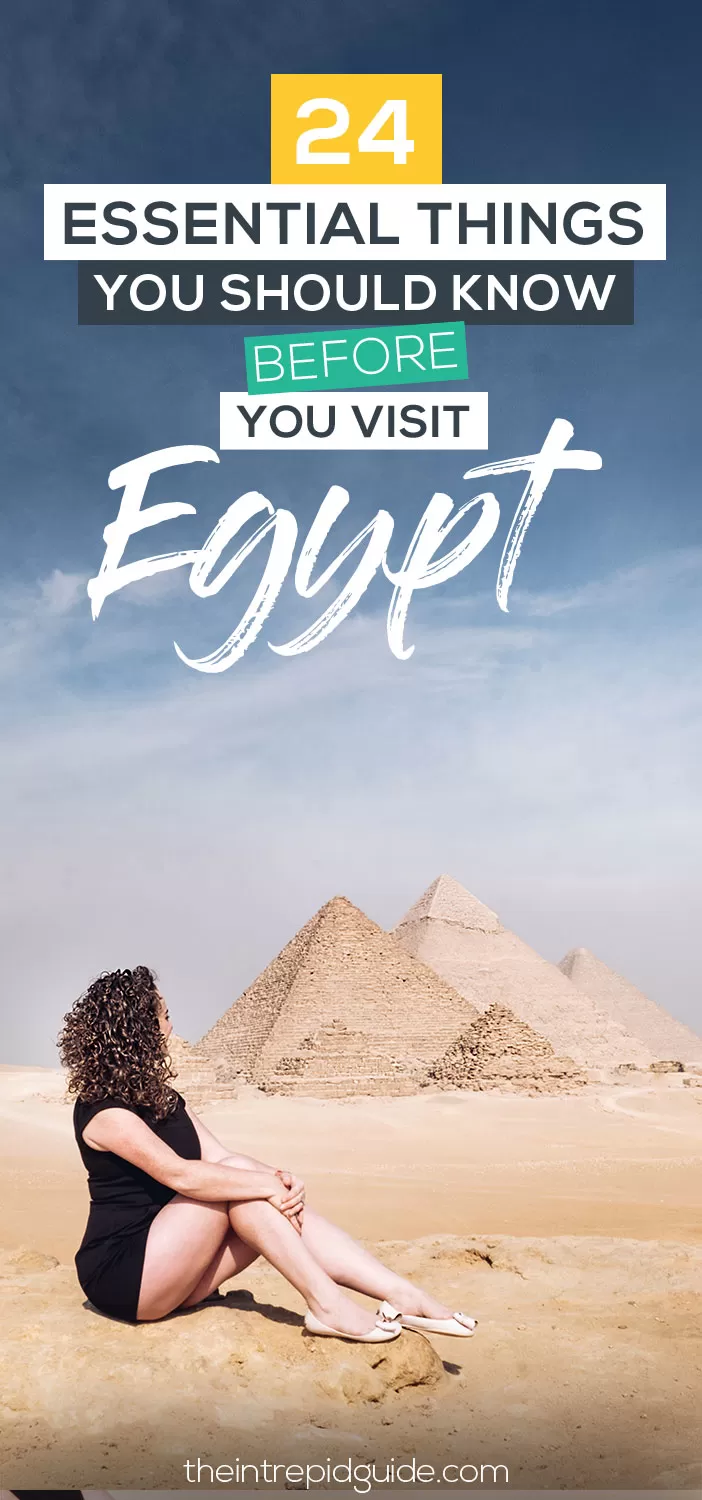
Sources Eyewitness Egypt
Over to you!
Which of these tips did you find the most useful? Is there anything you would add? Tell me below! Let me know using the comments section below or join me on social media to start a conversation.
Thanks for reading and I hope you enjoyed this post.
Like what you see? Subscribe using the form below to have all of my posts delivered directly to your email.
Michele creates language learning guides and courses for travel. What separates her from other instructors is her ability to explain complex grammar in a no-nonsense, straightforward manner using her unique 80/20 method. Get her free guide 9 reasons you’re not fluent…YET & how to fix it! Planning a trip? Learn the local language with her 80/20 method for less than the cost of eating at a tourist trap restaurant Start learning today!
Italian Tenses: How to Use ALL 15 Verb Tenses in Italian (+ Verb Tenses Chart PDF 📚)
26 best things to do in verona, italy + where to stay, 17 comments.
Thank you so much for all the information.
Looking forward for a trip to Egypt !!
My pleasure! Have a wonderful trip :)
Hi Michele, a lovely and useful article to read! Just wanted to check with you about passport safety: was it with you at all times, or you left it in your hotel room? Also – when entering Egypt have you been questioned about what, if any medication you had with you – as some over the counter meds in Europe or US can be problematic to bring into Egypt? Thank you!
Hi Jo, thank you so much and thank you for your questions. Yes, I always carried my passport on me. In fact, I do this wherever I travel. I would also ensure you have a photocopy in your luggage and a copy saved on your phone or on the cloud as an extra safety measure. When it comes to medication, I would email the airport directly for any questions you have. I was worried when flying from London to NY after I had heard that you can’t take a certain quantity of protein powder in your luggage. I emailed US customs and they said it was ok. I also kept a copy of that email on me and on my phone and was ready to show the customs officers on arrival if I had any issues. This is good practice as the problem with customs is that it’s sometimes open to interpretation and depends on how the officers feel on the day. I hope this helps :) Have a wonderful trip!
Where do you recommend converting US $$ to LE and what volume of notes should I get to handle all the tipping. If at airport, is this best done before the border/customs or after? Thanks!
Hi David, before arriving, I ordered some USD so I would have enough to pay for my visa on arrival and have some money for incidentals. I had heard that they accept both USD and Egyptian Pounds at the airport. The tour company I travelled with had a guide on the ground who helped me through this process and I knew I need 100USD to pay for the visa. The rest of the time I used Egyptian Pounds. There is no tipping culture like the USA, so you can tip if you like but it’s not always necessary.
Hi David, before arriving, I ordered some USD so I would have enough to pay for my visa on arrival and have some money for incidentals. I had heard that they accept both USD and Egyptian Pounds at the airport. The tour company I travelled with had a guide on the ground who helped me through this process and I knew I need 100USD to pay for the visa. The rest of the time I used Egyptian Pounds. There is no tipping culture like the USA, so you can tip if you like but it’s not always necessary.
Hi, I have read and re-read this several times. Thank you. I’m going with a friend to Egypt early March and want to go on organised trips but I’m disabled and can only walk very slowly. In other countries I’ve just let the group go ahead and done my own thing then joined back at the coach. Is this a good idea in Egypt or can I hire an electric mobility scooter while there.
Hi Gabrielle, I’m not 100% sure how this works and it will vary depending on the accessibility of the group tour company. I would reach out to them directly for advice before booking. Best of luck and I hope it works out :)
Hello, thank you for your honesty. I enjoyed reading all of your tips. I am considering going in February from the 19th to the 24th. Do you think this is enough time to see everything you saw?
Hi Caroline, I went on a Top Deck tour, this is the best way to ensure you that we see everything and safely too. I highly recommend it. You can see the tour I did here http://bit.ly/EgyptExpressTour
Great info! Where did you take your photos??? THEY. ARE. FABULOUS.
Thank you SO much, Naomi. I took them during my Top Deck tour around Egypt . I highly recommend it! :)
This has been helpful and has eased my mind about travelling to Egypt. Going in a tour group, can’t wait ! :D
I’m so happy to hear that. You’re very welcome, Jacinda :)
Thank you so much for such a wonderful article, I can’t wait to land egypt.
Thank you so much, Priya :)
Leave a Comment Cancel Reply
Save my name, email, and website in this browser for the next time I comment.
This site uses Akismet to reduce spam. Learn how your comment data is processed .

If you don't know where you are , how do you know where you're going? Find out how well you know Italian grammar today!
Egypt Travel Guides

Explore a destination in Egypt to see the top hotels and top things to do, as well as photos and tips from U.S. News Travel.
All Egypt Travel Guides
If you make a purchase from our site, we may earn a commission. This does not affect the quality or independence of our editorial content.
You are using an outdated browser. Upgrade your browser today or install Google Chrome Frame to better experience this site.
Egypt Traveler View
Travel health notices, vaccines and medicines, non-vaccine-preventable diseases, stay healthy and safe.
- Packing List
After Your Trip
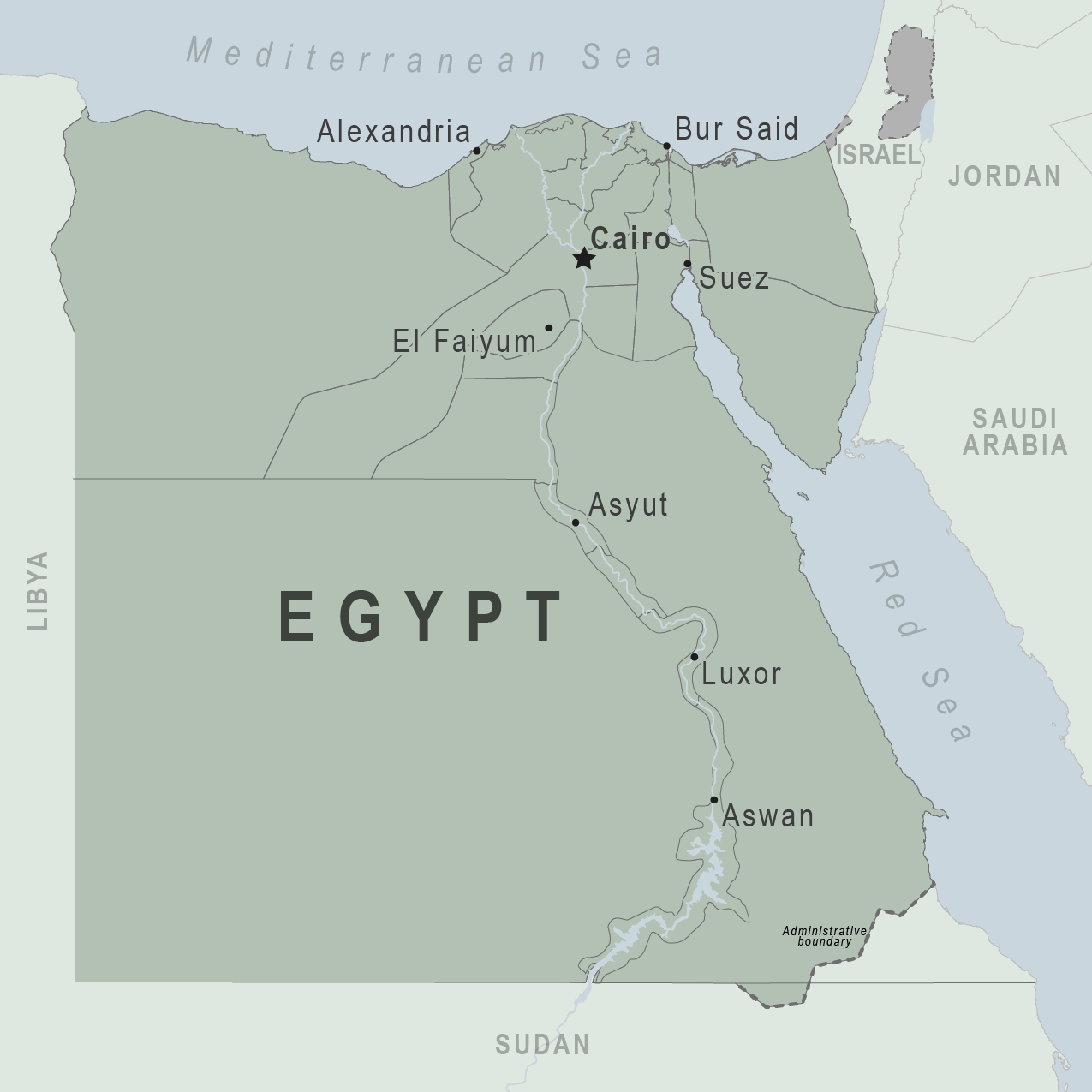
Be aware of current health issues in Egypt. Learn how to protect yourself.
Level 2 Practice Enhanced Precautions
- Updated Global Polio August 20, 2024 Some international destinations have circulating poliovirus. Before any international travel, make sure you are up to date on your polio vaccines. Destination List: Afghanistan, Algeria, Angola, Benin, Botswana, Burkina Faso, Burundi, Cameroon, Central African Republic, Chad, Côte d'Ivoire (Ivory Coast), Democratic Republic of the Congo, Egypt, Ethiopia, Guinea, Indonesia, Kenya, Liberia, Madagascar, Mali, Mauritania, Mozambique, Niger, Nigeria, Pakistan, Republic of South Sudan, Republic of the Congo, Senegal, Sierra Leone, Somalia, Sudan, Tanzania, including Zanzibar, The Gambia, Uganda, Yemen, Zambia, Zimbabwe
⇧ Top
Check the vaccines and medicines list and visit your doctor at least a month before your trip to get vaccines or medicines you may need. If you or your doctor need help finding a location that provides certain vaccines or medicines, visit the Find a Clinic page.
- Avoid contaminated water
Leptospirosis
How most people get sick (most common modes of transmission)
- Touching urine or other body fluids from an animal infected with leptospirosis
- Swimming or wading in urine-contaminated fresh water, or contact with urine-contaminated mud
- Drinking water or eating food contaminated with animal urine
- Avoid contaminated water and soil
- Avoid floodwater
Clinical Guidance
Schistosomiasis
- Wading, swimming, bathing, or washing in contaminated freshwater streams, rivers, ponds, lakes, or untreated pools.
Avoid bug bites
African tick-bite fever.
- Avoid Bug Bites
African Tick-bite fever
Crimean-Congo Hemorrhagic fever
- Tick bite
- Touching the body fluids of a person or animal infected with CCHF
- Mosquito bite
Leishmaniasis
- Sand fly bite
- An infected pregnant woman can spread it to her unborn baby
- Avoid animals
Rift Valley Fever
- Touching blood, body fluids, or tissue of infected livestock
Rift Valley fever
Airborne & droplet
Avian/bird flu.
- Being around, touching, or working with infected poultry, such as visiting poultry farms or live-animal markets
- Avoid domestic and wild poultry
- Breathing in air or accidentally eating food contaminated with the urine, droppings, or saliva of infected rodents
- Bite from an infected rodent
- Less commonly, being around someone sick with hantavirus (only occurs with Andes virus)
- Avoid rodents and areas where they live
- Avoid sick people
Tuberculosis (TB)
- Breathe in TB bacteria that is in the air from an infected and contagious person coughing, speaking, or singing.
Learn actions you can take to stay healthy and safe on your trip. Vaccines cannot protect you from many diseases in Egypt, so your behaviors are important.
Eat and drink safely
Food and water standards around the world vary based on the destination. Standards may also differ within a country and risk may change depending on activity type (e.g., hiking versus business trip). You can learn more about safe food and drink choices when traveling by accessing the resources below.
- Choose Safe Food and Drinks When Traveling
- Water Treatment Options When Hiking, Camping or Traveling
- Global Water, Sanitation and Hygiene (WASH)
- Avoid Contaminated Water During Travel
You can also visit the Department of State Country Information Pages for additional information about food and water safety.
Prevent bug bites
Bugs (like mosquitoes, ticks, and fleas) can spread a number of diseases in Egypt. Many of these diseases cannot be prevented with a vaccine or medicine. You can reduce your risk by taking steps to prevent bug bites.
What can I do to prevent bug bites?
- Cover exposed skin by wearing long-sleeved shirts, long pants, and hats.
- Use an appropriate insect repellent (see below).
- Use permethrin-treated clothing and gear (such as boots, pants, socks, and tents). Do not use permethrin directly on skin.
- Stay and sleep in air-conditioned or screened rooms.
- Use a bed net if the area where you are sleeping is exposed to the outdoors.
What type of insect repellent should I use?
- FOR PROTECTION AGAINST TICKS AND MOSQUITOES: Use a repellent that contains 20% or more DEET for protection that lasts up to several hours.
- Picaridin (also known as KBR 3023, Bayrepel, and icaridin)
- Oil of lemon eucalyptus (OLE) or para-menthane-diol (PMD)
- 2-undecanone
- Always use insect repellent as directed.
What should I do if I am bitten by bugs?
- Avoid scratching bug bites, and apply hydrocortisone cream or calamine lotion to reduce the itching.
- Check your entire body for ticks after outdoor activity. Be sure to remove ticks properly.
What can I do to avoid bed bugs?
Although bed bugs do not carry disease, they are an annoyance. See our information page about avoiding bug bites for some easy tips to avoid them. For more information on bed bugs, see Bed Bugs .
For more detailed information on avoiding bug bites, see Avoid Bug Bites .
Stay safe outdoors
If your travel plans in Egypt include outdoor activities, take these steps to stay safe and healthy during your trip.
- Stay alert to changing weather conditions and adjust your plans if conditions become unsafe.
- Prepare for activities by wearing the right clothes and packing protective items, such as bug spray, sunscreen, and a basic first aid kit.
- Consider learning basic first aid and CPR before travel. Bring a travel health kit with items appropriate for your activities.
- If you are outside for many hours in heat, eat salty snacks and drink water to stay hydrated and replace salt lost through sweating.
- Protect yourself from UV radiation : use sunscreen with an SPF of at least 15, wear protective clothing, and seek shade during the hottest time of day (10 a.m.–4 p.m.).
- Be especially careful during summer months and at high elevation. Because sunlight reflects off snow, sand, and water, sun exposure may be increased during activities like skiing, swimming, and sailing.
- Very cold temperatures can be dangerous. Dress in layers and cover heads, hands, and feet properly if you are visiting a cold location.
Stay safe around water
- Swim only in designated swimming areas. Obey lifeguards and warning flags on beaches.
- Practice safe boating—follow all boating safety laws, do not drink alcohol if driving a boat, and always wear a life jacket.
- Do not dive into shallow water.
- Do not swim in freshwater in developing areas or where sanitation is poor.
- Avoid swallowing water when swimming. Untreated water can carry germs that make you sick.
- To prevent infections, wear shoes on beaches where there may be animal waste.
Schistosomiasis, a parasitic infection that can be spread in fresh water, is found in Egypt. Avoid swimming in fresh, unchlorinated water, such as lakes, ponds, or rivers.
Keep away from animals
Most animals avoid people, but they may attack if they feel threatened, are protecting their young or territory, or if they are injured or ill. Animal bites and scratches can lead to serious diseases such as rabies.
Follow these tips to protect yourself:
- Do not touch or feed any animals you do not know.
- Do not allow animals to lick open wounds, and do not get animal saliva in your eyes or mouth.
- Avoid rodents and their urine and feces.
- Traveling pets should be supervised closely and not allowed to come in contact with local animals.
- If you wake in a room with a bat, seek medical care immediately. Bat bites may be hard to see.
All animals can pose a threat, but be extra careful around dogs, bats, monkeys, sea animals such as jellyfish, and snakes. If you are bitten or scratched by an animal, immediately:
- Wash the wound with soap and clean water.
- Go to a doctor right away.
- Tell your doctor about your injury when you get back to the United States.
Consider buying medical evacuation insurance. Rabies is a deadly disease that must be treated quickly, and treatment may not be available in some countries.
Reduce your exposure to germs
Follow these tips to avoid getting sick or spreading illness to others while traveling:
- Wash your hands often, especially before eating.
- If soap and water aren’t available, clean hands with hand sanitizer (containing at least 60% alcohol).
- Don’t touch your eyes, nose, or mouth. If you need to touch your face, make sure your hands are clean.
- Cover your mouth and nose with a tissue or your sleeve (not your hands) when coughing or sneezing.
- Try to avoid contact with people who are sick.
- If you are sick, stay home or in your hotel room, unless you need medical care.
Avoid sharing body fluids
Diseases can be spread through body fluids, such as saliva, blood, vomit, and semen.
Protect yourself:
- Use latex condoms correctly.
- Do not inject drugs.
- Limit alcohol consumption. People take more risks when intoxicated.
- Do not share needles or any devices that can break the skin. That includes needles for tattoos, piercings, and acupuncture.
- If you receive medical or dental care, make sure the equipment is disinfected or sanitized.
Know how to get medical care while traveling
Plan for how you will get health care during your trip, should the need arise:
- Carry a list of local doctors and hospitals at your destination.
- Review your health insurance plan to determine what medical services it would cover during your trip. Consider purchasing travel health and medical evacuation insurance.
- Carry a card that identifies, in the local language, your blood type, chronic conditions or serious allergies, and the generic names of any medications you take.
- Some prescription drugs may be illegal in other countries. Call Egypt’s embassy to verify that all of your prescription(s) are legal to bring with you.
- Bring all the medicines (including over-the-counter medicines) you think you might need during your trip, including extra in case of travel delays. Ask your doctor to help you get prescriptions filled early if you need to.
Many foreign hospitals and clinics are accredited by the Joint Commission International. A list of accredited facilities is available at their website ( www.jointcommissioninternational.org ).
In some countries, medicine (prescription and over-the-counter) may be substandard or counterfeit. Bring the medicines you will need from the United States to avoid having to buy them at your destination.
Select safe transportation
Motor vehicle crashes are the #1 killer of healthy US citizens in foreign countries.
In many places cars, buses, large trucks, rickshaws, bikes, people on foot, and even animals share the same lanes of traffic, increasing the risk for crashes.
Be smart when you are traveling on foot.
- Use sidewalks and marked crosswalks.
- Pay attention to the traffic around you, especially in crowded areas.
- Remember, people on foot do not always have the right of way in other countries.
Riding/Driving
Choose a safe vehicle.
- Choose official taxis or public transportation, such as trains and buses.
- Ride only in cars that have seatbelts.
- Avoid overcrowded, overloaded, top-heavy buses and minivans.
- Avoid riding on motorcycles or motorbikes, especially motorbike taxis. (Many crashes are caused by inexperienced motorbike drivers.)
- Choose newer vehicles—they may have more safety features, such as airbags, and be more reliable.
- Choose larger vehicles, which may provide more protection in crashes.
Think about the driver.
- Do not drive after drinking alcohol or ride with someone who has been drinking.
- Consider hiring a licensed, trained driver familiar with the area.
- Arrange payment before departing.
Follow basic safety tips.
- Wear a seatbelt at all times.
- Sit in the back seat of cars and taxis.
- When on motorbikes or bicycles, always wear a helmet. (Bring a helmet from home, if needed.)
- Avoid driving at night; street lighting in certain parts of Egypt may be poor.
- Do not use a cell phone or text while driving (illegal in many countries).
- Travel during daylight hours only, especially in rural areas.
- If you choose to drive a vehicle in Egypt, learn the local traffic laws and have the proper paperwork.
- Get any driving permits and insurance you may need. Get an International Driving Permit (IDP). Carry the IDP and a US-issued driver's license at all times.
- Check with your auto insurance policy's international coverage, and get more coverage if needed. Make sure you have liability insurance.
- Avoid using local, unscheduled aircraft.
- If possible, fly on larger planes (more than 30 seats); larger airplanes are more likely to have regular safety inspections.
- Try to schedule flights during daylight hours and in good weather.
Medical Evacuation Insurance
If you are seriously injured, emergency care may not be available or may not meet US standards. Trauma care centers are uncommon outside urban areas. Having medical evacuation insurance can be helpful for these reasons.
Helpful Resources
Road Safety Overseas (Information from the US Department of State): Includes tips on driving in other countries, International Driving Permits, auto insurance, and other resources.
The Association for International Road Travel has country-specific Road Travel Reports available for most countries for a minimal fee.
Maintain personal security
Use the same common sense traveling overseas that you would at home, and always stay alert and aware of your surroundings.

Before you leave
- Research your destination(s), including local laws, customs, and culture.
- Monitor travel advisories and alerts and read travel tips from the US Department of State.
- Enroll in the Smart Traveler Enrollment Program (STEP) .
- Leave a copy of your itinerary, contact information, credit cards, and passport with someone at home.
- Pack as light as possible, and leave at home any item you could not replace.
While at your destination(s)
- Carry contact information for the nearest US embassy or consulate .
- Carry a photocopy of your passport and entry stamp; leave the actual passport securely in your hotel.
- Follow all local laws and social customs.
- Do not wear expensive clothing or jewelry.
- Always keep hotel doors locked, and store valuables in secure areas.
- If possible, choose hotel rooms between the 2nd and 6th floors.
Healthy Travel Packing List
Use the Healthy Travel Packing List for Egypt for a list of health-related items to consider packing for your trip. Talk to your doctor about which items are most important for you.
Why does CDC recommend packing these health-related items?
It’s best to be prepared to prevent and treat common illnesses and injuries. Some supplies and medicines may be difficult to find at your destination, may have different names, or may have different ingredients than what you normally use.
If you are not feeling well after your trip, you may need to see a doctor. If you need help finding a travel medicine specialist, see Find a Clinic . Be sure to tell your doctor about your travel, including where you went and what you did on your trip. Also tell your doctor if you were bitten or scratched by an animal while traveling.
For more information on what to do if you are sick after your trip, see Getting Sick after Travel .
Map Disclaimer - The boundaries and names shown and the designations used on maps do not imply the expression of any opinion whatsoever on the part of the Centers for Disease Control and Prevention concerning the legal status of any country, territory, city or area or of its authorities, or concerning the delimitation of its frontiers or boundaries. Approximate border lines for which there may not yet be full agreement are generally marked.
Other Destinations
If you need help finding travel information:
Message & data rates may apply. CDC Privacy Policy
File Formats Help:
- Adobe PDF file
- Microsoft PowerPoint file
- Microsoft Word file
- Microsoft Excel file
- Audio/Video file
- Apple Quicktime file
- RealPlayer file
- Zip Archive file
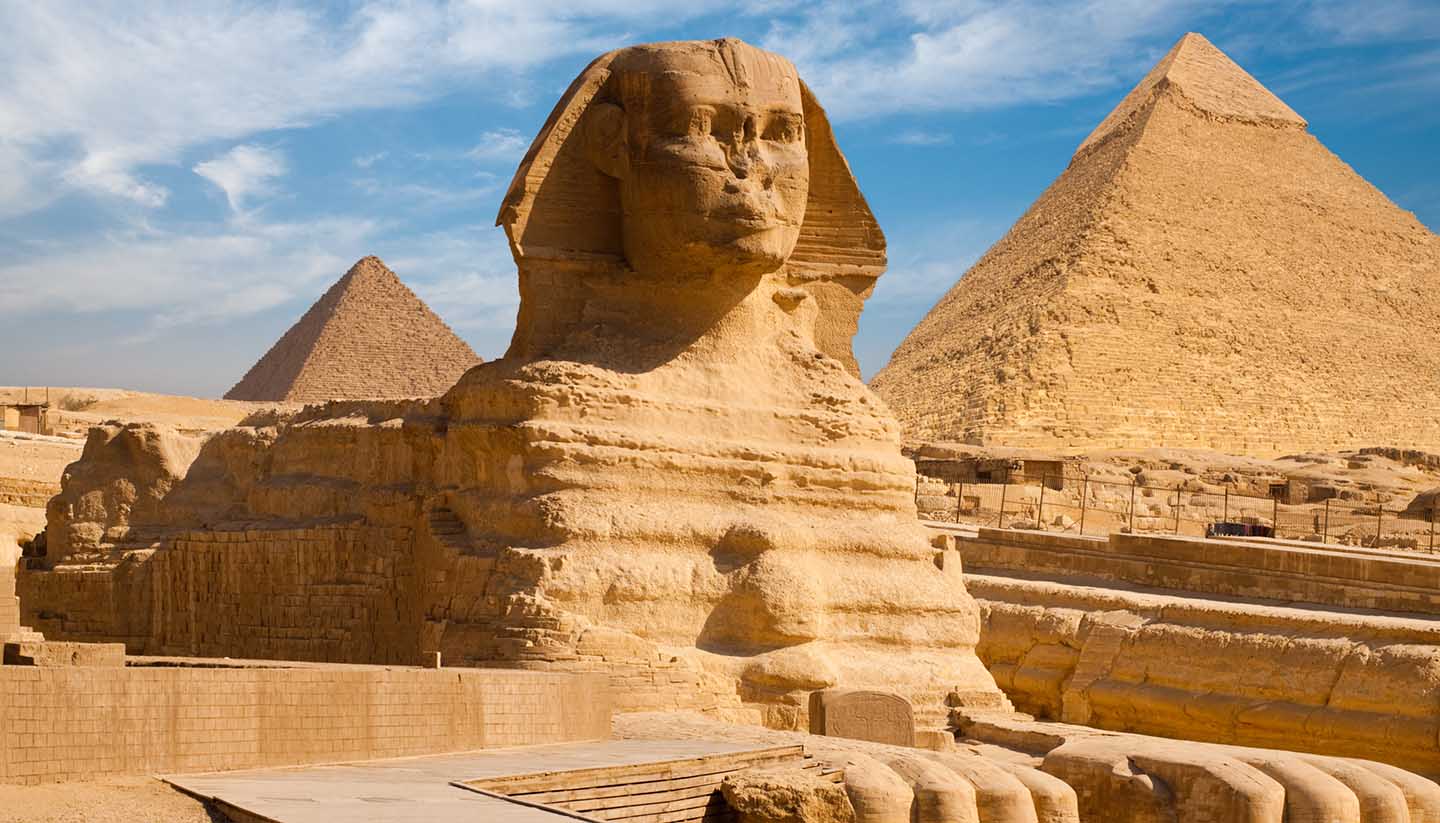
Introducing Egypt
About egypt.
- Images of Egypt
- History, language & culture
- Weather & geography
- Doing business & staying in touch
Plan your trip
- Travel to Egypt
- Where to stay
While you’re there
- Things to see & do
- Shopping & nightlife
- Food & drink
- Getting around
Before you go
- Passport & visa
- Public Holidays
- Money & duty free
Book your flights
- Cairo International Airport
- Hurghada International Airport
- Sharm el-Sheikh International Airport
- Hurghada beaches
- Sharm el-Sheikh beaches
Cruise Locations
- Sharm el Sheikh
Egypt travel guide
A complicated but fascinating country with some of the most enduring historical monuments on Earth, Egypt stands as an unforgettable travel destination. It’s had to deal with its fair share of turmoil in recent times, but this North African nation remains proud, welcoming and accessible. And with treasures as timeless as the temples and pyramids of the Nile to shout about, it’s not somewhere that’s going to slip from public consciousness any time soon. A trip here still very much has the potential to thrill.
In many ways, there are two Egypts. The first is the Egypt of Cairo and the Nile, of bustling medieval bazaars, noseless Sphinxes, river cruises and Agatha Christie-era exoticism. The second, and just as integral to many visitors, is the Egypt of the Red Sea, where a spread of large-scale modern resorts caters to sun-seekers and scuba divers. Sharm el Sheikh, with its world-class diving, high-end hotels and desert adventures, is the best known of them.
Most of the country’s ancient treasures were built during the time of the pharaohs. The Pyramids of Giza (the sole survivors of the Seven Ancient Wonders of the World); the lotus-columned temples of Luxor and Karnak; the Valley of the Kings; Aswan and the temples of Abu Simbel: strung along the Nile, these monuments have drawn visitors for centuries. They represent a lasting legacy of one of the most fabled periods of human history.
Of course, the country is best understood not so much for its great monuments or its coral reefs, splendid though they are, but through its people. Bartering for a bargain in Cairo’s ancient Khan al-Khalili bazaar, taking tea and falling into long conversation with a local, or simply stopping awhile in a remote village, silent but for the chatter of hooves on tarmac, will give a glimpse of a country full of character, colour and fortitude.
1,001,450 sq km (386,662 sq miles).
94,137,816 (UN estimate 2016).
88.4 per sq km.
Cairo (El Qahira).
President Abdel Fattah al-Sisi since 2014.
Prime Minister Mostafa Madbouli since June 2018.
Travel Advice
The Foreign, Commonwealth & Development Office ( FCDO ) provides advice about risks of travel to help British nationals make informed decisions. Find out more about FCDO travel advice .
Areas where FCDO advises against travel
Your travel insurance could be invalidated if you travel against FCDO advice. Consular support is also severely limited where FCDO advises against travel.
Egypt-Libya border
FCDO advises against all travel to within 20km of the Egypt-Libya border, except for the town of El Salloum (where we advise against all but essential travel).
North Sinai
FCDO advises against all travel to the Governorate of North Sinai.
Northern part of South Sinai
FCDO advises against all but essential travel to the northern part of the Governorate of South Sinai, beyond the St Catherine-Nuweibaa road, except for the coastal areas along the west and east of the peninsula.
The eastern part of Ismailiyah Governorate
FCDO advises against all but essential travel to the Ismailiyah Governorate east of the Suez Canal.
Western Desert
FCDO advises against all but essential travel to the area west of the Nile Valley and Nile Delta regions, except for:
- Luxor, Qina, Aswan, Abu Simbel and the Valley of the Kings
- the Governorate of Faiyum
- the coastal areas between the Nile Delta and Marsa Matruh
- the Marsa Matruh-Siwa Road
- the oasis town of Siwa
- the Giza Governorate north-east of the Bahariya Oasis
- the road between Giza and Farafra (but we advise against all but essential travel on the road between Bahariya and Siwa)
- Bahariya Oasis, Farafra, the White Desert and Black Desert
Hala’ib Triangle and Bir Tawil Trapezoid
FCDO advises against all but essential travel to the Hala’ib Triangle and the Bir Tawil Trapezoid.
Find out more about why FCDO advises against travel .
Conflict in neighbouring Israel and the Occupied Palestinian Territories (OPTs)
The Israeli government has declared a state of emergency across the whole country. International borders in Israel and the Occupied Palestinian Territories (OPTs) could close at short notice. As a result, the land border into Israel from Egypt at Taba could close with little notice. Check with local authorities and consult the travel advice for Israel and the Occupied Palestinian Territories before trying to cross the border.
In response to events in Israel and the OPTs, a number of demonstrations have taken place in Egypt and protests have been planned, including after Friday prayers. Demonstrations could take place at short notice, with a heavy security presence in place. You should avoid large gatherings, demonstrations and protests. See Safety and security
Entering Egypt from Gaza
The Rafah border crossing partially opened on 1 November. This is primarily to facilitate the evacuation of seriously wounded Palestinians and some foreign nationals. We understand that the crossing will continue to be open for controlled and time-limited periods to allow specific groups of foreign nationals, including British nationals, to cross. It is for the Egyptian and Israeli authorities to determine who is permitted to cross, and when. The Egyptian Ministry of Foreign Affairs will contact Embassies to let them know when their foreign nationals can cross. Should we receive notification from the Israeli and Egyptian authorities that individuals are permitted to cross, we will notify those people individually.
Movement to the Rafah crossing and beyond is at your own risk. You should only travel if you judge it is safe to do so. Check the Israel and The Occupied Palestinian Territories travel advice.
The Egyptian authorities have said all aid going into Gaza from Egypt must be channelled through the Egyptian Red Crescent:
- telephone: + 20 226 703 979, + 20 226 703 983
- fax: + 20 226 703 967
They are unlikely to consider requests for humanitarian access made in Egypt at short notice.
Concern for friends and family
If you are concerned about friends or family, or need consular assistance call:
- British Embassy Cairo on + 20 (0)2 2791 6000
- +44 1767 667 600 (UK number) if you experience technical difficulties with the above number
Incidents in South Sinai
On 27 October, an Egyptian Armed Forces spokesperson confirmed that an unidentified drone fell near a medical facility in the Egyptian Red Sea resort town of Taba next to the Israeli border, injuring six people. An additional unidentified drone also struck outside the town of Nuweiba, though no casualties have been confirmed. The authorities are conducting ongoing investigations.
Incident in Alexandria
On 8 October 2023, an Egyptian police officer is reported to have shot and killed two Israeli tourists and an Egyptian tour guide in Alexandria. A third tourist was injured. Remain vigilant and exercise caution at tourist and religious sites, as well as public gatherings. Find out more information on current risks on the Safety and security .
Border crossings from Sudan
There are still people trying to cross the border into Egypt at Argeen and Qustul. Our ability to provide consular assistance is very limited.
If you are a British national and have crossed the border without valid documentation, contact the British Embassy in Cairo for consular assistance on + 20 (0)2 2791 6000.
Before you travel
No travel can be guaranteed safe. Read all the advice in this guide as well as support for British nationals abroad which includes:
- advice on preparing for travel abroad and reducing risks
- information for women, LGBT+ and disabled travellers
Follow and contact FCDO travel on Twitter , Facebook and Instagram . You can also sign up to get email notifications when this advice is updated.
Travel insurance
If you choose to travel, research your destinations and get appropriate travel insurance . Insurance should cover your itinerary, planned activities and expenses in an emergency.
This advice reflects the UK government’s understanding of current rules for people travelling on a full ‘British citizen’ passport from the UK, for the most common types of travel.
The authorities in Egypt set and enforce entry rules. If you’re not sure how these requirements apply to you, contact the Consulate General for Egypt in the UK .
Passport validity requirements
Your passport must be valid for 6 months from the date you arrive. Check with your travel provider to make sure your passport and other travel documents meet their requirements. Renew your passport if you need to.
Visa requirements
British passport holders travelling to Egypt normally need a visa. Visa processing fees are non-refundable.
We advise you to get a visa before you travel, particularly if travelling for work or business. You can apply for a visa from the official Visa2Egypt portal or at your nearest Egyptian Consulate . Tourist visas granted using the e-visa system are valid for a maximum of 3 months.
The online e-visa portal (Visa2Egypt) does not currently accept applications from variant British passport holders (those from British Overseas Territories and Crown Dependencies).
All British passport holders can get a visa in advance by submitting an application in person or by post to the Egyptian Consulate in London . The specific requirements for the visa are listed on the website.
Alternatively, if you wish to get a visa on arrival, you can do so at approved bank kiosks within airport arrival halls, before reaching immigration counters. The visa fee is 25 US dollars, payable in dollars as the preferred currency, although you may also be able to pay in pounds sterling or euros. Visas granted on arrival are valid for a maximum of 30 days. There’s no need to buy a visa from an agent. In many cases agents will charge more than US$25 for a visa. If you’re harassed by an agent, report the incident to the tourist police in the airport terminal.
If you’re travelling to Sharm el Sheikh, Dahab, Nuweiba and Taba resorts for up to 15 days, you will receive a free entry permission stamp on arrival. If you intend to travel out of these areas or stay longer than 15 days, you must get a visa.
If you have travelled to one of the South Sinai Red Sea resorts, entered without a visa and your plans have changed, you can normally purchase a visa at Sharm el Sheikh airport to allow you to travel elsewhere.
Applications for visa extensions should be made at Egyptian Passport and Immigration Offices. You may have difficulties leaving Egypt with an out of date visa. You will normally have to pay a fine if your visa is out of date by more than 14 days.
For further information and enquiries, contact the Egyptian Consulate in London .
Visa extensions
Apply for visa extensions at the Egyptian Passport and Immigration Offices. You may face difficulties if you try to leave Egypt on an expired visa. You may be fined if your visa has expired by more than 14 days.
Contact the Egyptian Consulate in London for more information.
Visas at the Egypt-Sudan Border Crossing
If you’re crossing the border from Sudan, the Egyptian authorities have advised it is still possible to get a visa on arrival for the regular cost of 25 US dollars.
HIV test for work permits
You will need to show your result from a HIV test to apply for a work permit.
Vaccination requirements
At least 8 weeks before your trip, check the vaccinations and certificates you need on TravelHealthPro’s Egypt guide . Depending on the country you’re arriving from, this may include a yellow fever vaccination certificate.
Customs rules
There are strict rules about goods that can be brought into and taken out of Egypt . You must declare anything that may be prohibited or subject to tax or duty.
You’re allowed to bring in or take out up to 5,000 Egyptian pounds. There is no limit to the amount of hard currency that you can bring in, but you must declare it when you arrive if it’s worth more than 10,000 US dollars.
You must also declare certain valuables, including electrical equipment or video cameras, when you arrive. These will be noted in your passport. You may be asked to show these items again when you leave the country. If you do not have them on you, you may have to pay a high rate of customs duty.
Officials are likely to confiscate satellite phones or radio communications equipment unless you have prior clearance from the Ministry of Telecommunications.
Contact the Egyptian embassy in your country of residence for further information on customs requirements
You should also read FCDO ’s overall travel advice and regional risks advice .
There is a high threat of terrorist attack globally affecting UK interests and British nationals, including from groups and individuals who view the UK and British nationals as targets. You should remain vigilant at all times.
UK Counter Terrorism Policing has information and advice on staying safe abroad and what to do in the event of a terrorist attack. Find out more about the global threat from terrorism .
Terrorism in Egypt
Terrorists are very likely to try to carry out attacks in Egypt.
Terrorism is a risk across Egypt, particularly in North Sinai. Attacks could be indiscriminate. Targets might include:
- Egyptian security forces
- religious sites
- large public gatherings
- places visited by foreigners
The authorities in Egypt have a significant security presence across the country, including armed security officers at important sites, critical infrastructure and road checkpoints. Extra measures are in place at tourist sites. Recent attacks include:
- in 2022, an attack to the west of the Suez Canal targeting security forces within the city of Ismailiyah
- in 2019, at least 20 people killed by a car bomb in Central Cairo’s Manial district
- in 2019, at least 16 people injured after an IED attack on a tourist bus near the Giza pyramids
- in 2019, 3 security personnel killed by a suicide bomber in Central Cairo’s Darb al-ahmar district
- in 2018, a roadside blast killed 4 people on a bus near the Giza pyramids
- in 2018, gunmen opened fire on a bus carrying Coptic Christians in Minya province killing 7 people. Daesh (formally ISIL) claimed responsibility for the attack
Terrorism during holiday periods
There is a heightened threat of terrorism in and around religious sites and during religious festivals, such as the month of Ramadan and the Christmas period (including Coptic Christmas in January). Terrorist attacks have occurred over local holiday weekends. See a list of public holidays on the Egyptian Presidency website .
You should:
- follow the advice of Egyptian authorities
- be vigilant in crowds and large gatherings
Airports and airlines
Terrorists in Egypt have the intent and capability to target airport buildings and planes.
The main threat is on the North Sinai Peninsula where Daesh operate with greater freedom, but terrorists are active throughout Egypt.
Co-operate fully with security officials at airports and pay attention to security measures on flights from Egypt to the UK.
Terrorist kidnap
There is a threat of kidnapping by groups operating in North Africa, particularly from Libya and groups originating in the Sahel. This includes Al Qaeda and Daesh-affiliated groups, who may travel across the region’s porous border. There is a heightened risk of kidnap in border and remote desert areas of North Africa. Terrorist groups have taken foreigners, government officials and civilians hostage for financial gain and for political leverage. Further kidnappings are likely.
British nationals are viewed as legitimate targets, including those engaged in tourism, humanitarian aid work, journalism or business sectors. If you are kidnapped, the reason for your presence is unlikely to serve as a protection or secure your safe release.
The long-standing policy of the British government is not to make substantive concessions to hostage takers. The British government considers that paying ransoms and releasing prisoners builds the capability of terrorist groups and finances their activities. This can, in turn, increase the risk of further hostage-taking. The Terrorism Act (2000) makes payments to terrorists illegal.
Military activity in the Red Sea area
Military activity is currently underway in response to attempts by Houthi militants to prevent movement of international shipping in the Red Sea. While the area of activity is limited to the Red Sea and Yemen, there is a possibility that Travel Advice for nearby countries could change at short notice. You should continue to monitor Travel Advice and follow any relevant instructions from local authorities.
Political situation
Since 2011 there has been significant political turmoil. The political environment remains restrictive. There have been violent protests and disturbances, resulting in a number of deaths.
Protests, marches and demonstrations occur across Egypt, particularly in cities. Avoid protests, marches or demonstrations as the situation could change quickly and without warning. Police have used water cannons, tear gas, birdshot and live ammunition as crowd control.
The authorities may close public spaces, including parks and beaches, at short notice, particularly around the holidays. Follow the guidance of the local authorities. You could be fined or arrested if you do not do as you are told.
Foreigners involved in any political activity or activities critical of the government may be at risk of detention or other measures.
There are reports that personal electronic devices are being checked by security personnel, particularly around places of public gathering, such as Tahrir Square.
The crime rate is generally low, but visitors have reported armed robberies, muggings (including in taxis), sexual assaults, and break-ins to accommodation and cars. Take extra care when travelling alone, particularly at night, in taxis and microbuses.
If you want to report a crime, contact the tourist police on 126. If you do not report a crime before you leave, it will be difficult to ask for a prosecution at a later date.
Sexual assaults and harassment
There are a number of sexual assaults reported to the British Embassy, including cases involving minors.
The majority of cases that have been reported took place in tourist resorts in the Red Sea region, often committed by someone the victim had already met, including hotel workers and excursion staff. There have also been reports of hotel staff discouraging incidents being reported to local police.
Female travellers should exercise caution when travelling alone, particularly at night, in buses, taxis and microbuses. If you are travelling on public transport including microbuses, avoid being the last passenger left on board.
Take extra precautions, including:
make sure children and young people are always accompanied by known and trusted people and not left alone with hotel or excursion staff
don’t allow hotel staff to enter your room when you are alone. Try to ensure a friend or relative is present
avoid travelling in a taxi alone. If this isn’t possible, apply extra security to your trip by sharing the details of your driver and trip with a friend, and using live location on WhatsApp
use reputable providers for any services and excursions, and carry out research beforehand, including by consulting your tour operator where you have one
avoid sharing personal contact or social media details
You may also want to read:
advice for women travelling abroad
information for British nationals affected by rape or sexual assault abroad
If you experience sexual harassment or assault, or anything you see doesn’t feel right, report it to the hotel or local authorities - Tourist Police on 126 and contact the British Embassy at +20 2 279 160 00 as soon as possible for advice and support. Or, you can call the local Police on 122. Both numbers provide English speakers.
Protecting your belongings
Keep a copy of your passport, visa and flight ticket separately from originals when travelling. Leave copies at home where others can access them, and also store them electronically so you can access them easily. If your passport is lost or stolen, tell the police immediately and get a police report.
Take particular care of your possessions on buses, trains and in crowds. Criminals may ride past on bikes and snatch valuables.
Be cautious in tourist areas, where scammers and touts target foreigners.
Staying safe at tourist sites
Tourists at popular tourist sites, such as the Giza Pyramids, may be confronted aggressively for money or business, even while travelling by car or taxi. Visitors using a pre-booked guide, or taking an organised tour to visit the Giza Pyramids, are likely to face fewer difficulties.
Laws and cultural differences
Egypt is predominantly an Islamic country. It is illegal to encourage conversion to the Christian faith.
Respect local traditions, customs, laws and religions at all times. Make sure your actions do not cause offence, especially during Ramadan or when you visit religious areas.
Dress modestly, especially in rural areas, mosques and souqs (markets). Public displays of affection are frowned on. What may be acceptable in the tourist resort areas may not be in other areas.
Ramadan is a holy month for Muslims. Ramadan in Egypt in 2024 will likely begin in March and end in April and will last for 30 days. Get more advice when you arrive from your tour guide, hotel or business contacts.
You should also:
- check opening hours of shops and restaurants
- be aware that if hotels and restaurants are providing food or drink in fasting hours, they may separate you from Islamic guests, for example with screens
- follow local dress codes – clothing that does not meet local dress codes may cause more offence at this time
- be aware that driving may be erratic, particularly when people are trying to get home at dusk
- be patient and show tolerance
Personal ID
Police regularly carry out ID checks. Keep valid photo ID with you at all times.
Alcohol laws and bans
Drinking alcohol anywhere other than a licensed restaurant or bar is illegal and can lead to arrest.
Illegal drugs and prison sentences
Possession, use or trafficking of illegal drugs is a serious offence and can, even for small amounts, lead to lengthy prison sentences (25 years), life imprisonment or the death penalty. Those sentenced to life imprisonment on drugs charges will normally spend the rest of their life in prison with no possibility of parole or pardon.
Khat is illegal in Egypt.
Criticising the Egyptian government
Making political or negative comments about the Egyptian government, including about the President or security forces, can cause trouble with the authorities. People have faced prison sentences for making insulting comments on social media.
Restrictions on photography
You need a permit for professional photography or film equipment. This includes photography umbrellas, artificial outdoor lighting gear, and any equipment that occupies or blocks public roads.
You are not allowed to take or share photographs that could be considered damaging to the country’s image. You can only take photographs of Egyptian citizens can if you have their written permission. Do not photograph officials without their consent. Taking pictures of children is not allowed.
Photography of, or near, military property is strictly banned. This includes the Suez Canal. There are sensitivities about taking photographs of embassies, government buildings, churches and religious buildings. British nationals have been arrested for photographing churches, electricity stations, train stations and bridges. If you are in any doubt, get permission before taking photographs.
Do not use radio controlled helicopters or ‘drones’ to take photographs.
The import, production or use of drones is banned in Egypt unless you have prior authorisation from the Egyptian Ministry of Defence . Anyone who uses or imports drones without authorisation could be sent to prison for up to 7 years or fined 5,000 to 50,000 Egyptian pounds.
LGBT+ travellers
Same-sex sexual activity is not explicitly criminalised in Egypt, but LGBT+ people have been prosecuted under the law of ‘debauchery’. People have been arrested for flying rainbow flags at public events on debauchery charges.
There is little public acceptance of homosexuality in Egypt. Public expressions of homosexuality or displays of affection between same-sex couples are likely to get negative attention. See our information and advice page for the LGBT+ community before you travel.
Be cautious about sharing content or having discussions of a sexual nature on social media, especially about sexual acts that are considered illegal. Some travellers have been arrested and imprisoned for this.
Children and young people
Egyptian family law is very different from UK law, particularly around child custody. See FCDO guidance for those affected by international parental child abduction and how to get assistance.
Outdoor activities and adventure tourism
Insurance for adventure activities.
Make sure your travel insurance, or the tour or dive company, covers the costs for any air or sea rescue. The current fee can exceed 4,000 US dollars per hour. The Egyptian authorities will only undertake rescue operations when there’s a guarantee of payment. Book excursions for activities at your resort or through approved agents or tour operators.
See FCDO travel insurance guidance for more information on travel insurance.
Hot air balloons
Some UK tour operators have not been able to verify the safety standards for balloon flight operators and have stopped selling balloon flights. There have been a number of injuries and fatal accidents. Speak to your tour company before booking.
Diving and snorkelling
Safety standards of diving operators in Red Sea resorts vary considerably. Never dive or snorkel unaccompanied. Where possible make bookings through your tour representative. Very cheap operators may not provide adequate safety and insurance standards. Diving beyond the depth limit of your insurance policy will invalidate your cover.
Shark attacks are rare, but there have been a number involving tourists in the Red Sea region. Monitor any updates from local authorities or your tour operator.
Quad bikes and desert visits
There have been several serious quad bike accidents involving British nationals in resort areas. Take the same precautions as you would in the UK. Safety standards can vary considerably. Always wear a crash helmet.
There is a small risk from unexploded landmines in some desert areas, including:
- in the north west of Egypt near to Alamein
- on some limited stretches of the Mediterranean coast near Marsa Matrouh
- on the Red Sea coast south of Suez
Dangerous areas are usually well marked with signs and barbed wire fencing. Take care and follow local advice, especially if planning trips off marked roads.
Transport risks
Road travel.
If you are planning to drive in Egypt, see information on driving abroad .
You can drive in Egypt on an International Driving Permit for up to 6 months. If you intend to stay in Egypt for a longer period you must apply for an Egyptian driving licence.
You may not be allowed to import a vehicle into Egypt. If you want to bring in a vehicle temporarily, you will need a ‘carnet de passage’ from the Automobile Association.
Accidents are common because of poor road conditions, dangerous driving and poor enforcement of traffic laws. Do not drive outside main cities and resorts at night. Make sure you have adequate insurance.
If you’re travelling off-road, employ a qualified guide and get a permit from the Ministry of Interior.
You must wear a seatbelt in the front of a vehicle.
Rail and bus travel
There have been serious bus crashes in recent years with large numbers of fatalities, including tourists.
There have also been fatal train collisions and derailments.
Suspect devices have been found at train stations and on the rail network. Although some have been hoaxes or false alarms you should be vigilant.
River and sea travel
Overcrowding and poor safety standards have led to several accidents on Red Sea ferries and Nile cruisers.
This section has safety advice for regions of Egypt. It only covers regions where FCDO has specific advice.
You should also read FCDO ’s overall travel advice and safety and security advice .
Egypt-Libya Border
FCDO advises against all travel to within 20km of the Egyptian-Libyan border, due to active military operations that target criminal activity, except for the border town of El Salloum (where we advise against all but essential travel).
FCDO advises against all travel to the Governorate of North Sinai, due to continuing criminal activity and terrorist attacks on police and security forces that have resulted in deaths.
There are frequent reports of terrorist attacks in North Sinai. Most attacks are in the northeast corner of the governorate between Al-Arish city and the border with Gaza, but the whole of the North Sinai Governorate is at risk. A state of emergency in North Sinai is in effect and a curfew is in place.
Most attacks in North Sinai are against the Egyptian government and military installations and personnel. However attacks have been carried out against civilians suspected of working with the authorities and local religious minority groups.
The northern part of South Sinai
If you plan to travel in a 4x4 vehicle from mainland Egypt through the Suez crossing, you need a permit from the Travel Permits Department of the Egyptian Ministry of the Interior. You should book any activities outside of resort areas through approved agents or tour operators.
Additional security measures are in place to protect the resorts of Sharm el Sheikh, Hurghada and Marsa Alam and other tourist areas on the Red Sea. Security forces carry out routine security checks on vehicles and at airports. These are in the southern part of the Sinai Peninsula and further south. These areas do not have a travel advice warning.
Ismailiyah Governorate
FCDO advises against all but essential travel to the eastern part of the Ismailiyah Governorate east of the Suez Canal due to ongoing military operations against terrorists and criminals. Egyptian authorities at checkpoints may prevent onward travel to this region.
FCDO advises against all but essential travel to the area west of the Nile Valley and Nile Delta regions, except for:
Tourists who enter the Western Desert areas of Bahariya Oasis, Farafra, the White Desert and Black Desert must apply for permits in advance and use an official guide. There is limited phone reception and poor medical facilities. Monitor travel advice and follow guidance from official guides and local authorities.
The FCDO advises against all but essential travel on the road between Al Bawiti and Siwa, including the desert areas near the start of the road in Bahariya. The road is closed and there are military checkpoints.
If you travel to the south west corner of Egypt near the border with Sudan or Libya you will need a permit from the Travel Permits Department of the Egyptian Ministry of the Interior . Bandits and armed groups operate in these areas.
Act with extreme caution in all border areas.
The FCDO advises against all but essential travel to the Hala’ib Triangle and Bir Tawil Trapezoid.
The Hala’ib Triangle remains disputed territory between Egypt and Sudan. If you’re in the Hala’ib Triangle and need urgent consular assistance, you should contact the British Embassy Cairo .
The Bir Tawil Trapezoid is unclaimed by either Egypt or Sudan. If you’re in this area and need urgent consular assistance, contact the British Embassy in the country you last travelled through (either the British Embassy Cairo or the British Embassy Khartoum .
Egypt-Sudan border
There are large numbers of people trying to cross the border into Egypt. There are 2 main land border crossings between Egypt and Sudan - Qustul and Argeen. The nearest town in Sudan to the crossings is Wadi Halfa (30km from border).
Travel in and from Sudan is taken at your own risk. There is almost no infrastructure at these border crossings. People are waiting several days to cross the border, with very limited access to food and water. The British Embassy in Egypt does not have staff at the border. Our ability to provide consular assistance is very limited.
If you are a British national planning to cross into Egypt at Argeen or Qustul, and you do not have valid documentation with you, contact the British Embassy in Cairo on + 20 (0)2 2791 6000.
If you are have crossed the border into Egypt, and need consular assistance, contact the British Embassy in Cairo on + 20 (0)2 2791 6000.
Read FCDO ’s Sudan travel advice .
If you are in Egypt and need consular assistance, such as an emergency travel document, contact the British Embassy in Cairo on + 20 (0)2 2791 6000.
Before you travel check that:
- your destination can provide the healthcare you may need
- you have appropriate travel insurance for local treatment or unexpected medical evacuation
This is particularly important if you have a health condition or are pregnant.
Emergency medical number
Dial 123 and ask for an ambulance.
Contact your insurance or medical assistance company promptly if you’re referred to a medical facility for treatment.
Vaccinations and health risks
At least 8 weeks before your trip check:
the latest information on vaccinations and health risks in TravelHealthPro’s Egypt guide
where to get vaccines and whether you have to pay on the NHS travel vaccinations page
The legal status and regulation of some medicines prescribed or bought in the UK can be different in other countries.
Read best practice when travelling with medicines on TravelHealthPro .
The NHS has information on whether you can take your medicine abroad .
Some prescribed and over-the-counter medicines may be controlled substances in Egypt. You may need permission from Egypt’s Ministry of Health before you arrive. If you do not have prior permission or the required documentation, the medication will not be allowed in and you may be prosecuted under Egyptian law.
If you’re travelling with prescription medication, carry a letter from your GP that specifies:
- your condition
- the quantity of medication you will be carrying
- that the medication is for your personal use only
For further information, contact the Egyptian Embassy in London.
Healthcare facilities in Egypt
FCDO has a list of English speaking doctors in Egypt .
Some hotel doctors have overcharged for treatment and medicines. Review your bill closely for excessive charges. Pharmacies outside hotels will often supply medication at lower prices.
Access to specialised treatment for psychiatric illness is limited and may not be available outside major cities.
Travel and mental health
Read FCDO guidance on travel and mental health . There is also mental health guidance on TravelHealthPro .
The Foreign, Commonwealth & Development Office ( FCDO ) cannot provide tailored advice for individual trips. Read this travel advice and carry out your own research before deciding whether to travel.
Emergency services in Egypt
Ambulance: 123
Police: 122
Contact your travel provider and insurer
Contact your travel provider and your insurer if you are involved in a serious incident or emergency abroad. They will tell you if they can help and what you need to do.
Refunds and changes to travel
For refunds or changes to travel, contact your travel provider. You may also be able to make a claim through insurance. However, insurers usually require you to talk to your travel provider first.
Find out more about changing or cancelling travel plans , including:
- where to get advice if you are in a dispute with a provider
- how to access previous versions of travel advice to support a claim
Support from FCDO
FCDO has guidance on staying safe and what to do if you need help or support abroad, including:
- finding English-speaking lawyers , funeral directors and translators and interpreters in Egypt
- dealing with a death in Egypt
- being arrested in Egypt
- getting help if you’re a victim of crime
- what to do if you’re in hospital
- if you are affected by a crisis , such as a terrorist attack
Contacting FCDO
Follow and contact FCDO travel on Twitter , Facebook and Instagram . You can also sign up to get email notifications when this travel advice is updated.
You can also contact FCDO online
Help abroad in an emergency
If you are abroad and you need emergency help from the UK government, contact the nearest British embassy, consulate or high commission .
FCDO in London
You can call FCDO in London if you need urgent help because something has happened to a friend or relative abroad.
Telephone: 020 7008 5000 (24 hours)
Find out about call charges
Risk information for British companies
The Overseas Business Risk service offers information and advice for British companies operating overseas on how to manage political, economic, and business security-related risks.

Related Articles
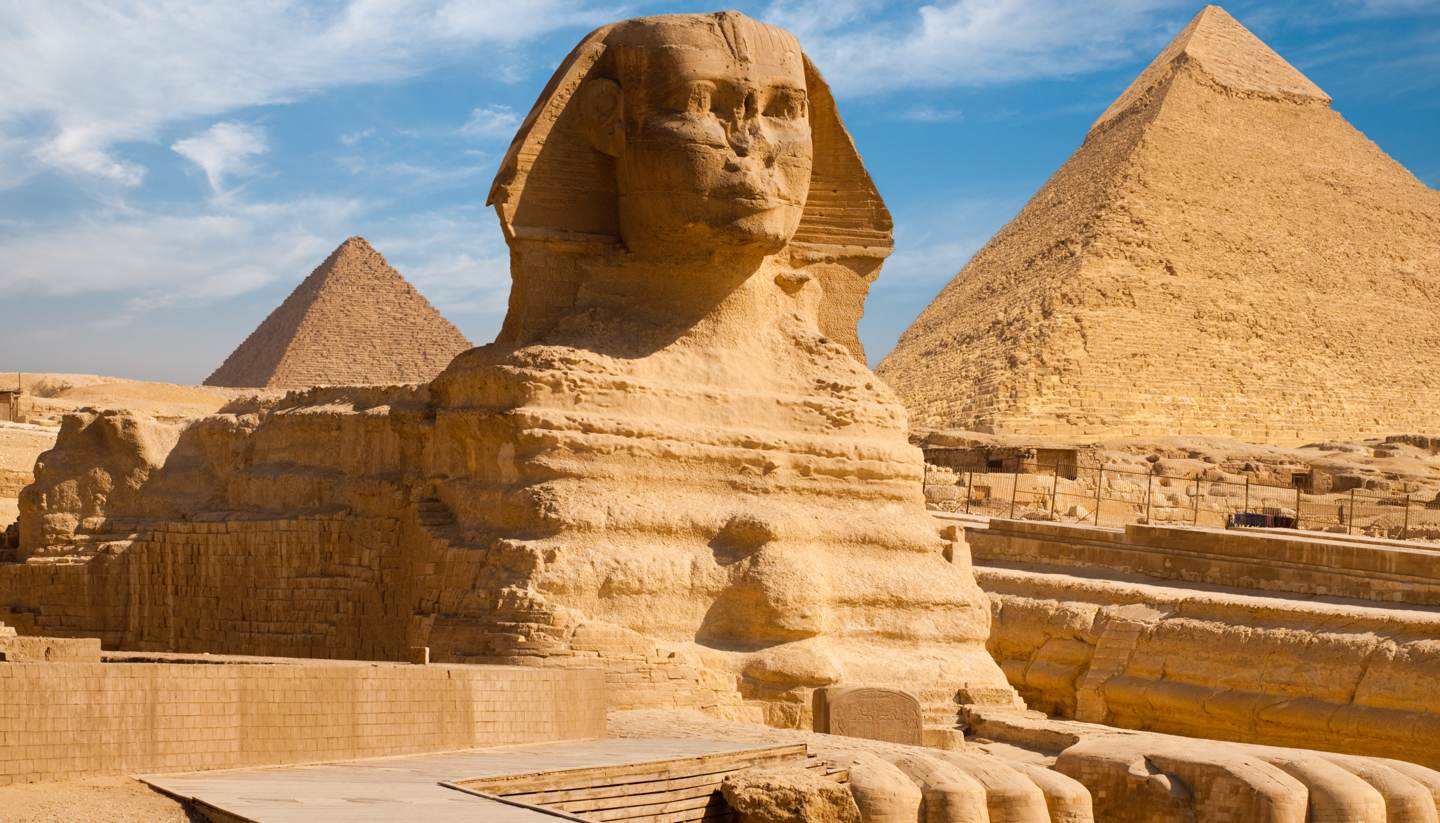
City Highlight: Cairo
Amid ancient monuments, 19th century splendour and the buzz of modern technology, Cairo, Egypt’s capital, roars with life
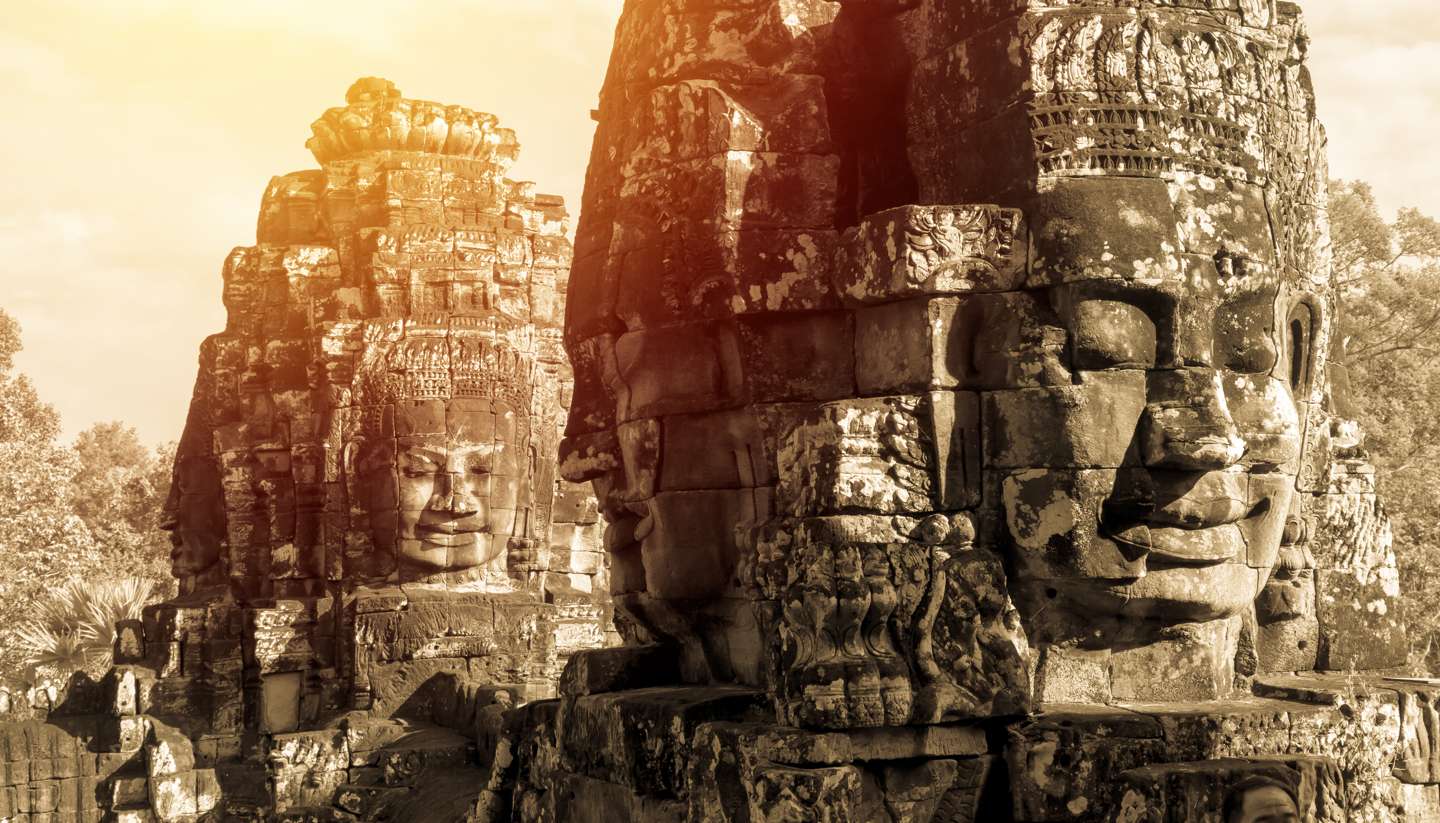
13 of the best lost cities
Determined archaeologists have helped to uncover ancient lost cities and put them on the map again, and here are our top picks
Book a Hotel
© Columbus Travel Media Ltd. All rights reserved 2024
Security Alert May 17, 2024
Worldwide caution.
- Travel Advisories |
- Contact Us |
- MyTravelGov |
Find U.S. Embassies & Consulates
Travel.state.gov, congressional liaison, special issuance agency, u.s. passports, international travel, intercountry adoption, international parental child abduction, records and authentications, popular links, travel advisories, mytravelgov, stay connected, legal resources, legal information, info for u.s. law enforcement, replace or certify documents.
Share this page:
Learn about your destination
Take 90 seconds for safer travel.
Travel Advisory Levels
Enroll in step.

Subscribe to get up-to-date safety and security information and help us reach you in an emergency abroad.
Recommended Web Browsers: Microsoft Edge or Google Chrome.
External Link
You are about to leave travel.state.gov for an external website that is not maintained by the U.S. Department of State.
Links to external websites are provided as a convenience and should not be construed as an endorsement by the U.S. Department of State of the views or products contained therein. If you wish to remain on travel.state.gov, click the "cancel" message.
You are about to visit:
We’re sorry, this site is currently experiencing technical difficulties. Please try again in a few moments. Exception: request blocked
- Today's news
- Reviews and deals
- Climate change
- 2024 election
- Newsletters
- Fall allergies
- Health news
- Mental health
- Sexual health
- Family health
- So mini ways
- Unapologetically
- Buying guides
Entertainment
- How to Watch
- My watchlist
- Stock market
- Biden economy
- Personal finance
- Stocks: most active
- Stocks: gainers
- Stocks: losers
- Trending tickers
- World indices
- US Treasury bonds
- Top mutual funds
- Highest open interest
- Highest implied volatility
- Currency converter
- Basic materials
- Communication services
- Consumer cyclical
- Consumer defensive
- Financial services
- Industrials
- Real estate
- Mutual funds
- Credit cards
- Balance transfer cards
- Cash back cards
- Rewards cards
- Travel cards
- Online checking
- High-yield savings
- Money market
- Home equity loan
- Personal loans
- Student loans
- Options pit
- Fantasy football
- Pro Pick 'Em
- College Pick 'Em
- Fantasy baseball
- Fantasy hockey
- Fantasy basketball
- Download the app
- Daily fantasy
- Scores and schedules
- GameChannel
- World Baseball Classic
- Premier League
- CONCACAF League
- Champions League
- Motorsports
- Horse racing
New on Yahoo
- Privacy Dashboard
Egypt warns visiting US general on Lebanon risk
CAIRO (Reuters) - Egyptian President Abdel Fattah al-Sisi warned America's top general during a meeting on Sunday of the dangers of a major conflict in Lebanon.
U.S. Air Force General C.Q. Brown, chairman of the Joint Chiefs of Staff, arrived in Egypt hours after a significant missile exchange between Israel and Lebanese Hezbollah.
Hezbollah launched hundreds of rockets and drones at Israel and Israel said it struck Lebanon with about 100 jets to thwart a bigger attack, in one of the largest clashes in more than 10 months of border warfare.
In a statement, Sisi's office said the Egyptian leader told Brown that the international community needed to "exert all efforts and intensify pressures to defuse tension and stop the state of escalation that threatens the security and stability of the entire region."
"(Sisi warned) in this regard of the dangers of opening a new front in Lebanon, and stressing the need to preserve Lebanon's stability and sovereignty," the statement read.
Brown did not make public remarks during his visit, on which he also met the defence minister and the country's chief of defense.
In remarks to Reuters prior to arriving in the region on Saturday, Brown said he aimed to discuss ways to avoid any new escalation in tensions that could spiral into a broader conflict.
Brown’s spokesperson said the U.S. general discussed ways "to deter the conflict from broadening" during the meetings.
Prior to his Egypt trip, Brown met Jordan's Chairman of the Joint Chiefs Maj. Gen. Yousef Al-Huneiti in Amman.
In a statement, Brown's spokesperson said the two military leaders discussed "regional tensions and efforts to deescalate them."
They also discussed "the urgency of bringing the Gaza ceasefire and hostage release deal to closure," the statement said.
Negotiators have been meeting in Cairo trying to clinch a still-elusive Gaza ceasefire-for-hostages deal between Israel and Palestinian militant group Hamas.
U.S. President Joe Biden's administration has been seeking to limit the fallout from the war in Gaza between Hamas and Israel, now in its 11th month. The conflict has levelled huge swathes of Gaza, triggered border clashes between Israel and Lebanon's Iranian-backed Hezbollah movement and sparked attacks by Yemen's Houthis on Red Sea shipping.
Meanwhile, U.S. troops have been attacked by Iran-aligned militia in Syria, Iraq and Jordan.
In recent weeks, the U.S. military has been bolstering its forces in the Middle East to guard against major new attacks by Iran or its allies, sending the Abraham Lincoln aircraft carrier strike group into the region to replace the Theodore Roosevelt carrier strike group.
The United States has also sent an Air Force F-22 Raptor squadron into the region and deployed a cruise missile submarine.
Beyond the dangers of a major escalation between Israel and Lebanon, U.S. officials are keeping a close eye out for any military moves by Iran.
Iran has vowed a severe response to the killing of Hamas leader Ismail Haniyeh, which took place as he visited Tehran late last month and which it blamed on Israel. Israel has neither confirmed or denied its involvement.
(Reporting by Phil Stewart; Editing by Hugh Lawson)
Recommended Stories
Telegram ceo pavel durov was reportedly arrested in france.
Pavel Durov, the CEO of Telegram, was arrested at an airport near Paris on Saturday, reportedly as part of a preliminary investigation into the app’s lax approach to moderation and failure to curb possible criminal activities.
AI's insatiable energy demand is going nuclear
Big Tech companies are striking major power-generation deals as they attempt to balance AI energy needs and sustainability goals.
Amazon's early Labor Day sale is here: Get an Apple iPad for its lowest price ever
Plus, score rare markdowns on a Shark stick vac, Ring Video doorbell, kitchenware, fall fashion and more.
Telegram founder Pavel Durov reportedly arrested in France
Pavel Durov, founder and CEO of messaging app Telegram, was arrested on Saturday evening while leaving his private jet at France’s Bourget airport, according to French television network TF1. Reports of Durov's arrest sparked widespread discussion and speculation on social media, including on Telegram itself, though news reports have been largely based on unnamed police sources. Neither Telegram nor a spokesperson for France’s national anti-fraud office ONAF responded to a request for comment.
Shoppers 60+ say this skin firming cream actually works, and it's down to $20
It curtails crepiness on the face, neck and chest, and it won't leave you feeling greasy, fans rave.
This fan-fave retinol lotion aims to revive saggy skin, and it's on sale for $19
Hands, necks, arms — the alcohol- and paraben-free cream helps firm up crepey spots all over the body.
These genius silicone food savers are 'better than plastic wrap' for keeping your leftovers fresh
Their space-saving design 'hugs' the cut sides of produce, open cans and jars to create a tight seal.
Stephen Wolfram thinks we need philosophers working on big questions around AI
Mathematician and scientist Stephen Wolfram grew up in a household where his mother was a philosophy professor at Oxford University. As such, his younger self didn’t want anything to do with the subject, but an older and perhaps wiser Wolfram sees value in thinking deeply about things. “My main life work, along with basic science, has been building our Wolfram language computational language for the purpose of having a way to express things computationally that's useful to both humans and computers,” Wolfram told TechCrunch.
Jennifer Garner, 52, 'loves' this SPF-infused moisturizer — and it's over 40% off
The celeb says this $16 cream, packed with hyaluronic acid to infuse skin with moisture, makes her feel 'dewy and great.'
Fall cleanup is a 'piece of cake' with this Black+Decker leaf blower — it’s just $45
At four pounds it's lightweight and can clear as much as 180 cubic feet per minute.
The first question to ask when a markets expert speaks
Unfortunately, trading tips and investment advice come with a lot of the same jargon that make it easy to confuse the two if you’re not paying careful attention.
'Like a hot knife through butter': This mini chain saw is $40 — that's 50% off
Put those bulky power tools away: This handy hewer weighs in at under 3 pounds and it's 50% off right now.
4 AI terms Nvidia investors should know
So you want to invest in the AI boom? Here’s what you need to know.
2024 NFL preseason: How to watch the Arizona Cardinals vs. Denver Broncos game today
Here's how to watch the Broncos vs. Cardinals in their final game of the NFL preseason this weekend.
Savings interest rates today, August 25, 2024 (best accounts offering 5.50% APY)
If you’re searching for today’s best savings interest rates, we’ve narrowed down some of the top offers. Learn more about savings interest rates today.
Dodgers star Shohei Ohtani throws first pitches off mound after UCL surgery
Shohei Ohtani officially became the fastest player in league history to join the 40-40 club on Friday night.
NFL Preseason Blitz: Bryce Young plays in the preseason and has a positive outing
The first overall pick of last year's draft looked sharp in his first preseason snaps this year.
FCS program Montana State beats New Mexico, rallying from 17-point deficit for 35–31 win
Montana State is an FCS program, but went to New Mexico and defeated the FBS opponent, 35–31, in Week 0.
Police arrest man after he allegedly stole sword, bullhorn from Rick Pitino's St. John's office
Rick Pitino will enter his second season with the Red Storm this fall.
Shoppers in their 60s and 70s say their secret to looking younger is this $7 collagen cream
The fragrance-free, L'Oreal formula has 45,000+ five-star fans report plump, moisturized skin — and it's nearly 40% off.

IMAGES
COMMENTS
Travel Advisory. July 13, 2023. Egypt - Level 3: Reconsider Travel. O T. Reissued with obsolete COVID-19 page links removed. Reconsider travel to Egypt due to terrorism . Exercise increased caution in Egypt due to the Embassy's limited ability to assist dual national U.S.-Egyptian citizens who are arrested or detained. Do not travel to:
Read the country information page for additional information on travel to Egypt. ... Call the State Department in Washington at 1-888-407-4747 toll-free in the United States and Canada or 1-202-501-4444 from other countries from 8:00 a.m. to 8:00 p.m. Eastern Standard Time, Monday through Friday (except U.S. federal holidays). ...
Africa. Check out this year's Best in Travel winners. Egypt welcomes you with its mighty Nile and magnificent monuments, the beguiling desert and lush delta, and with its long past and welcoming, story-loving people. Best Time to Visit. Best Places to Visit. Attractions.
A Travel Guide to Egypt with ️ Travel Itineraries, ️ Top places to visit in 2024, ️ Safety, and more! Discover our Egypt guides. ... Personal Travel Advise: Ask us your travel questions directly. How to Plan a Trip: 7 Easy Tips for Your Next Adventure. Best Travel Insurances in 2024. Chapters.
Egypt Travel Guide. Egypt is one of the most mysterious destinations on the planet, and it had been on my bucket list for years! Between the Nile, the Red Sea, Alexandria, Cairo, and pyramids that date back to 2500 BC, there's so much history and culture to experience. Whether you're concerned about the country's safety or you just haven ...
Get information on Egypt Travel Guide - Expert Picks for your Vacation hotels, restaurants, entertainment, shopping, sightseeing, and activities. Read the Fodor's reviews, or post your own.
Egypt gives us what no other country can: the chance to see up close, in situ, the astonishing creative impulses of the world's most long-lived ancient civilization. If it's your first time ...
Rough Guides® is a trademark owned by Apa Group with its headquarters at 7 Bell Yard London WC2A 2JR, United Kingdom. Plan your visit to Egypt: find out where to go and what to do in Egypt with Rough Guides. Read about itineraries, activities, places to stay and travel essentials and get inspiration from the blog in the best guide to Egypt.
Day 1 - 2: Cairo. Your journey starts in Egypt's capital: Cairo. It is the gateway to the Pyramids and Sphinx of Giza. Cairo itself is chaotic but in a fascinating way. Visit the mummy room in the museum, the mosque and plan to spend two days with the things to do in Cairo. Cairo to Luxor: 9 hours.
Alexandria Travel Guide: Essential Facts and Information. Nile River Views in Cairo, Egypt. Cruising the River Nile: Pros, Cons, and Recommendations. Egypt is rife with bucket-list experiences: Cruise down the Nile River, peek inside Tutankhamun's tomb, and ride a camel in the desert in front of the Pyramids.
Practical Information. Egypt's summer (Jun-Aug) is stifling and best avoided unless you enjoy searing temperatures. Spring (Mar-May) and fall (Sep-Nov) are more manageable heat-wise, but winter (Dec-Feb), with its pleasantly warm, sunny weather, is when most choose to visit. Visas are required; most nationalities can buy one upon arrival.
Driving in Egypt. 14 Days best of Egypt Itinerary. Day 1 - 3 Cairo. Where we stayed in Cairo. Day 3 - 6 Luxor. Where we stayed in Luxor. Day 6 - 8 Aswan. Where we stayed in Aswan. Day 8 - 9 Abu Simbel.
Depending on the service, you should expect to tip between 1 Egyptian pound and 100 Egyptian pounds ($11). Following the Egyptian revolution of 2011, Cairo has suffered from a lack of political ...
Current Travel Advisories for Egypt. The United States State Department currently considers Egypt a "Level 3 - reconsider travel". This means that the US Government allows travel to Egypt, but wants tourists to be aware of the risks, and to think about whether or not they should or want to visit Egypt.
There's so much to love about Egypt and nothing comes close to experiencing it in in person and not through a TV screen. The history, the temples, the smells, the heat, the sand, the Nile and the moment when your eyes finally gaze up at the Pyramids of Giza. All along the Nile you can trace the Ancient Egyptians through history as you visit their impressive and carefully decorated temples ...
Explore the 2 best vacation spots in Egypt with in-depth travel guides. Discover the best things to do, when to visit, where to stay, how to get around, and how to save money.
Travel during daylight hours only, especially in rural areas. If you choose to drive a vehicle in Egypt, learn the local traffic laws and have the proper paperwork. Get any driving permits and insurance you may need. Get an International Driving Permit (IDP). Carry the IDP and a US-issued driver's license at all times.
Egypt travel guide. About Egypt. ... The current fee can exceed 4,000 US dollars per hour. The Egyptian authorities will only undertake rescue operations when there's a guarantee of payment. ... The World Travel Guide (WTG) is the flagship digital consumer brand within the Columbus Travel Media portfolio. A comprehensive guide to the world ...
Egypt Travel Advisory : Level 3: Reconsider Travel: July 13, 2023: El Salvador Travel Advisory : ... Subscribe to get up-to-date safety and security information and help us reach you in an emergency abroad. ... You are about to leave travel.state.gov for an external website that is not maintained by the U.S. Department of State.
Please call 1 (888) 407-4747 (U.S. and Canada) or 1 (202) 501-4444 (overseas) or contact the nearest U.S. embassy or consulate. As a first step in planning any trip abroad, check the Travel Advisories for your intended destination. Our highest priority is to protect the lives and interests of U.S. citizens overseas.
US State Dept Travel Advisory. The US State Department currently recommends US citizens Reconsider Travel to Egypt due to terrorism. Exercise increased caution in Egypt due to the Embassy's limited ability to assist dual national U.S.-Egyptian citizens who are arrested or detained. https: ...
CAIRO (Reuters) - Egyptian President Abdel Fattah al-Sisi warned America's top general during a meeting on Sunday of the dangers of a major conflict in Lebanon. U.S. Air Force General C.Q. Brown ...